

Search Smartraveller

Israel and the Occupied Palestinian Territories
Latest update.
Reconsider your need to travel to Israel and the Occupied Palestinian Territories overall due to the volatile security situation, including the threat of terrorism, armed conflict and civil unrest.
Higher levels apply in some areas.
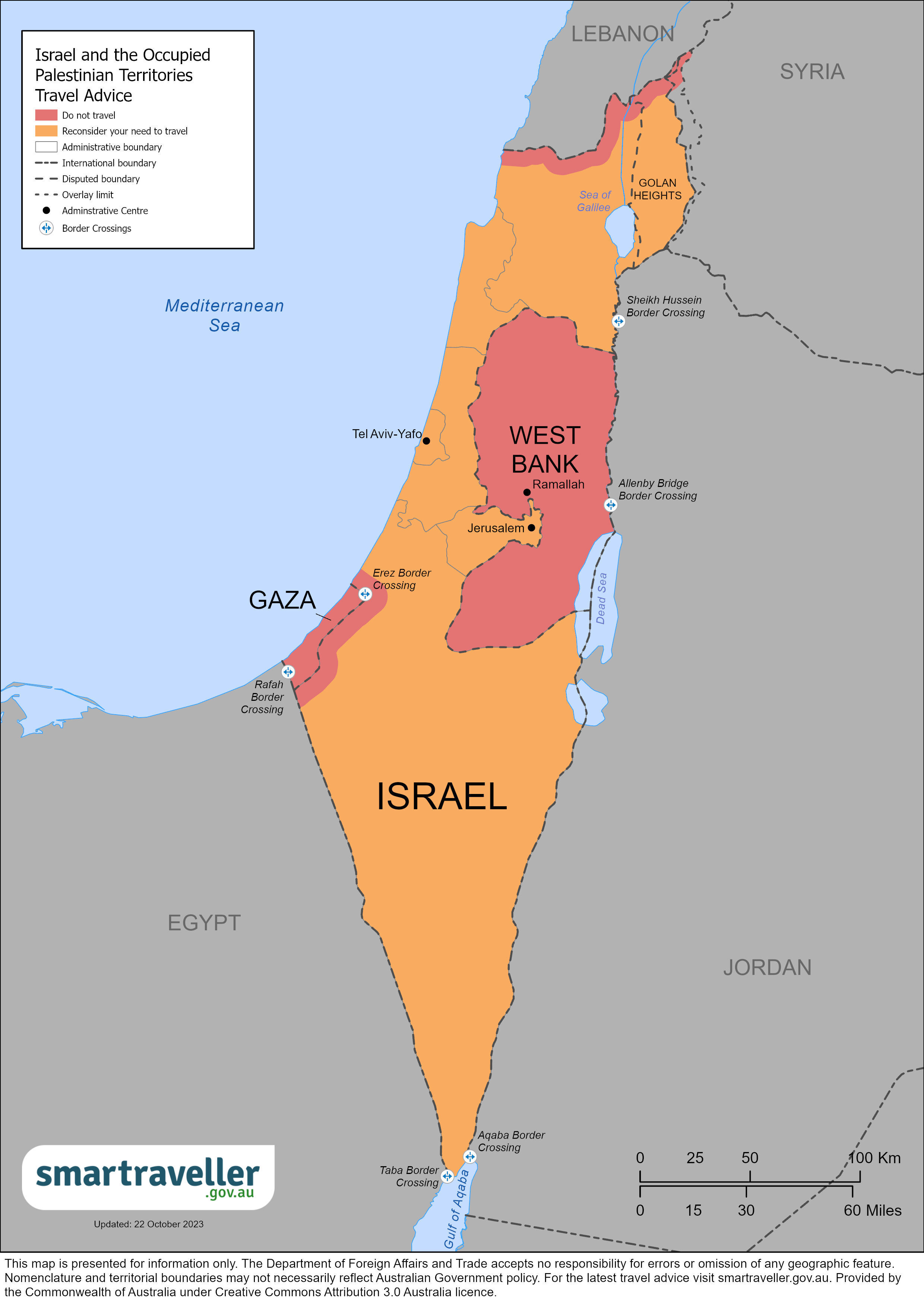
Israel and the Occupied Palestinian Territories (PDF 596.05 KB)
The Middle East (PDF 1.45 MB)
Local emergency contacts
Fire and rescue services, medical emergencies.
For criminal issues, call 100.
Advice levels
Reconsider your need to travel to Israel and the Occupied Palestinian Territories overall.
Reconsider your need to travel to Israel and the Occupied Palestinian Territories overall due to the volatile security situation, including the threat of terrorism, armed conflict and civil unrest.
See Safety .
Do not travel to Gaza and areas near the border with Gaza.
Do not travel to Gaza and areas near the border with Gaza due to armed conflict.
Do not travel to border areas with Lebanon.
Do not travel to border areas with Lebanon closed by Israeli authorities.
Do not travel to the West Bank (excluding East Jerusalem).
Do not travel to the West Bank (excluding East Jerusalem) due to the volatile security situation.
- Israel has a naval blockade in place along the coast of Gaza. Don't join others seeking to break the blockade. Previous attempts to break the blockade have resulted in death, injury, arrest or deportation of foreigners (see 'Full advice').
- Our overall travel advice level for Israel and the Occupied Palestinian Territories remains at reconsider your need to travel, with higher levels applied to some areas. You should also consider whether you need to remain in country, and if not, depart when its safe to do so.
- Do not travel to Gaza, border areas with Gaza, border areas with Lebanon closed by Israeli authorities and the West Bank (excluding East Jerusalem), due to the volatile security situation.
- There’s a high threat of military reprisals and terrorist attacks against Israel and Israeli interests across the region. Military attacks may result in airspace closures, flight cancellations and diversions and other travel disruptions. Tel Aviv's Ben Gurion International Airport may pause operations due to heightened security concerns at any time. GPS signals may be blocked in parts of Israel, which may result in flight disruptions. Australians who want to leave are encouraged to take the first available option.
- Land border crossings to Jordan are open but may close at short notice.
- In an attack or other armed conflict, you should follow the advice of local authorities. See our general advice on protecting your safety: There’s an armed conflict , and monitor local media and public safety information updates through the National Emergency Portal (accessible in Israel only).
- If you're an Australian citizen or permanent resident in Israel or the Occupied Palestinian Territories you can register on DFAT's registration portal . Keep your registration details up to date so we can contact you with important updates.
- Since 7 October, Israeli Defense Forces have been conducting major operations, including in and around Gaza and areas near the northern border with Lebanon.
- Israel is a target for terrorism, rocket fire and military confrontation. Terrorist attacks could happen at any time or anywhere. Always be alert. Have an exit plan. There are tensions and security risks close to Israel's borders with Lebanon, Syria and Egypt. There are ongoing threats of rocket attacks and military activity. Authorities are monitoring security on Israel’s northern border.
- Security in the West Bank is unpredictable. This includes Nablus, Jenin, Bethlehem, Hebron, Jericho and Ramallah. Tensions are high. Violence occurs. Take care around West Bank checkpoints. If you're in the West Bank during military action or civil unrest, stay in a safe place indoors and away from windows. Take care when visiting the Old City in Jerusalem. Transportation and other services could be affected. Be alert to your surroundings and have an exit plan. Monitor media for the latest updates.
- Our ability to provide consular help in Gaza is extremely limited. If you're in Gaza, be aware of your surroundings and review your personal security plans. Monitor local media (including social media), UN alerts, and your own organisation's security contacts for information about changing security conditions and alerts to seek shelter. If it's possible to leave, carefully consider the safest means.
The Rafah crossing between Gaza and Egypt may be closed or have highly restricted access for long periods and is subject to change at short notice. It has been subject to air strikes during the current Gaza conflict.
Full travel advice: Safety
- Infectious diseases are a risk. Drink boiled or bottled water.
- West Nile virus can occur. There's no vaccine to prevent it. Use insect repellent. Make sure your accommodation is insect-proof.
- The standard of medical facilities in Israel is reasonable. Facilities in the West Bank and Gaza are limited and if you become seriously ill or injured, you may need to seek evacuation. Make sure your travel insurance covers this.
Full travel advice: Health
- The Sabbath in Israel happens from sunset Friday until sunset Saturday. In Orthodox neighbourhoods, driving or using a mobile phone or digital camera on the Sabbath may offend people.
- Don't use or carry illegal drugs. Penalties are severe.
- You must always carry originals or copies of your passport, visa or entry permit in the Occupied Palestinian Territories.
- Palestinian law has the death penalty for some crimes including treason, helping an enemy and murder.
- Gaza has Islamic law. Drinking alcohol and homosexual acts are illegal. Take care not to offend in Gaza and the West Bank. Avoid public displays of affection. Dress conservatively.
Full travel advice: Local laws
- Tel Aviv's Ben Gurion International Airport remains open and commercial flights are available. The airport may pause operations due to heightened security concerns. This may cause flight delays or cancellations. Check with your airline for the latest updates before travelling. GPS signals may be blocked in parts of Israel. This can cause disruption to navigational apps and devices.
- Land border crossings to Jordan are open but may close at short notice. See Full advice: Travel for more information on border crossings into Jordan. Check Israeli government websites, and the website of the country of planned travel to make sure border crossings are open before travel.
- The Rafah crossing between Gaza and Egypt may be closed or have highly restricted access for long periods and is subject to change at short notice. It has been subject to attacks, including air strikes, during the current Gaza conflict.
- By law, you're considered Israeli if one or both of your parents are Israeli. Israeli citizens must enter and leave on an Israeli passport. Authorities will consider you a Palestinian national if you currently hold, or used to hold, a Palestinian ID card. You may need to get a Palestinian travel document.
Full travel advice: Travel
Local contacts
- The Consular Services Charter details what we can and can't do to help you overseas.
- For consular help, contact the Australian Embassy in Tel Aviv or the Australian Representative Office in Ramallah .
- To stay up to date with local information, follow the Embassy's social media accounts.
Full travel advice: Local contacts
Full advice
Crisis registration.
If you're an Australian citizen or permanent resident in Israel or the Occupied Palestinian Territories, you can register on DFAT's registration portal . We'll be contacting registered Australians directly with important updates.
Keep your registration details up to date so we can contact you. If you registered by phone or e-mail, you'll need to update your details via those channels.
You should only register if you’re in Israel or the Occupied Palestinian Territories and are:
- an Australian citizen, or
- an Australian permanent resident, or
- an immediate family member of an Australian citizen or permanent resident
CLICK HERE TO REGISTER
Security situation
Waters off gaza.
Israel has a naval blockade in place. The Israeli Navy patrols territorial waters and the shared water border zone.
We advise Australians to reconsider participating in any humanitarian flotilla to deliver aid to Gaza. Don't join others seeking to break the naval blockade.
People have previously tried to break the naval blockade along the coast of Gaza. Their actions caused injury, death, arrest and deportation of foreigners, including Australians.
Overall security situation
We continue to advise reconsider your need to travel to Israel and the Occupied Palestinian Territories overall due to the volatile security situation, including the threat of terrorism, armed conflict and civil unrest. Rockets have been fired at Israel from Gaza, Lebanon and Syria. There have also been other terror attacks on civilians. The Israeli government has declared a state of emergency across the whole country. Avoid all non-essential travel and reconsider your need to remain in the area.
We continue to advise do not travel to Gaza, border areas with Gaza and border areas with Lebanon closed by Israeli authorities.
We also advise do not travel to the West Bank (excluding East Jerusalem) due to the volatile security situation.
Military attacks may result in airspace closures, flight cancellations and diversions and other travel disruptions. Tel Aviv's Ben Gurion International Airport may pause operations due to heightened security concerns at any time, and at short notice. This may cause flight delays or cancellations. GPS signals may be blocked in parts of Israel. This can disrupt navigational apps and devices and affect flights. Check with your airline or travel provider for the latest updates before travelling.
If you choose not to leave or can't safely leave, be prepared for an extended stay. Ensure you maintain enough supplies including food, drinking water and medication. If you're planning to stay in Israel or the Occupied Palestinian Territories, follow alerts to seek shelter. Monitor local media and public safety information updates through the National Emergency Portal (accessible in Israel only).
If you need emergency consular assistance, contact the Australian Government's Consular Emergency Centre on +61 2 6261 3305 (if you're overseas) or 1300 555 135 (in Australia). Our ability to provide consular assistance in Gaza is limited.
Gaza unrest
Gaza is an active conflict zone and is extremely dangerous. There are ongoing Israeli air strikes and land based IDF operations as well as a threat of civil unrest, shooting and rocket attacks. Rockets can land in both Gaza and Israel.
Our ability to provide consular assistance in Gaza is extremely limited. If you're in Gaza, be aware of your surroundings and review your personal security plans. Monitor local media (including social media), UN alerts, and your own organisation's security contacts for information about changing security conditions and alerts to seek shelter.
If you're stuck in military action or civil unrest, stay in a safe place indoors. Monitor the media for updates.
Ordinarily, the Australian Government can't support individuals applying for entry or exit permits for Gaza. During the current crisis, our ability to support Australians and their families to leave is extremely limited.
Military operations
During military operations, the Israeli Defense Forces (IDF) may declare an area a closed military zone.
If authorities find civilians in this zone, they can arrest, detain or deport them.
In Israel, local city government websites have lists of public bomb shelters and other emergency information.
The IDF Home Front Command is responsible for managing emergencies, including planning and advising on how to deal with rocket attacks. In an emergency contact the Home Front Command on 104 (the hotline has English-speaking operators, option 5). Authorities may also establish a National Emergency Portal website for specific events.
We advise do not travel to the West Bank (excluding East Jerusalem) due to the volatile security situation.
The security situation in the West Bank is unpredictable, with continuing tensions and violence between Israelis and Palestinians. This includes tourist destinations such as Bethlehem, Jericho and Ramallah. There can be higher rates of violence in and around Hebron, Jenin and Nablus.
Stone-throwing and violence are common, especially around Israeli settlements and military checkpoints.
Tensions can arise at short notice. Violence can happen in tourist areas.
Don’t enter closed military zones, even where these have been in place for a long time, such as the old city of Hebron.
Large and sometimes violent demonstrations have occurred in the West Bank. Foreigners have been injured.
Israeli authorities may open temporary additional checkpoints in the West Bank or close crossings to the West Bank on local holidays or due to security incidents.
Israeli security/military operations occur in the West Bank. There has been an increase in Israeli security operations since March 2022, including intensive operations in refugee camps. If you’re in the West Bank during military action or civil unrest, stay in a safe place indoors, away from windows. Monitor the media for information.
Authorities impose strict security measures after terrorist attacks. These may severely affect the movement of Palestinians, including Australian dual nationals.
Israel's borders with neighbouring states
Cross-border political tensions and unrest create security risks for regions of Israel close to its borders with Egypt, Lebanon and Syria.
Israel and Lebanon border
We advise do not travel to border areas with Lebanon. These have been closed by Israeli authorities. Authorities are monitoring security on Israel’s northern border. Some residents have been advised to evacuate by local authorities.
There’s an ongoing threat of rocket attack, infiltration attempts, revenge fire and other activity along the border between Israel and Lebanon. This area is known as the ‘Blue Line’.
There’s a significant military presence in the area. The security situation could get worse without notice.
Tensions remain high between Hezbollah and Israel, with occasional exchanges of fire on the border between Lebanon and Israel. More conflict is possible, including missiles fired towards Israeli territory. An escalation in conflict between Israel and Hezbollah would significantly increase risks to your safety and security.
More information:
- Travel advice for Lebanon
Israel and Egypt border
There have been security incidents in the southern city of Eilat and the surrounding area near the Gulf of Aqaba. This includes the border crossing with Egypt near Eilat. There have been deaths and injuries.
- Travel advice for Egypt
Israel and Syria border
There’s been ongoing conflict on the Syrian side of the border since 2014. Clashes have occurred on the Israeli-Syrian border. This includes rockets being fired towards Israeli-controlled territory. Kidnapping has been known to happen near the border.
Parts of Route 98 have been closed in the past due to fighting on the Syrian side of the border. Artillery and small-arms fire from Syria could land in the Israeli-controlled Golan Heights.
The situation remains tense and further violence is possible. We recommend avoiding all parts of the Golan Heights to the east of Route 98 due to militant activities in Syria.
- Travel advice for Syria
Keeping safe during unrest
To stay safe during civil unrest, avoid demonstrations, political rallies and large public gatherings.
Check the news and other sources for information on unrest or strikes. Plan your activities to stay away from those areas.
Be extra careful during Jewish and Muslim religious holidays. These include Rosh Hashana, Yom Kippur, Sukkot, Pesach and Ramadan.
Stay away from traffic congestion at checkpoints.
In each place you stay, know the emergency procedures. Know what to do when air raid sirens sound and where the closest emergency shelters are.
If you’re caught in military action or civil unrest, follow the instructions of local authorities
Unless told otherwise, stay indoors and monitor the media.
Be prepared to change your travel plans.
If civil unrest affects transport services, contact your airline, travel agent or insurer for help.
Civil unrest and political tension
Demonstrations and protests.
Public protests and events that draw large groups of people can turn violent. Don’t go near demonstrations or large gatherings.
Check the media and other sources for information about planned and possible unrest.
Demonstrations could happen anywhere. They’re most likely in and around checkpoints, to/from the West Bank and in and around the Old City in Jerusalem.
Violence can happen at checkpoints, and there are few options to leave the area.
Avoid traffic blockages at checkpoints.
There are regular attacks on vehicles driven on the Sabbath. This happens in and around ultra-Orthodox neighbourhoods. See ‘Local laws’.
Increased tensions can occur around religious and commemoration events and following political developments, particularly in and around the Old City in Jerusalem. Tensions have resulted in demonstrations and violence in some cities. There have also been rockets fired at targets across Israel and Gaza.
There's a chance of civil unrest in the Occupied Palestinian Territories. International events and political developments may lead to protests and demonstrations, which can be unpredictable and may turn violent. Be alert, avoid demonstrations, follow the advice of local authorities and monitor the media for the latest updates.
- Demonstrations and civil unrest
Israel continues to be a target of terrorist attacks.
Local and international political developments and events may lead to terrorist attacks.
Attacks could happen anywhere, at any time.
Terrorists have attacked buses, public transport hubs and tourist areas. These include in Jerusalem, Jaffa and Tel Aviv. Attacks have included shootings, stabbings, vehicle ramming and bombings.
Be alert to possible threats, especially:
- at tourist locations, religious sites and crowded public places
- near police checkpoints
- in regions bordering Egypt, Syria and Lebanon
Australian Government officials are advised to use public transport services in Israel and the West Bank which do security screening of passengers and luggage. This is because of safety and security concerns and does not apply to taxis.
Militant and terror groups operate in regions of Egypt, Syria and Lebanon that are close to Israel. This makes travel close to borders with those countries dangerous.
When planning your activities reconsider going to places known to be terrorist targets. Think about the level of security provided.
Take care when travelling to a region where there are terrorists, or somewhere that terrorists could target. Have an exit plan in case there's a security incident.
To stay safe:
- consider avoiding public transport other than taxis
- report any suspicious activity or items to police
- regularly check local and international media for news about any new or emerging threats
- take official warnings seriously
- follow the advice of local authorities
If there's an attack, leave the area as soon as it's safe.
Terrorism is a threat worldwide.
- Egypt travel advice
- Lebanon travel advice
- Syria travel advice
Foreigners have been kidnapped in Israel and the Occupied Palestinian Territories. Always be alert to your personal security and surroundings, particularly in the Gaza area. The Australian Government's longstanding policy is that it doesn't make payments or concessions to kidnappers.
Violent crime, other than terrorism and politically motivated violence, is rare.
Purse snatching, pickpocketing and petty theft can happen.
Theft from vehicles may happen, especially in beachside areas.
Cyber security
You may be at risk of cyber-based threats during overseas travel to any country. Digital identity theft is a growing concern. Your devices and personal data can be compromised, especially if you’re connecting to Wi-Fi, using or connecting to shared or public computers, or to Bluetooth.
Social media can also be risky in destinations where there are social or political tensions, or laws that may seem unreasonable by Australian standards. Travellers have been arrested for things they have said on social media. Don't comment on local or political events on your social media.
Cyber security when travelling overseas
Tours and adventure activities
Transport and tour operators don't always follow safety and maintenance standards. This includes adventure activities.
If you plan to do a tour or adventure activity :
- check if it's covered by your travel insurance policy
- ask about, and insist on minimum safety requirements
- always use available safety gear, such as life jackets or seatbelts
If proper safety equipment isn't available, use another provider.
Climate and natural disasters
Israel, the West Bank and Gaza are in an active earthquake zone.
Flash floods can happen in the Judean Hills and Negev desert in the winter months from November to March.
Sandstorms, dust storms and bushfires happen during the warmer months.
If there's a natural disaster or severe weather :
- secure your passport in a safe location
- stay in contact with friends and family
- monitor local media and the Global Disaster Alert and Coordination System
Travel Insurance
Get comprehensive travel insurance before you leave. Healthcare in Israel is not free.
Your policy needs to cover all overseas medical costs, including medical evacuation. The Australian Government won't pay for these costs.
If you're going to high-risk areas, you'll probably need a specialised insurance policy. Check your insurance policy before you travel to high-risk areas in Israel, Gaza and the West Bank.
If you can't afford travel insurance, you can't afford to travel. This applies to everyone, no matter how healthy and fit you are.
If you're not insured, you may have to pay many thousands of dollars up-front for medical care.
- what activities and medical care are covered by your policy
- that your insurance covers you for the whole time you'll be away
Physical and mental health
Consider your physical and mental health before you travel, especially if you have an existing medical condition.
See your doctor or travel clinic to:
- have a basic health check-up
- ask if your travel plans may affect your health
- plan any vaccinations you need
Do this at least 8 weeks before you leave.
If you have immediate concerns for your welfare, or the welfare of another Australian, call the 24-hour Consular Emergency Centre on +61 2 6261 3305 or contact your nearest Australian Embassy, High Commission or Consulate to discuss counselling hotlines and services available in your location.
- General health advice
- Healthy holiday tips (Healthdirect Australia)
Not all medication available over the counter or by prescription in Australia is available in other countries. Some may even be considered illegal or a controlled substance, even if prescribed by an Australian doctor.
If you plan to bring medication, check if it's legal in Israel, Gaza and the West Bank. Take enough legal medicine for your trip.
Carry a copy of your prescription or a letter from your doctor stating:
- what the medication is
- your required dosage
- that it's for personal use
Health risks
Infectious diseases
Waterborne, foodborne and other infectious diseases can occur. These include:
- Brucellosis
- Leptospirosis
- Leishmaniasis
- COVID-19
Serious outbreaks sometimes occur.
To protect yourself from illness:
- drink boiled water or bottled water with sealed lids
- avoid ice cubes
- avoid uncooked and undercooked food, such as salads
Get medical advice if you have a fever or diarrhoea.
Insect-borne diseases
Cases of West Nile virus (WNV) cases are reported throughout Israel, Gaza and the West Bank. There's no vaccine to prevent it.
To protect yourself against illness:
- make sure your accommodation is insect-proof
- use insect repellent
- wear long, loose, light-coloured clothing
Polio is a risk in Israel. Before you travel, ensure your vaccinations are up-to-date, including booster doses.
- Polio (World Health Organisation)
Measles can occur routinely in Israel. Make sure your vaccinations are up-to-date before you travel.
- Measles immunisation service (Department of Health and Aged Care)
Medical care
Medical facilities.
The standard of medical facilities is reasonable in Israel. However, facilities in the West Bank and Gaza are below Australian standards.
If you become seriously ill or injured in the West Bank or Gaza, you may need to be evacuated. Where medical evacuation is possible, it can be very expensive.
Doctors may require up-front payment before they will treat you. Costs can be high.
You're subject to all local laws and penalties, including those that may appear harsh by Australian standards. Research local laws before travelling.
If you're arrested or jailed, the Australian Government will do what it can to help you under our Consular Services Charter . But we can't get you out of trouble or out of jail.
Penalties for drug offences include jail terms of up to 20 years and large fines.
Carrying or using drugs
You must always carry your passport, visa or entry permit as proof of identity in the Occupied Palestinian Territories.
It's illegal to photograph police, the military, buildings or places considered 'security sensitive'. This includes military installations and some government offices. If in doubt, get local advice.
The import and use of religious material is strictly controlled. If authorities find this material, they may confiscate it.
Under Palestinian law, authorities may enforce the death penalty for treason, helping an enemy and deliberate killing.
Islamic law applies in Gaza. Drinking alcohol and homosexual acts are prohibited.
- LGBTQIA+ travellers
Australian laws
Some Australian criminal laws still apply when you're overseas. If you break these laws, you may face prosecution in Australia.
Staying within the law and respecting customs
Dual citizenship
Israel doesn't recognise dual nationality. Israeli citizens must enter and leave on an Israeli passport.
Under Israeli law, you're considered Israeli if at least one of your parents is Israeli.
Men and women may need to do military service. To check, consult the nearest embassy or consulate of Israel before you travel.
Australians who currently hold, or used to hold a Palestinian ID card, are considered Palestinian nationals while in the West Bank, Gaza or Israel.
If you're considered Palestinian, you may need to get a Palestinian travel document. Contact an embassy or consulate of Israel for details about entry and exit requirements.
This law limits the consular services we can give if you're arrested or detained.
- Dual nationals
- Embassy of Israel in Australia
Local customs
Get to know local and religious customs. Take care not to offend.
Public displays of affection aren't appropriate at religious sites in Israel. In Gaza and the West Bank, being affectionate in public may offend.
Observe local standards of behaviour when visiting Orthodox Jewish neighbourhoods.
Dress standards
Conservative standards of dress and behaviour apply at holy sites in Jerusalem, Orthodox Jewish areas in Israel and throughout Gaza and the West Bank.
Be respectful when photographing people in Muslim and Orthodox Jewish areas. Ask permission before taking photos of people.
The Jewish Shabbat or Sabbath happens from sunset Friday until sunset Saturday. It's closely observed in Orthodox Jewish areas in Israel.
During this time of rest in Orthodox neighbourhoods, driving and using electricity is restricted. Using a mobile phone or camera on the Sabbath is likely to offend.
Public access to these neighbourhoods is usually restricted on the Sabbath. Don't drive in these areas.
Respect religious and cultural customs and laws during Ramadan . Avoid eating, drinking or smoking in public or in front of people who are fasting.
LGBTQIA+ information
Unmarried and same-sex couples are not allowed to live together in Gaza or the West Bank. They're not allowed to share hotel accommodation either.
Advice for LGBTQIA+ travellers
Flight and road routes out of Israel
If you choose to leave, make sure you know where your identity documents are, including your passport, and be ready to leave at short notice. Also make sure you have any medications you may need while travelling.
Australians who want to leave are strongly encouraged to take the first available commercial option.
Tel Aviv's Ben Gurion International Airport remains open and commercial flights are available. However, the airport may pause operations due to heightened security concerns. This may cause flight delays or cancellations. Check with your airline for the latest updates before travelling.
Land border crossings
Land border crossings to Jordan are open but may close at short notice. Check Israeli government websites , and public information of the country of planned travel to make sure border crossings are open before travel.
There are 3 land border crossings between Israel and Jordan: Allenby Bridge/King Hussein near Amman, Sheikh Hussein/Jordan River near Irbid, and Wadi Araba near Aqaba.
These border crossings may open and close with little notice. There is also the possibility of queues and delays at border crossings.
Visas are required to enter Jordan. See our travel advice for Jordan .
You may find it difficult to travel by road if armed conflict escalates. GPS signals may be blocked in parts of Israel, disrupting navigational apps.
Any travel options you pursue are taken at your own risk. You're responsible for your own safety and that of your family.
For information on border crossings from Gaza, see 'Gaza' section below.
- Land border crossings (Israel Government)
The security situation in Gaza is unpredictable and dangerous.
Exiting Gaza is extremely difficult and unpredictable.
There are only 2 land crossings for pedestrians into and out of Gaza. Israel controls Erez. Egypt controls Rafah.
You may not be able to leave Gaza even if you have a valid exit permit.
The ability of the Australian Government to help is extremely limited.
Erez crossing
Israeli authorities control the Erez crossing into northern Gaza from Israel. The crossing has been closed since the current crisis began on 7 October 2023.
Rafah crossing
Egyptian authorities control the Rafah crossing into Gaza from Egypt.
You must get permission from Egyptian authorities to enter and exit Gaza using the Rafah border crossing with Egypt.
Regulations and restrictions around the border between Egypt and Gaza can change.
People who enter Gaza through this border crossing must leave the same way.
The crossing may open or close at short notice. Once it has closed, you can't leave Gaza through this crossing.
Visas and border measures
Every country or territory decides who can enter or leave through its borders. For specific information about the evidence you'll need to enter a foreign destination, check with the nearest embassy, consulate or immigration department of the destination you're entering.
If you travel to Israel as a tourist for less than 3 months, most Australians won't need a visa.
For longer stays, you'll need to arrange a visa before you travel.
Israel requires some Australians to apply for and secure entry permits before travelling. Australian passport holders born in certain overseas locations must apply for an entry permit through a contact in Israel. Travellers should check with the nearest Israeli embassy or consulate about whether this policy relates to their country of birth and, if so, what steps they may need to take to secure an entry permit. This process can take some time and should be done well before you travel. Failing to obtain an entry permit may result in a refusal of entry by Israeli border authorities.
On 20 October 2022, new requirements were introduced for foreign nationals entering and residing in the West Bank. Further information and contact details for enquiries can be found on the Israeli government website .
Entry and exit conditions can change at short notice. For details about visas, security checks, currency, customs and quarantine regulations:
- check the Israel Government Portal
- contact the nearest embassy or consulate of Israel
Border measures
Non-Israeli citizens, regardless of vaccination status, can enter Israel if all entry requirements as listed on the Israel Ministry of Heath’s website are met.
Other formalities
Israeli authorities can subject you to a security and police record check if you're entering Israel, Gaza or the West Bank.
Authorities may refuse you entry or exit without a reason.
Security officials may question you at length. They may also conduct an intensive search of your bags and person when you arrive and depart.
If you're travelling to protest against Israeli policies, authorities may refuse your entry. You will be returned to the country where you boarded. This includes if you arrive by boat.
Authorities can deny you entry if you have association with, or belong to, an organisation that has called for a boycott of Israel or Israeli settlements.
We can't intervene if you don't meet entry or exit requirements.
You'll get an entry card instead of an entry stamp on arrival in Israel.
Keep this card with your passport until you leave. The card is evidence of your legal entry into Israel. Authorities may ask for it during your stay.
If you plan to travel to other countries after Israel, read the travel advice for each country. Some countries may refuse you entry if:
- your passport shows you have travelled to Israel
- your luggage or possessions show you've been to Israel
Travel restrictions
Travel restrictions may apply to some visitors in Israel and the West Bank. There's no clear information about who may be restricted.
Airport officials may ask you to sign a form that stops you entering the West Bank.
In these situations, the Australian Embassy has limited ability to step in.
Some countries won't let you enter unless your passport is valid for 6 months after you plan to leave that country. This can apply even if you're just transiting or stopping over.
Some foreign governments and airlines apply the rule inconsistently. Travellers can receive conflicting advice from different sources.
You can end up stranded if your passport is not valid for more than 6 months.
The Australian Government does not set these rules. Check your passport's expiry date before you travel. If you're not sure it'll be valid for long enough, consider getting a new passport .
Lost or stolen passport
Your passport is a valuable document. It's attractive to people who may try to use your identity to commit crimes.
Some people may try to trick you into giving them your passport. Always keep it in a safe place.
If your passport is lost or stolen, tell the Australian Government as soon as possible:
- In Australia, contact the Australian Passport Information Service .
- If you're overseas, contact the nearest Australian embassy or consulate .
Passport with 'X' gender identifier
Although Australian passports comply with international standards for sex and gender, we can’t guarantee that a passport showing 'X' in the sex field will be accepted for entry or transit by another country. Contact the nearest embassy, high commission or consulate of your destination before you arrive at the border to confirm if authorities will accept passports with 'X' gender markers.
Israel's currency is the Israeli Shekel (ILS). The ILS is also used in the Occupied Palestinian Territories.
You can change Australian dollars to shekels in major centres.
ATMs are widely available.
When arriving or leaving Israel, you must declare amounts of $US10,000 or more, or the equivalent in another currency. This covers all forms of currency, not only cash.
If you don't declare your currency on entry or exit from Israel, authorities could arrest or fine you.
Local travel
When deciding on travel around Israel, the West Bank and Gaza, consider the general security situation.
Also consider specific risks to your safety and security in different places.
Driving permit
You can drive in Israel for up to one year with a valid Australian driver's licence.
Road travel
Land border crossings may be closed with short notice, and for an unknown period. Check Israeli government websites, and the website of the country you are trying to travel to, to determine if border crossings are open before travel.
Security checkpoints may be set up or closed at any time. This often happens without warning throughout Israel, Gaza and the West Bank.
You could face delays or trouble passing through checkpoints.
- Land border crossings (Israel Government)
Driving can be dangerous.
GPS signals may be blocked in parts of Israel, disrupting navigational apps.
Hazards include:
- Aggressive drivers who ignore road rules
- Drivers driving while distracted
- Poor road conditions in some parts of the country
Road accidents occur often.
Israeli car insurance does not usually cover travel into Palestinian-controlled areas of the West Bank. This includes Bethlehem, Jericho and Ramallah.
Separate insurance can be arranged for travel to these places.
Driving or riding
Motorcycles
Check if your travel insurance policy covers you when travelling by motorbike.
Only ride a motorcycle if you're:
- properly licensed
- familiar and comfortable with local driving conditions
By law, you and your passenger must wear a helmet when riding a motorbike.
Taxis are generally safe and reliable in Israel.
Public transport
Take care when using public transport .
Due to safety and security concerns, Australian Government officials and their families are advised to use public transport services in Israel and the West Bank that include security screening of passengers and luggage. This does not apply to taxis.
Don't travel by sea to the coast of Gaza. See Safety
DFAT doesn't provide information on the safety of individual commercial airlines or flight paths.
Check Israel's air safety profile with the Aviation Safety Network.
Emergencies
Depending on what you need, contact your:
- family and friends
- travel agent
- insurance provider
Always get a police report when you report a crime.
Your insurer should have a 24-hour emergency number.
Consular contacts
Read the Consular Services Charter for what the Australian Government can and can't do to help you overseas.
For consular assistance, contact:
Australian Embassy, Tel Aviv
Level 28 Discount Bank Tower 23 Yehuda Halevi Street (corner Herzl Street) Tel Aviv 65136, Israel
Phone: +972 3 693 5000 Fax: +972 3 693 5002 Website: israel.embassy.gov.au Facebook: Australia in Israel X: AusAmbIsrael
Check the Embassy website for details about opening hours and any temporary closures.
Australian Representative Office, Ramallah
7th floor, Trust Building 48 Othman Ben Affan Street El Bireh Ramallah West Bank
Phone: +972 2 242 5301 Fax: +972 2 242 8290 Website: ramallah.mission.gov.au
Check the Australian Representative Office website for opening hours.
24-hour Consular Emergency Centre
In a consular emergency, if you can't contact an embassy, call the 24-hour Consular Emergency Centre on:
- +61 2 6261 3305 from overseas
- 1300 555 135 in Australia

Travelling to Israel, Gaza and the West Bank?
- Skip to main content
- Skip to "About this site"
Language selection
Search travel.gc.ca.
Help us to improve our website. Take our survey !
COVID-19: travel health notice for all travellers
Israel, the West Bank and the Gaza Strip travel advice
Latest updates: Entry and exit requirements – added information on the ETA-IL
Last updated: June 6, 2024 06:38 ET
On this page
Safety and security, entry and exit requirements, laws and culture, natural disasters and climate, israel - avoid non-essential travel.
Avoid non-essential travel to Israel due to the ongoing regional armed conflict and the unpredictable security situation..
West Bank - AVOID ALL TRAVEL
This advisory excludes the following areas where you should avoid non-essential travel:
- Route 90, from the intersection with highway 1 to King Hussein Bridge (Allenby), near Jericho
- Route 443 between Jerusalem and Modi’in
Gaza Strip - AVOID ALL TRAVEL
Israel has expanded ground operations in the Gaza Strip.
If you are in the Gaza Strip, shelter in a secure place until it’s safe for you to leave. We understand that there are connectivity problems in the Gaza Strip. If possible, try to register or update your personal information through the Registration of Canadians Abroad service to receive the latest information about departure options. If you are unable to do so, try to contact Global Affairs Canada’s 24/7 Emergency Watch and Response Centre .
The Government of Canada’s ability to provide consular services in the Gaza Strip is severely limited.
Jerusalem - Avoid non-essential travel
Avoid non-essential travel to Jerusalem due to the volatile security situation.
Border with Syria - Avoid all travel
This advisory excludes the following cities where you should exercise a high degree of caution:
- Buq’ata
- Majdal Shams
- Mas’ada
Border with Egypt - Avoid all travel
Avoid all travel to within 5 km of the border with Egypt due to the volatile security situation.
Border with Lebanon - Avoid all travel
Avoid all travel to to the area within 5 kilometres of the border with Lebanon due to ongoing military operations.
Border with the Gaza Strip - Avoid all travel
Avoid all travel to within 5km of the border with the Gaza Strip due to the risk of rocket and mortar fire, gunfire and military activity.
Back to top
Heightened risk of attacks on Israeli territory
Following recent developments in the region, there is a heightened risk of attacks on Israeli territory. The regional security situation remains highly volatile and could escalate escalate at any time.
Drone, rocket and missile attacks occur regularly between Israel and armed groups in neighboring countries such as Iraq, Syria, Lebanon and Yemen.
On April 13, 2024, Iran launched a drone and missile attack on Israeli territory, contributing to a significant escalation of tensions in the region.
These attacks can lead to air transportation disruptions due to sudden and prolonged airspace closures. Military interceptions can also cause collateral damage.
If you are in Israel or the West Bank:
- monitor local and international media to stay informed of the rapidly evolving situation
- identify the location of the closest bomb shelter, if available
- if there are no bomb shelters nearby, shelter in a hardened structure away from windows when air raid warning sirens are active
- follow the advice of local authorities, including air-raid sirens and evacuation orders
Ongoing hostilities in Israel and the Gaza Strip
The security situation remains volatile and unpredictable in Israel and the Gaza Strip as hostilities persist between Israel’s military and Gaza-based terrorist groups.
Israeli ground operations and air strikes are expected to continue throughout the Gaza Strip. Missiles and rockets continue to be fired from Gaza towards central and southern Israel.
Military operations in the Gaza Strip pose a risk to civilians, even where they take shelter. Damage to infrastructure has affected communication networks in the Gaza Strip, including the internet.
Violent clashes persist along the border between Israel and Lebanon, including daily rocket and missile fire as well as air strikes. You should avoid all travel within 5 kilometres of the border with Lebanon.
Tensions and violence in the West Bank
Tensions and violence are high in the West Bank. Frequent military operations throughout the West Bank can lead to casualties, including bystanders, and can result in clashes between Israeli security forces and Palestinians, as well as retaliatory attacks.
Extremist Israeli settler violence occurs frequently. There are reports of civilians being attacked, forced under threat to leave their houses or evacuate specific areas. Individuals of Palestinian or Arab descent may be subject to increased scrutiny, detention, and arrest. Israeli checkpoints have increased in number throughout the West Bank. Personal electronic devices may be searched at Israeli military checkpoints, including flying checkpoints. You, your friends, and your family members could face detention, arrest, and/or the suspension or withdrawal of your official permits if you share information deemed to be inaccurate and sensitive by Israel. This includes content shared on social media. Refrain from discussing political views online and be conscious of local laws related to internet use.
If you're in or near an affected area in Israel, the West Bank, or the Gaza Strip:
- assess if you are currently in a safe location
- shelter in place if you can’t leave the area safely
- limit your movements
- remain extremely cautious
- monitor local and international media to get the latest information
- try to keep your phone charged
- follow the instructions of local authorities
Canada’s response to the crisis in Israel, the West Bank and the Gaza Strip
Assisted departure options
Canada continues to offer assistance to Canadian citizens, permanent residents and eligible family members in Gaza.
Canadian citizens and permanent residents, and their eligible family members, currently in Gaza and wishing to leave should contact Global Affairs Canada’s 24/7 Emergency Watch and Response Centre .
Canadian officials put forward names of Canadians and permanent residents, as well as their eligible family members, to the responsible authorities for approval to exit the Gaza Strip through the Rafah border crossing. Global Affairs Canada will contact individual Canadians and permanent residents, as well as their eligible family members, when their request to leave has been approved. Global Affairs Canada does not ultimately decide who can leave Gaza.
If you are seeking to leave the Gaza Strip:
- Keep your travel documents and personal belongings with you at all times
- Be ready to travel to the border crossing on short notice
The situation at the Rafah border crossing remains unpredictable. You should assess the safety risks for you and your family members before travelling.
Due to infrastructure damage, there could be connectivity problems in the Gaza Strip. If possible, try to register or update your personal information through the Registration of Canadians Abroad service to receive the latest information about departure options. If you are unable to do so, try to contact Global Affairs Canada’s 24/7 Emergency Watch and Response Centre .
If you're a family member of a Canadian citizen or of a permanent resident who is currently in Gaza, the West Bank or Israel and is unable to register through the Registration of Canadians Abroad service , please contact Global Affairs Canada’s 24/7 Emergency Watch and Response Centre .
Border operations
Due to recent events in Israel, West Bank and the Gaza Strip, operations at all land borders may be affected by limited authorized daily crossings, reduced hours or closure on short notice. Israeli authorities may also unexpectedly close checkpoints in the West Bank.
You should verify the status of the border crossings before you travel, if you’re planning to cross the following borders:
- Israel/Jordan
- Israel/Egypt
- West Bank/Jordan
- Gaza Strip/Egypt
Naval blockade
The security situation along the Mediterranean coast of the Gaza Strip remains dangerous. The Israeli Navy regularly patrols the area and the Israeli security forces continue to intercept attempts to breach Israel’s naval blockade.
These incidents have resulted in:
- deportations
In cases of deportation, local authorities are not obliged to notify the Canadian Embassy in Tel Aviv nor the Representative Office of Canada in Ramallah. As a result, Canadian officials may not be able to provide you with consular assistance.
- Avoid travelling to the Gaza Strip
- Don’t attempt to break the naval blockade
Border areas
Border areas with Israel are particularly dangerous and heavily guarded. Landmines are present in certain areas along Israel’s borders. Some minefields have not been clearly marked or fenced.
Militant activity close to the Israeli barrier in the Golan Heights makes the area extremely dangerous and unstable.
Despite the United Nations-monitored buffer zone between Israel and Syria in the Golan Heights, cross-border gunfire and rocket fires occur with little or no warning. The Israel Defence Forces also conduct military operations in the area, including air strikes.
- Don’t approach the Israeli barrier along the border with Syria in the Golan Heights
- Monitor local media for information on the latest incidents
- Don’t travel east of Highway 98 except to the following cities:
- Buq’ata
- Mas’ada
- Majdal
- Ghajar
Egypt
The border area with Egypt is dangerous due to military operations and smuggling activities.
The Israeli Defence Forces regularly patrols the area to intercept drug smugglers resulting in frequent armed clashes.
The security situation can also deteriorate rapidly due to instability and the risk of terrorist attacks in northern Sinai.
Don’t drive on:
- south of the intersection of highways 10 and 12
- between Eilat and the Netafim passage
The highways are subject to closure by Israeli authorities without warning.
If you’re planning to travel near the border with Egypt despite this advisory:
- expect roadblocks and checkpoints
- be aware of your surroundings
- monitor local media to determine where military activity is occurring
Lebanon
There is no official international border between Israel and Lebanon. The United Nations observe the “Blue Line,” which separates the two countries, in addition to a fence constructed by Israel on its side of the Blue line. There are sporadic clashes between Israeli and Lebanese armies patrolling along the Blue line.
Landmines are present in the area.
Terrorist groups based in southern Lebanon have fired several rockets from Lebanon into northern Israel, resulting in retaliatory air strikes by the Israel Defence Forces. Further incidents could occur without notice.
Rockets fired from Lebanon have targeted areas near several cities in northern Israel, including:
- Kiryat Shmona
There are ongoing military operations in the following areas:
- Kfar Shouba Hills
- Shebaa Farms
If you choose to travel near the border with Lebanon despite this advisory:
- remain cautious at all times
- monitor local media for any active security alerts
- follow the advice of local authorities
Confrontations and clashes can occur in areas of Jerusalem, including parts of the Old City. Jerusalem has also seen an increased number of terrorist attacks targeting civilians.
During periods of imposed movement restrictions and on religious holidays, exacerbated tensions can lead to security incidents.
There are periodic clashes near the Al-Aqsa Mosque Mosque on the Haram al-Sharif/Temple Mount, especially during Ramadan.
- Avoid travel to the Old City during periods of exacerbated tensions
- Travel in groups
- Always dress conservatively
The situation remains unpredictable in the West Bank. Tensions have increased in various areas. Violent clashes between Israeli settlers, Palestinians and Israeli defence and security forces frequently occur. Incidents of violence often occur along major roadways and intersections where passing vehicles may be subject to random stops at checkpoints or targeted with stone-throwing and other forms of vandalism.
There are multiple Israeli military checkpoints throughout the West Bank, where there is a greater threat of violent confrontations. Areas in the vicinity of the barrier separating Israel and the West Bank are particularly high-risk.
Due to recent events in Israel, the West Bank and the Gaza Strip, local authorities may close or restrict access to checkpoints without notice.
Frequent Israeli security operations target individuals in cities and villages throughout the West Bank. There is risk of injury to bystanders during these operations. These incidents occur most frequently in:
- Hebron
- Jenin
- Nablus
Although violence is usually not common in the cities of Bethlehem, Jericho and Ramallah, there is an increase in violent incidents, especially clashes involving Palestinians, Israeli settlers, the Israeli Security Forces and the Palestinian Authority security forces.
If you are travelling to the West Bank despite the advisory in effect:
- consider alternate travel arrangements in case of a rapid deterioration in the security situation
- avoid travelling at night
- monitor local and international media
- follow the advice of local authorities
- register and maintain contact with the Representative Office of Canada in Ramallah
Politically motivated violence
Politically motivated violence occurs regularly throughout Israel, the West Bank and the Gaza Strip.
Previous incidents resulting in injuries and deaths include:
- stabbings
- mob violence
- vehicle ramming
- stone-throwing at vehicles
During your stay:
- Be aware of your surroundings at all times
- Monitor news reports
- Follow the instructions of local authorities
Terrorism
There is a threat of terrorism. In the past few years, there has been an increase in deadly attacks targeting civilians throughout Israel.
Terrorist incidents causing numerous deaths and injuries have occurred in a variety of locations, including:
- Beersheba
- Eilat
- Haifa
- Jerusalem
- Netanya
- Tel Aviv
Further attacks are likely.
Targets could include:
- government buildings, including schools
- places of worship
- airports and other transportation hubs and networks
- public areas such as tourist attractions, restaurants, bars, coffee shops, shopping centres,markets, hotels and other sites frequented by foreigners
Always be aware of your surroundings when in public places. Be particularly vigilant during:
- sporting events
- public celebrations
- religious holidays, such as:
- Rosh Hashanah
- Yom Kippur
- Pesach (Passover)
- Ramadan
Terrorists may use such occasions to mount attacks.
Rocket fire
Cities across Israel may be targeted by rocket fire from the Gaza Strip or from Lebanon.
Rockets fired from the Gaza Strip have reached Jerusalem and Tel Aviv, and have also struck close to Haifa, located approximately 150 km north of the Gaza Strip border.
The crime rate is relatively low in Israel, the West Bank and the Gaza Strip. Despite an important presence of security personnel in major cities, petty crime may still occur in urban and touristic areas and on beaches. There have been reports of:
- pickpocketing
- purse snatching
- theft of passports, credit cards and other valuables
There’s an increase in car thefts.
- make sure that your belongings, including your passport and other travel documents, are secure at all times
- make sure that your wallet, money and valuables are out of sight, particularly in crowded tourist areas
- avoid carrying large amounts of cash
- avoid showing signs of affluence
- don’t leave luggage or valuables in a vehicle and always park your vehicle in secure facilities
- keep your car doors locked and windows closed at all times
Fraud
Credit card and ATM fraud may occur. Be cautious when using debit or credit cards:
- pay careful attention when your cards are being handled by others
- use ATMs located in well-lit public areas or inside a bank or business
- avoid using card readers with an irregular or unusual feature
- cover the keypad with one hand when entering your PIN
- check for any unauthorized transactions on your account statements
Cybercrime occurs. Online scams and investment fraud against individuals are on the rise in Israel.
- Avoid using unsecured public Wi-Fi networks
- Avoid making purchases on unencrypted websites
- Be wary of unsolicited emails offering enticing business
- Never click a suspicious link in an email or text message asking for your credit card details
Overseas fraud
Demonstrations and strikes
Planned and unplanned demonstrations occur regularly.
Demonstrators frequently gather across Israel to express opposition to the government in place. These demonstrations and strikes often result in disruptions to services and public transportation. They sometimes lead to violent incidents, such as vandalism and clashes between demonstrators and police. Security forces sometimes use tear gas and water cannons to disperse crowds.
Even peaceful demonstrations can turn violent at any time. They can also lead to disruptions to traffic and public transportation.
- Avoid areas where demonstrations and large gatherings are taking place
- Follow the instructions of local authorities
- Monitor local media for information on ongoing demonstrations
Mass gatherings (large-scale events)
Outages
Service outages are frequent in the Gaza Strip. This includes disruptions in:
- telecommunications, including phones and Internet
- power
- water services
Women’s safety
Women travelling alone may be subject to some forms of harassment and verbal abuse.
Advice for women travellers
Water activities
Coastal waters can be dangerous. Tidal changes and strong winds can cause dangerous riptides.
- Never swim alone
- Always obey warning flags at beaches
- Keep a safe distance from boats and restricted areas
- Avoid visiting beaches or coastal areas during periods of severe weather warnings
- Look out for signs warning of cliff erosion and falling rocks
- Follow the advice of the local authorities
Useful links
- Rules of behavior on the beach – Israeli Ministry of Interior
- Water safety abroad
Road safety
Road safety can vary considerably in Israel, the West Bank and the Gaza Strip.
Road conditions
Although most roads in Israel are in good condition, many roads in the Gaza Strip and the West Bank are in poor condition.
During the winter months, precipitation can cause difficult driving conditions and road closures across the territory.
Driving may also be dangerous due to:
- traffic jams and heavy traffic
- narrow, winding and mountainous roads
- flash floods in some regions
Driving habits
There is a high rate of road accidents due to dangerous driving habits across the territory. Drivers often drive at excessive speed and don’t always respect the right of way, especially in roundabouts.
It’s mandatory to have a high visibility vest and a warning triangle kit in your car. If you must stop on the side of the road and get out of your car, you must wear the vest and use the triangles according to the safety instructions provided.
If you plan to drive:
- always drive defensively
- plan your trip in advance, especially if you are visiting a rural area
- always carry a cell phone and charger
- familiarize yourself with the route before you travel
Checkpoints
There are security checkpoints across the territory, mainly in the West Bank.
The Israel Defence Forces control access to the West Bank through a series of security checkpoints and the Palestinian Authority police may do so within their jurisdiction. Following incidents of politically motivated violence, the government of Israel may also establish additional checkpoints without warning and increase the intensity of vehicle checks. Additional measures may include frequent and extended closures of checkpoints at the discretion of Israeli Security Forces.
Officers may ask to see your valid documents. There is no guarantee that you may pass through security checkpoints even if you have a valid visa and authorization to enter.
During periods of religious holidays, checkpoint and border-crossing hours of operation are subject to change.
If travelling by car during your stay:
- expect multiple roadblocks and checkpoints
- be prepared to present your identification documents
- don’t pass through checkpoints without stopping, even if they appear unattended
- follow instructions of police or military officers if you get stopped
Public transportation
Buses .
The bus system is reliable. However, violent incidents occur occasionally in public buses and at bus stops. Attacks have resulted in deaths and injuries in the past.
If you’re travelling by bus during your stay:
- be aware of your surroundings at all times
- stay behind bollards or behind the bus stop while waiting
- stand away from large groups of people
- notify the driver of any suspicious objects or persons
Trains
The train network is extensive. It covers most of the territory and links major cities, such as Tel Aviv, Haifa, and Jerusalem. The Gaza Strip and some parts of the West Bank are not covered. In order to access train stations, you will have to pass a security check.
Trains in Israel are generally modern, clean and frequent.
If you’re travelling by train:
- be vigilant
- avoid travelling alone at night
- allow extra time to go through security checks
- validate your ticket to avoid fines
Taxis
Taxis are generally reliable in Israel and the West Bank.
In the West Bank, taxis are the easiest way of moving around.
Mobile applications are also available.
If you’re taking a taxi:
- never use shared taxis
- negotiate the fare in advance
We do not make assessments on the compliance of foreign domestic airlines with international safety standards.
Information about foreign domestic airlines
new_entry_requirement
New entry requirement
Starting July 1, 2024, travellers from visa-exempt countries, including Canada, will need to obtain an ETA-IL (electronic travel authorization). You should submit your electronic application at least 72 hours before your expected arrival date in Israel.
If your ETA-IL application is approved, you can enter Israel and stay for a period of up to 90 days.
ETA-IL – Israeli Population and Immigration Administration
Every country or territory decides who can enter or exit through its borders. The Government of Canada cannot intervene on your behalf if you do not meet your destination’s entry or exit requirements.
We have obtained the information on this page from the authorities of Israel, the West Bank and the Gaza Strip. It can, however, change at any time.
Verify this information with the Foreign Representatives in Canada .
Entry requirements vary depending on the type of passport you use for travel.
Before you travel, check with your transportation company about passport requirements. Its rules on passport validity may be more stringent than the country’s entry rules.
Regular Canadian passport
Your passport must be valid for at least 6 months beyond the date you expect to leave Israel, the West Bank or the Gaza Strip.
Passport for official travel
Different entry rules may apply.
Official travel
Passport with “X” gender identifier
While the Government of Canada issues passports with an “X” gender identifier, it cannot guarantee your entry or transit through other countries. You might face entry restrictions in countries that do not recognize the “X” gender identifier. Before you leave, check with the closest foreign representative for your destination.
Other travel documents
Different entry rules may apply when travelling with a temporary passport or an emergency travel document. Before you leave, check with the closest foreign representative for your destination.
- Foreign Representatives in Canada
- Canadian passports
Tourist visa: not required for stays up to 90 days Business visa: not required Student visa: not required Work visa: required
The Government of Israel issues an entry card on arrival.
You will need your entry card to enter the West Bank and the Gaza Strip.
Keep it in a secure place to avoid complications upon leaving Israel.
Land travel restrictions
The Government of Israel tightly controls checkpoint crossings within the West Bank and to the Gaza Strip.
Security-related closures can severely restrict entry to and exit from these areas, even for persons possessing valid entry and exit permits.
Large crowds may gather due to:
- limited hours of operations
- unannounced travel restrictions
- extended closures
This may increase risks to your personal safety.
Travel to and from West Bank
The West Bank is divided into three administrative divisions, which fall under varying degrees of administrative and security control between Palestinian and Israeli authorities.
Israel sets out the entry and exit requirements for the West Bank. In some circumstances, Israeli authorities may deny you entry into the West Bank.
You are required to obtain permits with strict conditions for:
- short-term visits
- professional, academic or volunteering purposes
- temporary residence for spouses
These new procedures apply to all foreign nationals. As a result, you may need a specific type of visa to enter the West Bank based on your purpose of travel.
If you intend to travel to the West Bank:
- contact Israel’s Ministry of Foreign Affairs or the closest Israeli embassy to find out which type of permit you need to apply for
- ensure that you have the proper and up-to-date identification, travel documentation and authorization to obtain your permit
- plan your visit accordingly and apply well in advance to avoid delays.
- Foreign diplomatic missions and consulates in Canada
- Israeli Ministry of Foreign Affairs
Travel to and from Gaza Strip
The Erez border crossing, controlled by Israel, is currently closed. There are no options other than the Rafah border crossing, controlled by Egypt, to enter or exit the Gaza Strip.
Due to the ongoing conflict, entry to and exit from the Gaza Strip is currently extremely limited.
Travel to and from Jordan
As a Canadian citizen, you may travel to and from Jordan through the following border crossings:
- Aqaba (Wadi Araba) near Eilat
- King Hussein Bridge (Allenby) near Jericho
- Sheikh Hussein Bridge (crossing the Jordan River) near Beit She’an.
You may obtain a visa upon arrival at the following border crossings:
- Sheikh Hussein Bridge (crossing the Jordan River) between Israel and Jordan
- Aqaba (Wadi Araba)
You will need to obtain a visa online or from a Jordanian diplomatic mission prior to travelling if you’re planning on entering Jordan at the King Hussein Bridge (Allenby) border crossing.
Dual citizenship
Israeli-canadians.
Canadians who were born outside Israel to a mother or father who is an Israeli citizen may be considered citizens of Israel.
Israeli law requires Israeli citizens to:
- enter and exit the country on an Israeli passport
- show proof of military status upon arrival
If you are unsure of your Israeli citizenship or your military status, verify it through the Embassy of Israel to Canada or an Israeli consulate before leaving Canada.
Palestinian-Canadians
As a Palestinian-Canadian citizen, you may be subject to Government of Israel travel regulations for Palestinians. Strict border control policies may prevent you from entering to and exiting from:
- Israel
- the West Bank
- the Gaza Strip
Anyone registered in the Government of Israel’s West Bank and Gaza Strip population registries, including Canadians of Palestinian descent born in the West Bank or Gaza after 1967, is prohibited from entering Israel through Tel Aviv’s Ben Gurion International Airport.
Israeli authorities are currently allowing only a limited number of Palestinians to enter into the West Bank via the Allenby Crossing (King Hussein Bridge). This rule may not apply to Palestinians with dual citizenship.
You may also be subject to Government of Israel travel regulations for Palestinians if you are a Canadian born in another Arab state or if you hold dual Canadian-Arab state citizenship.
Israeli authorities may then ask you to enter and exit Israel on your Arab passport.
If the place of birth listed on the traveller’s passport does not have diplomatic relations with Israel, travellers may be subject to increased security screening at points of entry, including extensive questioning, physical searches and/or denial of entry, which can involve temporary detention before removal.
Regional travel
Some Canadians have been denied entry into Lebanon, Syria and other Arab countries because their passports bore:
- an Israeli visa
- an Israeli border stamp
- an Egyptian or Jordanian border stamp issued by an office bordering Israel
Other entry requirement
Custom officials may ask to show a return or onward ticket as proof that you have sufficient funds to cover your stay.
- Children and travel
Learn more about travelling with children .
Yellow fever
Learn about potential entry requirements related to yellow fever (vaccines section).
Relevant Travel Health Notices
- Global Measles Notice - 13 March, 2024
- COVID-19 and International Travel - 13 March, 2024
This section contains information on possible health risks and restrictions regularly found or ongoing in the destination. Follow this advice to lower your risk of becoming ill while travelling. Not all risks are listed below.
Consult a health care professional or visit a travel health clinic preferably 6 weeks before you travel to get personalized health advice and recommendations.
Routine vaccines
Be sure that your routine vaccinations , as per your province or territory , are up-to-date before travelling, regardless of your destination.
Some of these vaccinations include measles-mumps-rubella (MMR), diphtheria, tetanus, pertussis, polio, varicella (chickenpox), influenza and others.
Pre-travel vaccines and medications
You may be at risk for preventable diseases while travelling in this destination. Talk to a travel health professional about which medications or vaccines may be right for you, based on your destination and itinerary.
Yellow fever is a disease caused by a flavivirus from the bite of an infected mosquito.
Travellers get vaccinated either because it is required to enter a country or because it is recommended for their protection.
- There is no risk of yellow fever in this country.
Country Entry Requirement*
- Proof of vaccination is not required to enter this country.
Recommendation
- Vaccination is not recommended.
* It is important to note that country entry requirements may not reflect your risk of yellow fever at your destination. It is recommended that you contact the nearest diplomatic or consular office of the destination(s) you will be visiting to verify any additional entry requirements.
About Yellow Fever
Yellow Fever Vaccination Centres in Canada
There is a risk of hepatitis A in this destination. It is a disease of the liver. People can get hepatitis A if they ingest contaminated food or water, eat foods prepared by an infectious person, or if they have close physical contact (such as oral-anal sex) with an infectious person, although casual contact among people does not spread the virus.
Practise safe food and water precautions and wash your hands often. Vaccination is recommended for all travellers to areas where hepatitis A is present.
Measles is a highly contagious viral disease. It can spread quickly from person to person by direct contact and through droplets in the air.
Anyone who is not protected against measles is at risk of being infected with it when travelling internationally.
Regardless of where you are going, talk to a health care professional before travelling to make sure you are fully protected against measles.
Hepatitis B is a risk in every destination. It is a viral liver disease that is easily transmitted from one person to another through exposure to blood and body fluids containing the hepatitis B virus. Travellers who may be exposed to blood or other bodily fluids (e.g., through sexual contact, medical treatment, sharing needles, tattooing, acupuncture or occupational exposure) are at higher risk of getting hepatitis B.
Hepatitis B vaccination is recommended for all travellers. Prevent hepatitis B infection by practicing safe sex, only using new and sterile drug equipment, and only getting tattoos and piercings in settings that follow public health regulations and standards.
Coronavirus disease (COVID-19) is an infectious viral disease. It can spread from person to person by direct contact and through droplets in the air.
It is recommended that all eligible travellers complete a COVID-19 vaccine series along with any additional recommended doses in Canada before travelling. Evidence shows that vaccines are very effective at preventing severe illness, hospitalization and death from COVID-19. While vaccination provides better protection against serious illness, you may still be at risk of infection from the virus that causes COVID-19. Anyone who has not completed a vaccine series is at increased risk of being infected with the virus that causes COVID-19 and is at greater risk for severe disease when travelling internationally.
Before travelling, verify your destination’s COVID-19 vaccination entry/exit requirements. Regardless of where you are going, talk to a health care professional before travelling to make sure you are adequately protected against COVID-19.
The best way to protect yourself from seasonal influenza (flu) is to get vaccinated every year. Get the flu shot at least 2 weeks before travelling.
The flu occurs worldwide.
- In the Northern Hemisphere, the flu season usually runs from November to April.
- In the Southern Hemisphere, the flu season usually runs between April and October.
- In the tropics, there is flu activity year round.
The flu vaccine available in one hemisphere may only offer partial protection against the flu in the other hemisphere.
The flu virus spreads from person to person when they cough or sneeze or by touching objects and surfaces that have been contaminated with the virus. Clean your hands often and wear a mask if you have a fever or respiratory symptoms.
In this destination, rabies may be present in some wildlife species, including bats. Rabies is a deadly disease that spreads to humans primarily through bites or scratches from an infected animal.
If you are bitten or scratched by an animal while travelling, immediately wash the wound with soap and clean water and see a health care professional.
Before travel, discuss rabies vaccination with a health care professional. It may be recommended for travellers who will be working directly with wildlife.
The World Health Organization (WHO) has identified this country as no longer poliovirus-infected but at high risk of an outbreak . Polio can be prevented by vaccination.
Recommendations:
- Be sure that your polio vaccinations are up to date before travelling. Polio is part of the routine vaccine schedule for children in Canada.
- One booster dose of the polio vaccine is recommended as an adult .
Safe food and water precautions
Many illnesses can be caused by eating food or drinking beverages contaminated by bacteria, parasites, toxins, or viruses, or by swimming or bathing in contaminated water.
- Learn more about food and water precautions to take to avoid getting sick by visiting our eat and drink safely abroad page. Remember: Boil it, cook it, peel it, or leave it!
- Avoid getting water into your eyes, mouth or nose when swimming or participating in activities in freshwater (streams, canals, lakes), particularly after flooding or heavy rain. Water may look clean but could still be polluted or contaminated.
- Avoid inhaling or swallowing water while bathing, showering, or swimming in pools or hot tubs.
Travellers' diarrhea is the most common illness affecting travellers. It is spread from eating or drinking contaminated food or water.
Risk of developing travellers' diarrhea increases when travelling in regions with poor standards of hygiene and sanitation. Practise safe food and water precautions.
The most important treatment for travellers' diarrhea is rehydration (drinking lots of fluids). Carry oral rehydration salts when travelling.
Typhoid is a bacterial infection spread by contaminated food or water. Risk is higher among children, travellers going to rural areas, travellers visiting friends and relatives or those travelling for a long period of time.
Travellers visiting regions with a risk of typhoid, especially those exposed to places with poor sanitation, should speak to a health care professional about vaccination.
Leptospirosis is a bacterial disease that typically causes fever, nausea, vomiting, muscle pain, skin rash and eye infection. The disease is spread through direct contact with urine from infected animals or with urine-contaminated water, soil, or food.
Leptospirosis is a risk in this country, especially when participating in freshwater activities (e.g., swimming, rafting), being in areas with poor sanitation, or having close contact with animals, especially rodents. Most travellers are at low risk. There is no vaccine available for leptospirosis. Travellers at high risk may wish to consult a health care professional about pre-exposure antibiotics.
Insect bite prevention
Many diseases are spread by the bites of infected insects such as mosquitoes, ticks, fleas or flies. When travelling to areas where infected insects may be present:
- Use insect repellent (bug spray) on exposed skin
- Cover up with light-coloured, loose clothes made of tightly woven materials such as nylon or polyester
- Minimize exposure to insects
- Use mosquito netting when sleeping outdoors or in buildings that are not fully enclosed
To learn more about how you can reduce your risk of infection and disease caused by bites, both at home and abroad, visit our insect bite prevention page.
Find out what types of insects are present where you’re travelling, when they’re most active, and the symptoms of the diseases they spread.
Animal precautions
Some infections, such as rabies and influenza, can be shared between humans and animals. Certain types of activities may increase your chance of contact with animals, such as travelling in rural or forested areas, camping, hiking, and visiting wet markets (places where live animals are slaughtered and sold) or caves.
Travellers are cautioned to avoid contact with animals, including dogs, livestock (pigs, cows), monkeys, snakes, rodents, birds, and bats, and to avoid eating undercooked wild game.
Closely supervise children, as they are more likely to come in contact with animals.
Person-to-person infections
Stay home if you’re sick and practise proper cough and sneeze etiquette , which includes coughing or sneezing into a tissue or the bend of your arm, not your hand. Reduce your risk of colds, the flu and other illnesses by:
- washing your hands often
- avoiding or limiting the amount of time spent in closed spaces, crowded places, or at large-scale events (concerts, sporting events, rallies)
- avoiding close physical contact with people who may be showing symptoms of illness
Sexually transmitted infections (STIs) , HIV , and mpox are spread through blood and bodily fluids; use condoms, practise safe sex, and limit your number of sexual partners. Check with your local public health authority pre-travel to determine your eligibility for mpox vaccine.
Medical services and facilities
The quality of medical care varies greatly throughout the destination. Very good health care is available in Israel and Jerusalem. Good health care is limited in the Gaza Strip and the West Bank. Medical facilities may lack of medical supplies and adequately trained professionals.
Medical treatment can be very expensive. Hospitals and doctors usually require immediate payment in cash.
Make sure you get travel insurance that includes coverage for medical evacuation and hospital stays.
Travel health and safety
Medication
Some prescription medication may not be available in Israel, the West Bank and the Gaza Strip.
If you take prescription medication, you’re responsible for determining their legality at destination.
- Bring sufficient quantities of your medication with you
- Always keep your medication in the original container
- Pack your medication in your carry-on luggage
- Carry a copy of your prescriptions
Keep in Mind...
The decision to travel is the sole responsibility of the traveller. The traveller is also responsible for his or her own personal safety.
Be prepared. Do not expect medical services to be the same as in Canada. Pack a travel health kit , especially if you will be travelling away from major city centres.
You must abide by local laws.
Learn about what you should do and how we can help if you are arrested or detained abroad .
Transfer to a Canadian prison
Canada and Israel are signatories to the Convention on the Transfer of Sentenced Persons. This enables a Canadian imprisoned in Israel to request a transfer to a Canadian prison to complete a sentence. The transfer requires the agreement of both Canadian and Israeli authorities.
This process can take a long time, and there is no guarantee that the transfer will be approved by either or both sides.
Penalties for possession, use or trafficking of illegal drugs, are severe. Convicted offenders can expect jail sentences and fines.
Drugs, alcohol and travel
Alcohol
Although alcohol consumption in public is illegal in the Gaza Strip, you can drink alcohol in certain areas in the West Bank. Avoid drinking alcohol outside licensed premises in the West Bank.
Photography
Photography of sensitive installations is prohibited. This includes:
- military sites
- police personnel and installations
Seek permission before taking photos of people in Muslim or Orthodox Jewish areas.
Both Israeli authorities and the Palestinian Authority recognize dual citizenship.
However, foreign nationals naturalized citizens of Israel must forfeit their previous citizenship.
If you are a Canadian citizen, but also a citizen of Israel, our ability to offer you consular services may be limited while you're there. You may also be subject to different entry/exit requirements.
Travellers with dual citizenship
International Child Abduction
The Hague Convention on the Civil Aspects of International Child Abduction is an international treaty. It can help parents with the return of children who have been removed to or retained in certain countries in violation of custody rights. The convention applies between Canada and Israel.
If your child was wrongfully taken to, or is being held in Israel, and if the applicable conditions are met, you may apply for the return of your child to the Israeli court.
If you are in this situation:
- act as quickly as you can
- contact the Central Authority for your province or territory of residence for information on starting an application under The Hague Convention
- consult a lawyer in Canada and in Israel to explore all the legal options for the return of your child
- report the situation to the nearest Canadian government office abroad or to the Vulnerable Children's Consular Unit at Global Affairs Canada by calling the Emergency Watch and Response Centre
If your child was removed from a country other than Canada, consult a lawyer to determine if The Hague Convention applies.
Be aware that Canadian consular officials cannot interfere in private legal matters or in another country's judicial affairs.
- List of Canadian Central Authorities for the Hague Convention
- International Child Abductions: A guide for affected parents
- The Hague Convention – Hague Conference on Private International Law
- Canadian embassies and consulates by destination
- Request emergency assistance
Religious holidays
Some Jewish, Christian and Muslim communities' customs, laws and regulations adhere closely to religious practices and beliefs.
Tensions between religious groups are higher during religious holidays and may lead to violence.
There is a risk of assault if you travel by car in the Old City of Jerusalem and conservative neighbourhoods of Israel during Shabbat.
To avoid offending local sensitivities, especially during religious holidays:
- dress conservatively
- behave discreetly
- respect social and religious traditions
- seek permission from people and local authorities before taking photographs
2SLGBTQI+ travellers
Israel’s law doesn’t criminalize sexual acts or relationships between persons of the same sex.
However, 2SLGBTQI+ travellers could be discriminated against based on their sexual orientation, gender identity, gender expression, or sex characteristics.
The Gaza Strip’s law criminalizes sexual acts and relationships between persons of the same sex.
2SLGBTQI+ travellers could be detained based on their sexual orientation, gender identity, gender expression, or sex characteristics. They may also be detained and face other charges such as:
- cross-dressing
- gross indecency
- offence to public morals
2SLGBTQI+ travellers could face up to 10 years of imprisonment. They should carefully consider the risks of travelling to the Gaza Strip.
Travel and your sexual orientation, gender identity, gender expression and sex characteristics
You may drive in Israel using your Canadian driver’s license for up to 12 months.
Vehicles with Palestinian licence plates are not permitted to enter Israel unless granted a permit by Israeli authorities in advance. If you are planning to enter the West Bank with a rented vehicle, verify your insurance coverage and permissions with your car rental agency.
You should carry an international driving permit.
International Driving Permit
Useful links
- More about the International Driving Permit
- Driving in Israel – The Association of Americans & Canadians in Israel (AACI)
The currency of Israel is the Israeli Shekel (ILS).
Credit cards are not widely accepted in the Gaza Strip.
The Jordanian dinar (JOD) and the US dollar are also widely accepted throughout the West Bank and Gaza Strip.
ATMs are available, but may not accept Canadian cards.
Earthquakes
Israel, Jerusalem, the West Bank and the Gaza Strip are located in an active seismic zone.
Even minor earthquakes can cause significant damage.
Earthquakes - What to Do?
Sandstorms and dust storms
Sandstorms and dust storms occur in spring and summer in some areas. Sand-laden winds can blow at high speeds for days, creating difficult driving conditions. These storms can also lead to respiratory problems for some individuals.
During a sandstorm:
- stay indoors
- keep windows closed
- be prepared to change, interrupt or cancel your trip at any time
- monitor local media for up-to-date information on the situation
Heavy rains, particularly during winter, can cause flooding and landslides throughout the territory.
Roads may become impassable and infrastructure damaged.
- Exercise caution, particularly in areas around major rivers
- Stay informed of the latest regional weather forecasts
- Follow the advice of local authorities, including evacuation orders
Wildfires
Wildfires may occur throughout the territory due to high temperatures and dry conditions, particularly during summer. The air quality in areas near active fires may deteriorate due to heavy smoke.
In case of a significant fire:
- stay away from affected areas, particularly if you suffer from respiratory ailments
- monitor local media for up-to-date information on the situation
Local services
In case of emergency, dial:
- police: 100
- medical assistance: 101
- firefighters: 102
Consular assistance
For emergency consular assistance, call the Representative Office of Canada in Ramallah or the Embassy of Canada to Israel, in Tel Aviv, and follow the instructions. At any time, you may also contact the Emergency Watch and Response Centre in Ottawa.
The decision to travel is your choice and you are responsible for your personal safety abroad. We take the safety and security of Canadians abroad very seriously and provide credible and timely information in our Travel Advice to enable you to make well-informed decisions regarding your travel abroad.
The content on this page is provided for information only. While we make every effort to give you correct information, it is provided on an "as is" basis without warranty of any kind, expressed or implied. The Government of Canada does not assume responsibility and will not be liable for any damages in connection to the information provided.
If you need consular assistance while abroad, we will make every effort to help you. However, there may be constraints that will limit the ability of the Government of Canada to provide services.
Learn more about consular services .
Risk Levels
take normal security precautions.
Take similar precautions to those you would take in Canada.
Exercise a high degree of caution
There are certain safety and security concerns or the situation could change quickly. Be very cautious at all times, monitor local media and follow the instructions of local authorities.
IMPORTANT: The two levels below are official Government of Canada Travel Advisories and are issued when the safety and security of Canadians travelling or living in the country or region may be at risk.
Avoid non-essential travel
Your safety and security could be at risk. You should think about your need to travel to this country, territory or region based on family or business requirements, knowledge of or familiarity with the region, and other factors. If you are already there, think about whether you really need to be there. If you do not need to be there, you should think about leaving.
Avoid all travel
You should not travel to this country, territory or region. Your personal safety and security are at great risk. If you are already there, you should think about leaving if it is safe to do so.
Cookies on GOV.UK
We use some essential cookies to make this website work.
We’d like to set additional cookies to understand how you use GOV.UK, remember your settings and improve government services.
We also use cookies set by other sites to help us deliver content from their services.
You have accepted additional cookies. You can change your cookie settings at any time.
You have rejected additional cookies. You can change your cookie settings at any time.
Register to vote Register by 18 June to vote in the General Election on 4 July.
- Passports, travel and living abroad
- Travel abroad
- Foreign travel advice
The Occupied Palestinian Territories
Safety and security.
This travel advice covers Israel and the Occupied Palestinian Territories (OPTs).
This guide also has safety advice for regions of Israel and the OPTs .
There is a high threat of terrorist attack globally affecting UK interests and British nationals, including from groups and individuals who view the UK and British nationals as targets. Stay aware of your surroundings at all times.
UK Counter Terrorism Policing has information and advice on staying safe abroad and what to do in the event of a terrorist attack. Find out how to reduce your risk from terrorism while abroad .
Terrorism in Israel and the OPTs
Terrorists are very likely to try and carry out attacks in Israel and the OPTs.
There was a large-scale terrorist attack by Hamas in southern Israel on 7 October 2023 where over 1,200 people were killed. Hamas continues to launch rockets into Israel and the Israeli Defence Forces are conducting significant military activity in Gaza.
Terrorist attacks in Israel and the OPTs are very likely to continue with an increased threat of attacks, including by individuals acting alone.
Any attacks could be indiscriminate, including places visited by foreigners such as:
- the Old City in Jerusalem
- government, military and police installations
- security personnel including military and police
- transport networks
- businesses with western interests
- crowded places
Areas where foreign nationals and tourists are known to gather may be at higher risk of attack. Stay aware of your surroundings, keep up to date with local media reports and follow the advice of local authorities.
Examples of recent significant attacks include:
- one person was killed and 17 injured during a ramming attack in Ra’anana
- 2 people were killed and one injured during a shooting attack in the Jordan Valley
- one person was killed and 6 people injured during a car-ramming incident in Tel Aviv
- one person was killed and 3 people injured in a shooting attack in Tel Aviv
- 7 people were killed and 3 injured during a shooting attack in Neve Yaakov, East Jerusalem
Terrorist kidnap
Terrorist kidnap is a risk in Gaza and along the border with Egypt. There is a large-scale conflict happening in areas of southern Israel close to the border with Gaza and Hamas has taken hundreds of hostages, including British nationals, across the border and into Gaza.
British nationals are seen as legitimate targets, including tourists, humanitarian aid workers, journalists and business travellers. If you are kidnapped, the reason for your presence is unlikely to protect you or secure your safe release.
The long-standing policy of the British government is to not make substantive concessions to hostage takers. The British government considers that paying ransoms and releasing prisoners builds the capability of terrorist groups and finances their activities. This can, in turn, increase the risk of further hostage-taking. The Terrorism Act (2000) makes payments to terrorists illegal.
Political situation
There is currently a large-scale conflict happening in areas of southern Israel close to the border with Gaza. See Warnings and insurance for more information, including information for British nationals who are in Israel and the OPTs .
Keep up to date with local travel advice on local news outlets and international outlets like the Access Coordination Unit .
Rocket fire can affect most areas of Israel and Israeli air strikes also continue into Gaza. Be cautious and make sure you know the safety actions that you should take if an Israeli warning siren sounds. Follow advice from local authorities and stay informed of the security situation through the media and this travel advice. No warning sirens will sound inside Gaza. See Gaza .
Regional tensions
Military activity in the red sea area.
Military activity is currently underway in response to attempts by Houthi militants to prevent movement of international shipping in the Red Sea. While the area of activity is limited to the Red Sea and Yemen, there is a possibility that travel advice for nearby countries could change at short notice. You should continue to monitor travel advice and follow any relevant instructions from local authorities.
Violent incidents
In Israel and the West Bank, there is a risk of violent incidents, including:
- vehicle rammings
- stone throwing attacks on people and vehicles
Incidents have occurred:
- in Tel Aviv
- in Be’er Sheva
- Damascus Gate
- Herod’s gate
- Lion’s Gate
- in Jordan Valley
- along Route 60 (especially junctions near Nablus), Route 443 and other West Bank arterial roads used by both Palestinians and Israelis
- at Israeli checkpoints
Incidents have involved protestors (Israelis and Palestinians), Israeli security forces and civilians (including Israeli settlers). Tourists or bystanders could be caught up in incidents.
Demonstrations and armed clashes
Large political demonstrations can happen across Israel, including Tel Aviv and Jerusalem.
Demonstrations and other forms of civil unrest can occur at short notice and often turn violent.
Entry and exit to Ben Gurion Airport in Tel Aviv can be affected by demonstrations. Check before you travel.
You should:
- check local news before travelling for information on recent clashes
- avoid large gatherings and demonstrations
- check locally before travelling to areas where there has been recent violence and follow the instructions of the local authorities
If Israeli security operations or armed clashes are happening near you, stay inside and wait for the local authorities to confirm that the situation is calm before moving to a different location.
There is increased risk of political tension (which can cause demonstrations and clashes) during events such as:
- Thursday and Saturday evenings
- after Friday prayers
- Jewish high holidays (Passover, Rosh Hashana, Yom Kippur and Succoth)
- Ramadan, in particular Laylat Al Qadr
- other religious holidays
- anniversaries including Independence Day (14 May, Hebrew calendar dates vary), Jerusalem Day (date varies), Land Day (30 March), Nakba Day (15 May)
Risks increase when religious or national holidays overlap.
Some of these protests have led to violent clashes.
Refugee camps
Be extremely cautious if visiting refugee camps. Hebron and Palestinian refugee camps have previously been the site of violent clashes.
Settlements
There have been recent violent incidents in settlements and settlement outposts, including near Beit El, Homesh, Shilo and Evyatar.
Protecting your belongings
Keep your personal belongings in a safe place. Theft of passports, credit cards, and valuables from public beaches is common.
Laws and cultural differences
Personal id.
Carry identification with you at all times (for example a copy of the personal details and entry stamp pages of your passport).
In Jerusalem, the West Bank and Gaza, clothing should cover your shoulders, upper arms, and legs above the knee.
Locals in ultra-Orthodox Jewish neighbourhoods such as Bnei Brak, Modi’in Illit, Beitar Illit, Beit Shemesh and Safed can react strongly to anyone (particularly women) dressed less conservatively. Check locations of ultra-Orthodox neighbourhoods and towns in travel guides.
Ramadan is a holy month for Muslims. The dates vary by year and country. If you are in the OPTs during this time, do not:
- eat, drink, smoke or chew gum in public in the daytime, including in your car
- play loud music or dance
- swear in public
Children under the age of 8 do not fast during Ramadan.
Be aware that access and prayers at Al-Aqsa Mosque during Ramadan have seen restrictions and heightened security measures by Israeli authorities. This includes age and gender-based entry restrictions, and routine physical searches. There will be a heightened security environment and tense atmosphere during Ramadan in the Old City.
Since 7 October Israeli authorities have limited access to Jerusalem (and Israel in general) for residents of the West Bank, enforcing age and gender-specific restrictions for entry during Ramadan. While women aged 51 or over and men aged 56 or over with special permits have been granted entry for prayers, many potential worshippers have been turned away. Additionally, there have been routine instances of physical searches and detentions.
Get more advice when you arrive from your tour guide, hotel or business contacts.
You should also:
- check opening hours of shops and restaurants
- be aware that if hotels and restaurants are providing food or drink in fasting hours, they may separate you from Islamic guests, for example with screens
- follow local dress codes – clothing that does not meet local dress codes may cause more offence at this time
- be aware that driving may be erratic, particularly when people are trying to get home at dusk or be aware that fasting can cause tiredness, particularly during the later afternoon and early evening
- be patient and show tolerance
Buying property
There are risks in buying property in Israeli settlements on land considered to be occupied under international law in East Jerusalem, the rest of the West Bank and the Golan. Be aware that a future peace deal between Israel and the Palestinians, or between Israel and Syria, could have consequences for property you buy in these settlements.
FCDO does not offer legal advice on or become involved in private property disputes.
Illegal drugs and prison sentences
If you’re caught with drugs, you can expect a prison sentence.
Using cameras and binoculars
Be sensitive about taking pictures of people in Muslim and Orthodox Jewish areas. Do not take photographs of military or police officers or installations.
LGBT+ travellers
Israeli law does not criminalise same-sex sexual relations between consenting adults. In the OPTs , same-sex sexual activity is legal in the West Bank but illegal in Gaza, where it carries a 10-year prison sentence.
Attitudes towards LGBT+ issues in some parts of Palestinian and Israeli society can be hostile.
In more conservative Israeli areas in the West Bank, including in ultra-Orthodox communities, all displays of affection in public, regardless of gender or sexuality, may receive negative attention.
In Palestinian society, same-sex relationships are largely taboo. Some Palestinian groups may violently oppose cultural events and demonstrations, which they see as inconsistent with their values. This includes those seen as linked to the LGBT+ community, even if the event is not intended to promote LGBT+ rights. In these cases, the Palestinian security forces and police may not always act effectively to protect participants. Be aware of these risks. Liaise with local authorities before planning or organising any event.
Tel Aviv has a large, active LGBT+ community and a big annual Pride parade. Jerusalem also has an annual Pride parade, but there has been a heavy security presence at the event since a fatal stabbing in 2015. Be aware of your personal security if attending.
See more advice for LGBT+ travellers .
Wildlife, animal products and souvenirs
If you’re caught breaking local laws on import and export of wild animals, expect to receive a substantial fine and up to 2 years in prison. For more information on the regulations and laws in Israel see the Israeli Nature and Park Authority website .
Transport risks
Road travel.
If you are planning to drive in Israel and the OPTs , see information on driving abroad .
There are frequent road accidents, due to:
- erratic driving
- unreliable vehicle maintenance
Radar speed traps operate on some roads and police issue heavy fines for speeding.
Avoid driving into ultra-Orthodox Jewish areas of Jerusalem on Shabbat. Shabbat is from sunset on Friday to nightfall on Saturday. If you attempt to drive into these areas, local residents may throw stones at your car.
Licences and permits
You need a 1968 international driving permit ( IDP ) to drive on a UK driving licence in Israel.
You need to carry a green card to prove you have the minimum insurance cover.
Hiring a car
If you want to drive across into the West Bank, check that you will be covered by insurance there. Some hire companies do not insure vehicles taken there. It may be easier to hire a fully insured car from a company in East Jerusalem.
Hitchhiking
It is not safe to hitchhike in Israel and the OPTs .
Driving in the desert
If you’re travelling to the desert, you should:
- go with others
- take a supply of water
- take a mobile phone
- let someone know your itinerary and expected return time
Extreme weather and natural disasters
Find out what you can do to prepare for and respond to extreme weather and natural hazards .
Roads can flood during extreme weather conditions. Flash flooding is a risk, particularly in the arid southern region of the Negev. Check risk areas locally.
Earthquakes
Earthquakes are a risk in Israel and the OPTs . The US Federal Emergency Management Agency website has advice about what to do before, during and after an earthquake .
Related content
Is this page useful.
- Yes this page is useful
- No this page is not useful
Help us improve GOV.UK
Don’t include personal or financial information like your National Insurance number or credit card details.
To help us improve GOV.UK, we’d like to know more about your visit today. Please fill in this survey (opens in a new tab) .
We’re sorry, this site is currently experiencing technical difficulties. Please try again in a few moments. Exception: request blocked
Travel to Palestine (West Bank) – 2-week itinerary + Tips
By Joan Torres 39 Comments Last updated on April 29, 2024

From green rolling hills to a Mediterranean culture and cuisine, the hospitality of the Arabs, first-class souks, historical cities that are thousands of years old and one of the most interesting political scenes in our modern history, visiting Palestine, especially a tiny region called the West Bank, will definitely surprise you.
Whether you are interested in the Israeli-Palestinian conflict, a lover of Biblical and Christian sites or just a backpacker seeking adventure, Palestine is a country adaptable to any kind of traveler.
This guide contains everything you need to know to travel to Palestine , including a comprehensive 2-week itinerary as well as plenty of travel tips.

In this Palestine travel guide you will find:
Table of Contents
- Safety in Palestine
- Books I recommend
- The people and religion
- Detailed costs
- Day 1-3 – Jerusalem
- Day 3-5 – Bethlehem
- Day 5-7 – Hebron
- Day 7-9 – Ramallah
- Day 9-11 – Nablus
- Day 11-14 – Jericho
- Jenin – 2 extra days
- Zababdeh – 2 extra days
- Qalqilya – 1 extra day
- More information
our recommended travel insurance for Israel and Palestine
IATI Insurance is the most versatile insurance for any destination, including Israel and Palestine.
💡 Traveling to Palestine – Quick travel tips
Wait, West Bank or Gaza? – You probably know this already but Palestinian territories are divided into two regions: the West Bank and the Gaza Strip, both separated by the state of Israel. You can’t enter Gaza unless you are a journalist or an NGO worker.
This article is for those traveling to the West Bank.
If you wish to travel to Gaza , read our travel guide there.
How to travel to Palestine – There are no international airports in Palestine, so you can only enter overland through Israel. The Palestinian border is controlled by the Israeli authorities.
Read more: Israel – Jordan border crossing .
Visa for visiting the West Bank – A Palestinian visa doesn’t exist. If you are in possession of an Israeli visa, you can visit the West Bank. Most nationalities, especially EU countries, USA, Canada, Australia, and Japan, can get a free visa on arrival. For more information, check out this link to see if your visa situation.
Israeli stamps? – The Israeli authorities don’t stamp passports anymore. Instead, they give you a slip containing all your personal information, which you need to keep with you if want to travel to the West Bank. This is quite a controversial topic. You can find all your answers here: Avoid Israeli stamps – FAQ .
Currency – In Palestine, the currency used is the Israeli Shekel. 1USD = 3.60ISL . Exchange offices are available throughout the country.
Language – Arabic is the official language. A large proportion of the Palestinian population is well-educated and many speak good English. Taxi drivers and shopkeepers speak very basic English.
When to visit Palestine – The West Bank is a year-round destination, with slightly cold winters and moderately hot summers. Some desert parts, though, like Jericho, can get extremely hot in summer. I would say that either spring or autumn would be the best time to travel to Palestine.
Transportation – Since both the Israeli authorities and settlers need to drive throughout the region, roads are in a very good condition. The West Bank also has an efficient public transport system, connecting all cities and towns.
Typically, you have two options: big buses, which are cheaper but slower and less frequent; or serveece , which are brand new yellow mini-vans that are slightly more expensive but faster and way more frequent. Within cities, towns and between small villages, shared taxis are also very common.
Hitchhiking – While backpacking in Palestine, I hitchhiked five or six times and I never had to wait for more than ten minutes and, even in smaller areas and towns, some cars were stopping voluntarily, asking me if I needed a ride to somewhere. Very rarely, they will ask you for money. It only happened to me once.
Internet / SIM Card – High-speedWi-Fi is available throughout the country. You can buy either a Palestinian or an Israeli SIM card. Palestinian SIM cards are cheap but only have 2G not 3G, so if you want good internet data you must buy an Israeli one, which can only be bought in Israel or in border cities like Kalandia, close to Ramallah. A brand new SIM with one month’s worth of data and calls costs around 90ISL (25USD).
Read: A guide for traveling to Syria (How to get a visa + tips)

⚠️ Is it safe to visit the West Bank and Palestine?
You may also be interested in which countries in the Middle East are safe to visit
For the past few years, whatever you have heard on the news in relation to the war with Israel, has happened in the Gaza Strip, which is an isolated, hermetic and inaccessible piece of territory.
The West Bank is a totally different place that has lived in peace (despite a few clashes) for almost twenty years, since the Second Intifada .
🚑 Travel Insurance for Palestine
Get IATI Travel Insurance :
- Covers full travel in Palestine
- Good budget backpacking plans
- It covers senior citizens too
- Readers of this blog can get a 5% exclusive discount .
📚 Recommended books for traveling to the West Bank and Palestine
Palestine travel guide by Bradt – The only exclusive book guide to Palestine. Bradt is one of my favorite traveling brands as they give so many tips for the independent traveler and plenty of local insights.

Israel & West Bank travel guide by Lonely Planet – You can also buy the combo from LP, although it is not very comprehensive for the Palestinian Territories.

Walking Palestine – If you are a trekking lover, this is the best book for trekking in Palestine out there.

🕌 People and religion
After traveling to practically all the Middle Eastern countries , I will dare say that Palestinians one of the most hospitable peoples in the region.
Either because they rarely see foreigners, have an international bad reputation due to the Israeli conflict or just because they are kind by nature, the fact is that you should always expect loads of coffee, food and house invitations.
Traveling in the West Bank is extremely pleasant.
Palestine is a Muslim country, Sunni Islam being the most practiced religion. Hebron , Nablus and Jenin are more traditional and conservative, so you should always dress modestly there. Ramallah, a surprisingly cosmopolitan capital, is more laid-back, so is Bethlehem, the city with the largest Christian population.
Home to some of the most important Biblical sites in the world, Christianity also plays an important role in the West Bank, not only in Bethlehem but also in several Christian villages around Ramallah and Jenin, like Taybeh and Zababdeh, where even local breweries can be found.
Read: A travel guide to Beirut

💰 Travel to Palestine – How much does it cost?
You will be surprised if I tell you that the West Bank is not a budget backpacking destination, with similar prices to Greece and Portugal. Since accommodation is pretty expensive, I would say that you can’t travel for less than:
a minimum of 25-30USD a day
Accommodation
Airbnb – Definitely, the cheapest option for a couple. You can find double rooms for as little as 20USD.
Hostels – The cheapest if you are backpacking solo but, honestly, they are pretty expensive for what you get. They are available throughout the country and prices range from 50ISL (14USD) to 75ISL (20USD).
Hotels – Personally, I didn’t stay in any hotels, as private rooms were too expensive. Typically, you won’t find anything cheaper than 30USD or 40USD.
Please note that you can find further details on where I stayed further down, in the ”Travel Itinerary” section.
Fast food is cheap but, if you want a bit of a change from shawarma and falafel, you will have to spend some more money.
- Street falafel – 3-5ISL (80¢ – 1.40USD)
- Shawarma – 8-15ISL (2.20USD – 4.10USD)
- Kebab – 10ISL (2.80USD) per piece
- Half a roast chicken with rice – 25ISL (7USD)
- Proper, good Palestinian meal – 40-75ISL (10-20USD)
- Beer in a bar – 15ISL – 25ISL (4-7USD)
- Beer in a store – 5ISL (1.40USD)
Transportation
These are the prices of some of the bus, mini-van and shared taxi journeys I took:
- Serveece (mini-van) from Hebron to Ramallah (53km) – 27ISL (7.50USD)
- Bus from Ramallah to Nablus (52km) – 11ISL (3USD)
- Shared taxi within the city of Bethlehem – 3ISL (80¢)
Read: Guide for traveling to Iraqi Kurdistan – Everything you must know

🍲 Palestinian food!
Like its neighbor Lebanon , Palestine is a Mediterranean country whose cuisine goes far beyond just shawarma and falafels, as many people believe.
From delicious fresh salads, including hummus and baba ganouj , to more elaborate stews and roast dishes, where olive oil is king; if you can afford it, in Palestine, you can also enjoy your way through food.
These are some of my favorite dishes:
Makluba – The Palestinian dish par by excellence. Apparently, there are many variations but the one we ate had chicken, rice, cauliflower and eggplant. Makluba literally means ” upside-down ”, because, when it’s being cooked, the chicken is placed at the bottom of the pan so, when it’s ready, you pour out the contents, leaving the chicken on top.

Msakhan – It consists of roast chicken placed on an oily slice of bread and topped with chestnuts and loads and loads of onions. It’s quite a heavy meal, so Palestinians have it for lunch.

Fatteh – This is not only Palestinian but from all the Levantine region. it has flatbread, olive oil, yogurt, chickpeas and loads of nuts. It a super powerful breakfast. I freaking love it 😀

📍 Visiting Palestine: A 2-week backpacking itinerary through the West Bank
I spent 40 days traveling in the West Bank and Jerusalem and still I couldn’t visit everything I wanted to. But I like to travel slowy, spending 3 or 4 days in each place.
That’s why, in my opinion, if you only have 2 weeks, the itinerary suggested below is totally feasible. The good news is that, since the region is pretty small, distances between each destination are short and quick.
Map of the Palestine 2-week travel itinerary
Jerusalem – Day 1-3
Why go? Today, Jerusalem is part of Israel but the eastern part of the city is completely inhabited by Arabs. If Palestine ever becomes an independent state, East Jerusalem would be capital of the country.
Being the holiest place for the three main monotheist religions (Christianity, Islam and Judaism) in Jerusalem, if you wanted, you could spend an entire eternity exploring and wandering around the Old City. I spent 10 days there myself but you only need a few days to visit the main sites.
Do you want to visit Jerusalem with a professional local guide? CLICK HERE TO LEARN MORE
Things to do in Jerusalem – Highlights
Western Wall – One of the most important landmarks in the city and a very holy place where, every day, thousands of Jews come to pray and venerate it. It is also called the Wailing Wall as, during the Ottoman period, Jews would go there and lament the destruction of the previously destroyed Temple Mount.

Church of the Holy Sepulcher – Whether you are religious or not, the Church of the Resurrection is an impressive building, where, apparently, Jesus was crucified. You can also find his empty tomb, from where, according to Christians, he rose from the dead and ascended to heaven.
Temple Mount / Al-Haram ash-Sharif – A real landmark, as this is one of the holiest places for both Jews and Muslims. The Dome of the Rock is believed to be the place from where Prophet Mohamed stepped to heaven. The last time I was there, in March 2017, it was only possible to visit in the morning.

Hang out at Yehuda Market and around – For some reason, all travelers always finish their day at Yehuda Market, which is a regular market that, at night, turns into a bunch of small alleys where you can find budget food, beer and an awesome vibe, both local and international. Around this area, you can also find plenty of pubs and bars. Location: 31.784976, 35.212340.
Mount of Olives – According to the Bible, the Mount of Olives is the place where the Judgement Day will start. And not only that, it is also a great place to watch the sunset over the Dome of the Rock.
Where to stay in Jerusalem
Budget Hostel – Abraham Hostel – One of the most famous hostels in Jerusalem. Located in the center of the new part of the city, this hostel is the best place to socialize and meet other travelers alike. The owners are great and they organize all sort of activities: from endless tours to pub crawls and much more. This is one of the greatest hostels I have ever been to.
Mid-range Guest House – Allenby2 B&B – This very cozy hotel has been here forever, with hundreds of positive reviews and a very central location. It has a lovely garden, very warm staff and free coffee and chocolate. Overall, a great option for mid-range travelers.
Mid-range Hotel – Hotel Hashimi – A pretty cool hotel in the heart of the Old City with stunning views to the Dome of the Rock.
How to get from the airport to Jerusalem
There are two options. Bus nº485 costs 16ISL (7USD), departs every half an hour or so from the first floor and leaves you at the Central Station.
Sherut (shared mini-vans) cost 68ISL (19USD), depart more often, are faster and leave you closer to your final destination. During Shabat, bus nº485 doesn’t run.

Bethlehem – Day 3-4
Why go? With hundreds of tour groups roaming around, Bethlehem doesn’t give the feeling that you are in the West Bank but, since this is the birthplace of Jesus, it is one of the most visited places in the Middle East.
Apart from all the Christian sites, this is a great place to easily get a close feeling of the consequences of the Israeli occupation.
Things to do in Bethlehem – Highlights
The Wall – In 2001, after the Second Intifada, Israel started building a wall, 8 meters high, which would eventually separate Israel from the West Bank. In the center of Bethlehem, the wall is decorated with progressive and Pro-Palestinian paintings, including a real painting from Banksy. Note that most Banksy paintings are fake and the only real one is the white pigeon.

Aida Palestinian refugee camp – In 1948, after the Israeli-Arab war, the Palestinians were expelled from their native land, being forced to settle down in several refugee camps across the West Bank and other neighboring, Arab countries. Aida is perhaps the most well-known camp, although, in my opinion, it is also the most commercialized. The wall is built right beside it and has some very cool graffiti on it.

Dheisheh Palestinian refugee camp – Less visited and way more interesting than Aida, in Dheisheh, you will see the real picture of life in a Palestinian refugee camp. The camp also has loads of very interesting martyr paintings. Actually, I did an Airbnb stay here, one of the best traveling experiences in my life.
You can read about it here: Airbnb in a Palestinian refugee camp .
Please note: Both Aida and Dheisheh are extremely safe and foreigners are always welcome. There is no need to go on a tour unless you want someone to explain the history of the camp to you. Cameras are also welcome but, if taking any portrait, ask for permission first. I t’s a good idea to spend a few dollars at one of their shops or cafés. I’ve been to more than 10 refugee camps. Any question, feel free to ask.

The Church of Nativity and the Old City – Well, you made it all the way to Bethlehem. Perhaps you should go to see the place where one of the most influential people in our human history was born, right? The entrance is free but try to get there early, otherwise, you’ll be standing in the line for hours. The old part the city is also worth spending a couple of hours in, wandering around the different souvenirs shops.
Mar Saba (Day trip) – Constructed in an isolated desert valley during the 5th century, either carved into or built on the cliffs, Mar Saba is an Orthodox Christian monastery, considered one of the oldest inhabited monasteries in the world. Today, around 20 monks live at this impressive monastery and, the surprising fact is that they still live the same way their ancestors used to, meaning that there’s no electricity and cell phones.
Entrance to women is strictly forbidden but either way, you will spend 90% of your time outside of it. How to get to Mar Saba: Located 30km from Bethlehem, if you don’t want to take a taxi, you should take a mini-van to Ubeidiya (4ISL, 1.10USD) and from there, either hitchhike or walk the remaining 5-7 kilometers. Location: 31.704939, 35.331314 .
Where to stay in Bethlehem
Airbnb in Dheisheh – Does it sound scary to you? It shouldn’t. Palestinian refugee camps have been going on over 60 years and, today, they have become mere city neighborhoods. If you really want to have an authentic and ultimate experience, you must stay here.
You can read my whole experience on this link .
Budget Hostel – Habibi Hostel – This is, definitely, the best hostel in town. Great staff, cozy and clean rooms and a good location make this an excellent budget option in Bethlehem.
Mid-range Hotel – Walled Off Hotel (Banksy) – Located right in front of the separation wall, this famous, thematic hotel is inspired by the work of the artist Banksy. Staying here must be an awesome experience. They have both dorms and private rooms. Even if you don’t stay here, you can visit the museum. Everybody says that this is such an awesome hotel.
How to get from Jerusalem to Bethlehem
Buses leave all day from the station right in front of Damascus Gate, in the Old City of Jerusalem. It takes less than 1 hour but it all depends on the mood of the Israeli authorities when crossing the border. Cost: 7ISL (2USD).

Hebron – Day 5-6
Why go? One of the most interesting places to visit in Palestine but also, the most troubled. Hebron is the only city where Jewish settlements are within the city itself. The tension is extreme, which can be seen at every corner of the city. The Mosque and Synagogue at the Cave of the Patriarchs, one of the holiest sites for both Jews and Muslims, are separated by bulletproof glass. It’s insane.
There is so much to say about this. I’ve written a full article about it: Visiting Hebron, the most troubled city in Palestine
Do you want to visit Hebron with a passionate, professional local guide, who will tell you everything about the political situation? CLICK HERE TO LEARN MORE
Things to do in Hebron – Highlights
Arab side (H1) – What used to be a busy market, full of joy and happiness, is today nothing but a semi-abandoned area, whose inhabitants can’t avoid expressing their hatred of the settlers. The old Arab quarter is full of deserted streets with random walls placed in the middle of them by the Israeli authorities. Most of the windows are protected to prevent the settlers from throwing objects at them.

Mosque and Synagogue of the Cave of the Patriarchs – A very holy place for both Arabs and Jews, this is the place where Abraham, one of the most important figures for both religions, is buried. His tomb is located right in between the synagogue and the mosque, separated by bulletproof glass. Crazy.
Jewish Side (H2) – It’s also important to go and see how the settlers live. I suggest you go there and try to talk with an Israeli. Many of them, will be happy to share their side of the story with you, as they also want to end with their international bad reputation.
Remember to check my article for further info: Visiting Hebron, the most troubled city in Palestine
Herbawi Kuffiya factory – In Palestine, there is the first and only kuffiya factory (Palestinian scarf) that has ever existed in Palestine. For further details, read this post: The Art of the Palestinian scarf – Visiting the kuffiya factory in Hebron .

Where to stay in Hebron
Budget Hostel – Hostel Hebron – The most popular hostel in Hebron. With a set of pretty new facilities and awesome reviews, this hostel is located next to the old city.
Mid-range Hotel – Queen Plaza – If you don’t want to stay in a hostel, Queen Plaza is the most popular mid-range option in town and has very good reviews.
Couchsurfing at Mo’s – Mo is a Palestinian who has hosted over hundreds of people in Hebron. He was more than happy to be included in my guide Meeting Mo was one of the highlights of my trip!
How to get from Bethlehem to Hebron
Buses leave from the station which is closer to Hebron Road. Here: 31.709617, 35.199298 . Price: 9ISL ($2.50).

Ramallah – Day 7-8
Why go? Home to a large expat community, Ramallah is a cosmopolitan city where you can hang out for few days in its numerous pubs and restaurants, besides visiting Yasser’s Arafat’s Tomb and the Historical Museum. Ramallah will definitely surprise you.
Things to do in Ramallah – Highlights
The Mausoleum and Museum – The place where the former President Yasser Arafat is buried and also a Historical Museum that showcases the story of Palestine from the Israeli-Palestinian conflict perspective.

Taybeh brewery (Day Trip) – Yes, a brewery!Located in Taybeh, the town with the largest proportion of Christians, this is the first micro-brewery ever founded in Palestine. In the mornings, they offer free tours and a beer tasting for free. You can also buy additional beers at 7ISL (2USD) per bottle.
How to get to Taybeh: Mini-vans leave from the main station and cost 7ISL (2USD). It’s a very small village, so you’ll find the microbrewery easily.
Nightlife in Ramallah – A visit to Ramallah is not complete without getting drank at any of its many bars and pubs. The locals recommended Garage, Fuego and Sangria’s to me.
Where to stay in Ramallah
Budget Hostel – Hostel In Ramallah – A cool hostel located in the city center with which is run by two brothers. Dorm mattresses are pretty comfy and they also have private rooms for couples. There’s a cool, friendly atmosphere. The breakfast is quite poor though and, at night, for a couple of USD, they cook a special dinner with products from their own farm.
Super Budget Hostel – Area D Hostel – For the most budget backpackers, Area D is a pretty popular hostel. Unlike the other two, this one is located near Ramallah Park Terminus, with great views of the mosque and its minarets.
Mid-range hotel – Lavender Boutique Hotel – For travelers with a mid-range budget, this hotel seems pretty decent and a great choice.
How to get from Hebron to Ramallah
From the main bus station in Hebron (Location: 31.528543, 35.095612), mini-vans leave all day long. Price: 27ISL (7.50USD), for a 53km trip.

Nablus – Day 9-10
Things to do in nablus – highlights.
Why go? Located in a beautiful valley between Mount Ebal and Gerizim, Nablus is a real off the beaten track destination, home to, perhaps, the most beautiful Old City in the Middle East, with plenty of narrow alleys filled with sweet and olive oil shops. Nablus is a vibrant Muslim city and the authentic Palestine where you will find the friendliest locals and the best food.
The Old City – Wandering around the huge Old Town (Qasaba) is definitely the highlight of any trip to Nablus. And guess what. Around the alleys of Qasaba you will also find the most colorful job in the Middle East.

Kunafeh! – Kunafeh , oh… yes! This dangerously delicious cheese-based pastry with orange syrup on top that can be found across the country is originally from Nablus and, Al-Aksa, a shop located in the Old City, serves what is considered the best kunafeh in Palestine and, of course, in the world. A piece of kunafeh typically costs 5ISL (1.40USD). If you don’t eat kunafeh , you haven’t visited Palestine.
Samaritans – According to the Samaritans, Mt Gerizim, one of the mountains that form the valley around Nablus, was the first piece of land that was ever created. The Samaritans are a religious group which is very close to Judaism, even though they don’t like people to say that.
The largest community of Samaritans in the world are in Nablus and they live in peace with their Muslim neighbors. They live at the top of Mt Gerizim, where you can find a museum explaining their history, and the only liquor store in town! Location: 32.200556, 35.273333.

Where to stay in Nablus
Budget – Success Hostel – The most backpacking-friendly hostel in Nablus. Located in the city center, it has relatively fancy rooms, given the fact that it’s a hostel. The best option for budget travelers.
Mid-range – Khan Alwakala Hotel – This may be the most beautiful hotel you have ever stayed in Palestine, as it’s located in such a beautiful building which has been restored by the UNESCO. The rooms and facilities are great and despite being such a nice hotel, it’s not that expensive and perfect for mid-range travelers.
How to get from Nablus to Ramallah
We took a big bus from the main station and paid only 11ISL (3USD) for a 52km ride.

Jericho – Day 11-14
Why go? At 400 meters below sea level, this is considered the lowest city on Earth and, with 10,000 years of history, it is also the oldest inhabited city in the world. Disturbingly hot in summer but pleasant in winter, Jericho is a desert city with the largest number of touristic sites ranging from stunning Christian monasteries to ancient ruins, awesome hikes, a Bedouin culture and the gate to the Dead Sea, although it is not under Palestinian control but Israel’s.
If you are short in time and want to visit Jericho , you can book one of GetYourGuide tours. CLICK HERE TO LEARN MORE
Things to do in Jericho – Highlights
Saint George Koziba monastery – Located in Wadi Quelt, this is another beautiful Greek Orthodox monastery carved into the rocks. The entrance is free but I recommend you go there early, before the place gets filled with endless pilgrims and tourists. Dress modestly, otherwise, you won’t be allowed to get in. Inside the monastery, they offer water, tea and coffee, for free.

Trekking to Wadi Qelt – Wadi Qelt is a valley that connects Jericho with Jerusalem. Around 10km after Jericho, there are some natural springs that make an excellent day trek through rolling arid hills, Bedouin camps and striking views of the valley. Some parts of the springs are deep enough to swim in. On weekends, you might find some groups of Palestinians enjoying a picnic day. Of course, expect invitations to join them.

Monastery of Temptation – Apparently, this is the place where Jesus spent 40 days and 40 nights meditating and fasting during the temptation of Satan. Today, instead, you can find another Greek Orthodox monastery which is the third architectural masterpiece built on a cliff. From the monastery, you get awesome views of Jericho, the Dead Sea and the mountains of Jordan. You can easily walk to the top but, for 30ISL (8USD), you can also go up by cable car.
Hisham’s Palace – Constructed in the 8th Century (arguably), these Islamic ruins were just the second residence of some kings but they contain some of the most well-preserved Islamic mosaics that have ever been discovered. The entrance ticket is 10ISL (2.70USD).
Where to stay in Jericho
Budget Hostel – Sami Hostel – Not the best hostel ever but it is definitely the cheapest choice. It is located in Jericho’s refugee camp, a bit out of the way but there is a direct bus that runs every couple of minutes. The owner is OK and there are many backpackers.
Nicer – AubergInn – Pricier but the location is excellent and it is one of the best-punctuated hostels in town. It’s run by a lovely local family and it even has a pool, which gives it quite an edge, given the fact that Jericho is one of the hottest places in the world.

Extending your itinerary
Jenin (2 extra days).
Why go? The least visited part of Palestine, Jenin is a cozy, little city with a beautiful old town, surrounded by beautiful green scenery.
Things to see in Jenin
Besides wandering around the old town, in Jenin, there is also a refugee camp where foreigners are more than welcome. Inside the camp, there is a famous NGO called the Freedom Theater , where you can volunteer, even for a short period of time of 1 or 2 weeks. In the hostel where I stayed, I was the only person who was not volunteering there. You can find more information about the NGO here .
Where to stay in Jenin
NGO Hostel – Cinema Guest House – As far as I know, this is the only guest house in town. Like I said, most guests are volunteers working at the Freedom Theater. It’s OK for a few nights and there’s a nice atmosphere. However, I think it’s quite pricey for what you get.
How to get to Jenin
From Nablus, we took a direct bus for just 10ISL (2.70USD), 50km.

Zababdeh (2 extra days)
Why go? This barely visited part of Palestine is home to the most beautiful scenery in the region, composed of green rolling hills, olive oil trees and where you’ll be likely to see wild turtles. In Zababdeh, we also had an unexpected, peculiar experience. Read more below on ” Where to stay section ”.
Things to see in Zababdeh
Besides visiting the church built on the place where, supposedly, the Virgin Mary spent one night on her way to Bethlehem, Zababdeh is the place from where to go on short day hikes through mountain villages, fields and green rolling hills. I recommend you go hiking around Raba, a village located 6km from Zababdeh.

Where to stay in Zababdeh
When traveling in Palestine I heard of someone called Father Firas, who was a Christian priest from Zababdeh. I was told he liked to host foreigners at his church, so I decided to give him a call. Father Firaz is not only a priest but a man with a lot of influence throughout the region.
For the last few years, he has been trying to build bridges with Israel through meeting people and getting contacts from all over the world.
He is a wise man from whom you will learn a lot about the conflict between Israel and Palestine. We spent 3 nights at his church and he blessed us with tremendous hospitality. I can’t recommend Father Firas’ guest house highly enough.
Note that you don’t need to be a religious person to stay at his house but just someone interested in the conflict and history of the country. Several journalists and writers have stayed here. There is no fixed price and he will tell you to pay as much as you want.
Contact him at [email protected] or [email protected]. Phone number: +972599789282. When you arrive in Zababdeh, just ask for Father Firas. Everybody knows him.
How to get to Zababdeh
Zababdeh is only 10km from Jenin, from where you can take a mini-van for just 5ISL (1.40USD).

Qalqilya (1 day)
Why go? If you are interested in the Israeli-Palestinian conflict, after Hebron , this is a super interesting place, since this is the village most affected by the construction of the separation wall, as it practically surrounds the whole community, completely drowning its economy.
Many fields owned by Palestinians were left on the other side of the wall, so the Palestinian farmers have to go through insane security checks every single day.
If this was not enough, the different checkpoints are only open during certain, alternate hours a day, so quite often, the Palestinian farmers have to wait for hours at their fields before they can go back home.
The saddest part is that Qalqilya doesn’t receive the international attention that Bethlehem does, so instead of having a wall filled with cool Banksy paintings, there you just find an 8 meters gray, sad, concrete wall, 8-meters high.
How to get to Qalqilya
You can easily go by bus from Nablus on a day trip. That’s what I did.

❗ More information for visiting Palestine
📢 In my Travel Resources Page you can find the list of all the sites and services I use to book hotels, tours, travel insurance and more.
Tours – I always encourage independent travel but, if you are short in time, or just feel safer with a local guide, there are loads of tours available, and I recommend you book them via GetYourguide , as you can book them with just one click, have free cancellation, and always count with professional local guides.
For Palestine: CLICK HERE TO SEE ALL THE AVAILABLE TOURS
For Israel: CLICK HERE TO SEE ALL THE AVAILABLE TOURS
All guides and articles for traveling in Palestine destination
- A City Guide to Gaza
- Travel Guide to Hebron
- A Guide to Kuffiya Factory in Hebron
- Palestinian Refugee Camp in Bethlehem
- Things to know about Palestine
Travel guides to other countries in the Middle East
- Iran Travel Guide
- Iraq Travel Guide
- Travel Guide to Oman
- Travel Guide to Lebanon
- Syria Travel Guide
- Travel Guide to Saudi Arabia
- Yemen Travel Guide
You will also be interested in: Where in the Middle East is safe? and The most beautiful places in the Middle East .

39 comments
Thanks for writing this is a super helpful post. I just wanted to ask some questions:
1. If you’re coming from Israel, I assume you took Qalandia border crossing in? If you did, how was your experience there? 2. Do the officers at the border crossings/ airports ask you a lot of questions for staying in Palestine for so long? 3. I think I read somewhere in your blog that you’ve lived in Dubai for a while, and you may or may not be able to speak Arabic. So did you have any trouble understanding Palestinian Arabic as it was spoken on the street?
Hi, thank you for your comment. My answers: 1 – I entered from Jerusalem but, when I went to Qalandia, I re-entered Israel just to see how was there, as the border in Qalandia is the most fucked up border. In Jerusalem it was super smooth but in Qalandoa, it was very slow 2 – They do ask some questions but you just tell them the truth and it’s all right. 3 – I don’t understand Arabic but a lot of Palestinians speak English
Thanks for the info! Hopefully I can repeat your itinerary soon 🙂
No problem, any time!
Awesome article man, a side of the world rarely seen. Keep them coming 🙂
Thanks, man!
Stumbled on this article while searching for travel agencies in Palestine, and just got way more information about the country than I probably would on wikipedia. Good job, the world needs to know about this beautiful country and their people and it’s good to know that freelance journalist like yourself are taking the trouble to visit there and bring us this formation. We are in the middle of launching a company for everything related to tours and hopefully maybe we’d be able to partner or work with you in some sort way. I’ve subscribed to follow up comments will be coming back to check up.
Hello, I might be interested in working with a tourist agency in Palestine. Please, email me at [email protected]
Hi, this an interesting article. You have described very well. The really descriptive post you have shared with us.
Thanks so much for this information! It was a great resource for me. I just would like to suggest revising your bus/serveece prices because they are not accurate. Bus from Jerusalem (Damascus Gate) to Bethlehem is only 7 shekels. Serveece from Bethlehem to Hebron is 9 shekels. Palestine is an amazing place with incredibly friendly people. I hope to go back sometime soon so I can get through all of the other stuff on your list! Cheers
I am glad you enjoyed Palestine and its people. They are awesome! And thank you so much for your correction, I just updated it accordingly 🙂 Cheers,
Hi! Thank you so much for sharing this comprehensive itinerary and background. Palestine is a region I have been dreaming of visiting all my life and hope to do so this year, but I have been contemplating whether to join an organized tour or plan this out all on my own. The tours are quite pricey, but it definitely saves the hassle of coordinating visas, transportation, and general travel and accommodation. I am a female and will likely travel with my brother and maybe others. With that in mind, think it might work best like you suggest to do some parts with a tour company while spending more time in areas I am interested in on my own. How much would you say your two week itinerary costed you overall?
Hello, I spent around 25-30USD a day. I travel independently, always sleep in the most budget hotels/hostels (15USD a day) and eat at local places. If you want to stay in mid-range places and hire a guide it will be significantly more expensive.
Hi Joam Thank’s for sharing. I will go there soon on a revisit together with my 6 year old son, and we will probably stay only in Palestine. Since you love off-the-beaten-track places you will probably like my site, too: https://www.traveltwins.dk/ Best, Anders
Good luck in the West Bank and thanks for the suggestion!
This was fantastic to read. Thanks so much for sharing! I’m looking to go here and Israel this year, and it’s so nice to see this type of perspective written on the West Bank. This just makes me more excited to go! Thanks for taking the time to write all this up!
Hi Ellie, thanks for your kind comment! I am glad you find it useful. There is so much to exñore beyond Bethlehem and historical sites in Jericho. Have a wonderful trip there!
Loved it!! Very informative.
Love the way you travel 🙂 very nice and beautiful pictures!
Thank you 🙂
awesome! loved this post
cheers, enjoy Palestine!
Hello buddy, this was a great piece to read and very informative. It answered many of my questions.
However, I have few questions which hopefully you would be able to answer. If I land in Israel at Tel Aviv with an Indian passport and then need to go West Bank, then which check points or immigration centres do I have to use and clear. Also when rerurning back from West Bank to Israel, how many check points or immigration centers I have to clear so I can reach back to tel aviv airport easily.
Either way, there is only one checkpoint when entering the west bank and one when you get out. Most of the times, the checkpoint is very quick. It is seriously not a big deal.
Thanks for the quick response. Really interesting what you are doing by visiting these amazing palces which are not covered well by the media and tourism industry. So what is next on your bucket list?
First of all thank you very much for a wonderful 2 weeks tour itinerary for Palestine. I very rarely been to Arab and African countries so far, but I have plans to tour around Africa region in near future. Your complete tour itinerary for Palestine helps me to grab some ideas for my next tour, in between the photos look great. Cheers,
Very informative article ! Could you also please let us know more about the local Vegetarian/Vegan Food availability and recommendations ?
falafels, hummus, fateh… There are always many options
Thanks and very informative. We are group of 4 Chinese ladies and we want to visit Nablus Jacob’s well etc. Do u know if it is fine for us to visit on our own without a guide?
If your question is related to safety in Palestine, yes, you will be totally fine 🙂
Hello! Great post! Just a quick question, if I were to cross the King Hussein/Allenby border from Jordan, would it make sense to go to Jericho first? Is there a way to get to Jericho from the border without having to go to Jerusalem? Thanks!
Hey Maddie, yes of course, Jericho is extremely close to the border, and for very little money, you can get a taxi
I’m so glad to have come across your article!! So I’m originally Palestinian and planning my first trip ever this July. I’ll be traveling with my husband who will have to enter through the boarder and not airport. We only have 5 days what would you recommend we must visit while maximizing short stopovers on the way like stopping by Jericho since it’s close to border. We don’t mind splurging on this trip as I’ve been waiting for over 3 decades to be granted entry to Palestine. Thank you in advance
Dude your work is awesome and so helpful thank you. Do you have an Instagram account?
Hi Nimr, thanks! My IG account is @againstthecompass
Free palestine 🇵🇸🇵🇸 from the river to the sea from israeli colonialism
Leave a Comment Cancel reply
Your email address will not be published. Required fields are marked *
Notify me when new comments are added.
Join our Expeditions
From Syria to Iraq in Pakistan, Against the Compass is finally running expeditions to the most epic and off-the-beaten-track countries.
We have scheduled expeditions for every month of the year.
Latest posts
- How to Travel to Libya in 2024
- Backpacking Venezuela Travel Guide (2024)
- How to travel to Afghanistan during Taliban rule (2024)
- How to visit Los Llanos in Venezuela
- How to visit Angel Falls and Canaima National Park
This website uses cookies to ensure you get the best experience on our website. Learn more

Information on how to stay safe and healthy abroad. About us.
- Destinations
- Middle East
- Asia (Central)
- Asia (East)
- Australasia & Pacific
- Central America
- Europe & Russia
- North America
- South America & Antarctica
Israel and Occupied Palestinian Territories (Middle East)
Advice for all destinations.
Read the information on the COVID-19: Health Considerations for Travel page for advice on travelling during the COVID-19 pandemic.
Vaccinations and malaria risk
Review both the Vaccination and Malaria sections on this page to find out if you may need vaccines and/or a malaria risk assessment before you travel to this country.
If you think you require vaccines and/or malaria risk assessment, you should make an appointment with a travel health professional:
- How to make an appointment with a travel health professional
A travel health risk assessment is also advisable for some people, even when vaccines or malaria tablets are not required.
- Do I need a travel health risk assessment?
Risk prevention advice
Many of the health risks experienced by travellers cannot be prevented by vaccines and other measures need to be taken.
Always make sure you understand the wider risks at your destination and take precautions, including:
- food and water safety
- accident prevention
- avoiding insect bites
- preventing and treating animal bites
- respiratory hygiene
- hand hygiene
Our advice section gives detailed information on minimising specific health risks abroad:
- Travel Health Advice A-Z
Other health considerations
Make sure you have travel insurance before travel to cover healthcare abroad.
Find out if there are any restrictions you need to consider if you are travelling with medicines .
Know how to access healthcare at your destination: see the GOV.UK English speaking doctors and medical facilities: worldwide list
If you feel unwell on your return home from travelling abroad, always seek advice from a healthcare professional and let them know your travel history.
Vaccinations
- Confirm primary courses and boosters are up to date as recommended for life in Britain - including for example, seasonal flu vaccine (if indicated), MMR , vaccines required for occupational risk of exposure, lifestyle risks and underlying medical conditions.
- Courses or boosters usually advised: Poliomyelitis.
- Other vaccines to consider: Diphtheria; Hepatitis A; Rabies; Tetanus.
- Selectively advised vaccines - only for those individuals at highest risk: Hepatitis B.
No yellow fever vaccination certificate required for this country.
Notes on the diseases mentioned above
- Diphtheria : spread person to person through respiratory droplets. Risk is higher if mixing with locals in poor, overcrowded living conditions.
Risk is higher where personal hygiene and sanitation is poor.
Risk is higher for long stays, frequent travel and for children (exposed through cuts and scratches), those who may require medical treatment during travel.
- Tetanus : spread through contamination of cuts, burns and wounds with tetanus spores. Spores are found in soil worldwide. A total of 5 doses of tetanus vaccine are recommended for life in the UK. Boosters are usually recommended in a country or situation where the correct treatment of an injury may not be readily available.
- Malaria not normally present unless the illness was contracted abroad.
There is a risk of exposure to coronavirus (COVID-19) in this country.
Please be aware that the risk of COVID-19 in this country may change at short notice and also consider your risk of exposure in any transit countries and from travelling itself.
- The 'News' section on this page will advise if significant case increases or outbreaks have occurred in this country.
Prior to travel, you should:
- Check the latest government guidance on the FCDO Foreign travel advice and country specific pages for travel to this country and the rules for entering the UK on return.
- Ensure you are up to date with UK recommendations on COVID-19 vaccination.
- You can check this in the FAQ's.
- If you are at increased risk of severe COVID-19 you should carefully consider your travel plans and consider seeking medical advice prior to making any decisions.
For further information, see Coronavirus disease (COVID-19) and COVID-19: Health Considerations for Travel pages.
- 23 May 2024 - Advice on Dengue Fever if Travelling Abroad
- 09 May 2024 - International Pride Events 2024
- 68 additional items in the news archive for this country
back to top

Palestine: Comprehensive Travel Guide 2024 & 11-day Itinerary
- On Oct 8, 2023
This ultimate travel guide to Palestine (West Bank) is everything you need to know for an independent trip to the most interesting places in Palestine. Read our 11 days Palestine itinerary with detailed descriptions of transportation, including the exact shared taxi locations, prices, where to stay, including refugee camps, how to cross the checkpoints, safety in Palestine and many other valuable tips.
I wrote this post to include everything you need to know before you travel to Palestine with confidence and knowledge of what to expect. Consider this as your best travel guide to Palestine.
We always wanted to visit Palestine but were hesitant to go through Israel with a passport full of stamps from other Middle Eastern countries. However, after travelling through Egypt and wondering where to go next, we decided to cross the Taba border from Egypt to Israel and continue to Palestine.
Since, at that time, we were travelling more than a year in a row, we couldn’t swap our passports. We had to use the ones with stamps from Lebanon, Syria, Iraq and other interesting countries, and that’s why we ended up being detained and questioned at the Taba border by Israeli officers for 5 hours. However, since you’re reading this Palestine travel guide, it is clear we successfully made it, so now it’s time to show you that Palestine is a land worth visiting.
WARNING! October 2023: The ongoing war between Israel and the Gaza Strip is currently taking place, and before you travel to the West Bank, it is necessary to seek the most updated information. The conflict does not hit West Bank, but high tension is expected.

WHY VISIT PALESTINE
Where there is a conflict, there might be hope and soon a solution. However, this is not the case in the long-lasting Israeli-Palestine conflict. To understand better the situation in Palestine, you need to get off the trail. You need to stay with people in refugee camps. Listen to their stories. Have coffee with strangers and talk. Listen. Only after that we realised how hopeless the situation in the occupied land of Palestine is. It is an emotionally draining, eye-opening journey that we recommend you embark on.
We rate visiting Palestine high on our list of favourite countries, as it left a big impact on our hearts. And apart from the bad things happening there, Palestine deserves attention because of its rich history, delicious cousin, breathtaking monasteries and because of the people who are amongst the most hospitable people on earth.
We recommend you check our stories on our Instagram Brokennavigation_ where we documented our journey through Palestine in detail.
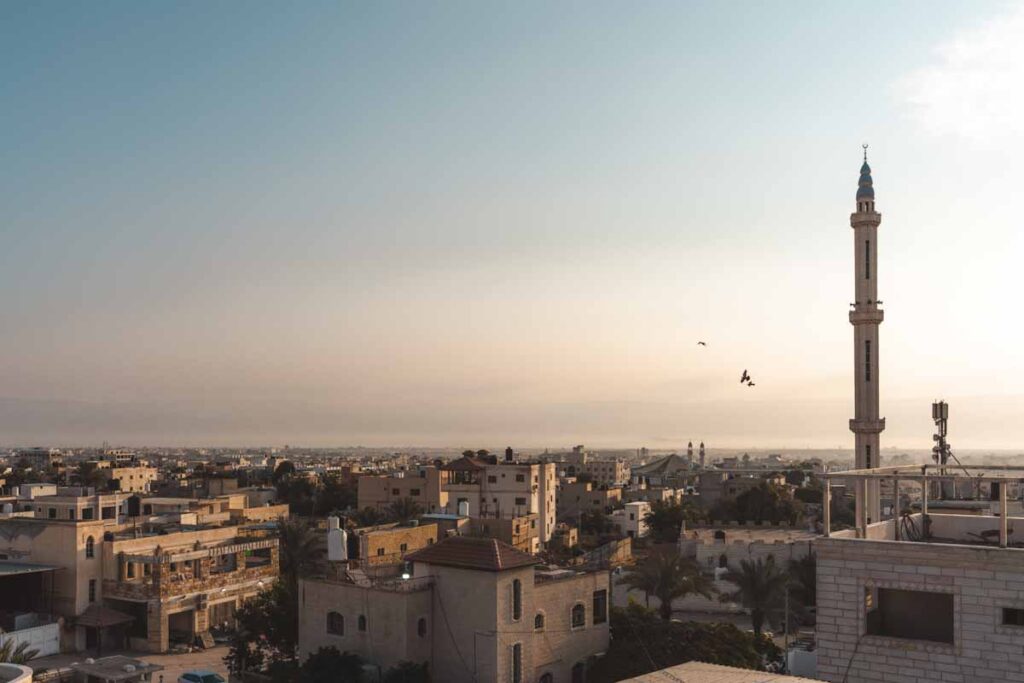
PRACTICAL INFORMATION
- Religion: Palestine is a Muslim country with a majority of Sunni Muslims. As in other countries of the Middle East, people are very welcoming and hospitable. They really want to talk about life in Palestine and are very happy to meet foreigners and invite you for tea. Even though I just said that the majority of people in Palestine are Sunni Muslims, Christianity here plays a significant role. Especially in Bethlehem and also in Ramallah and Jericho. Would you expect to find a local brewery here?
- Language: official language in Palestine is Arabic. We found it very pleasant to travel around Palestine as most people we met spoke at least basic English; therefore, it was very easy to communicate.
- Currency : The currency in Palestine is the Israeli Shekel. 1$ = 3.58 ILS.
- Visa: You don’t need a visa to visit Palestine; however, you must show your passport and the Israeli immigration slip you got once you entered Israel.
Interested in the Middle East? Read our guides from Syria, Iraq, Lebanon and more.
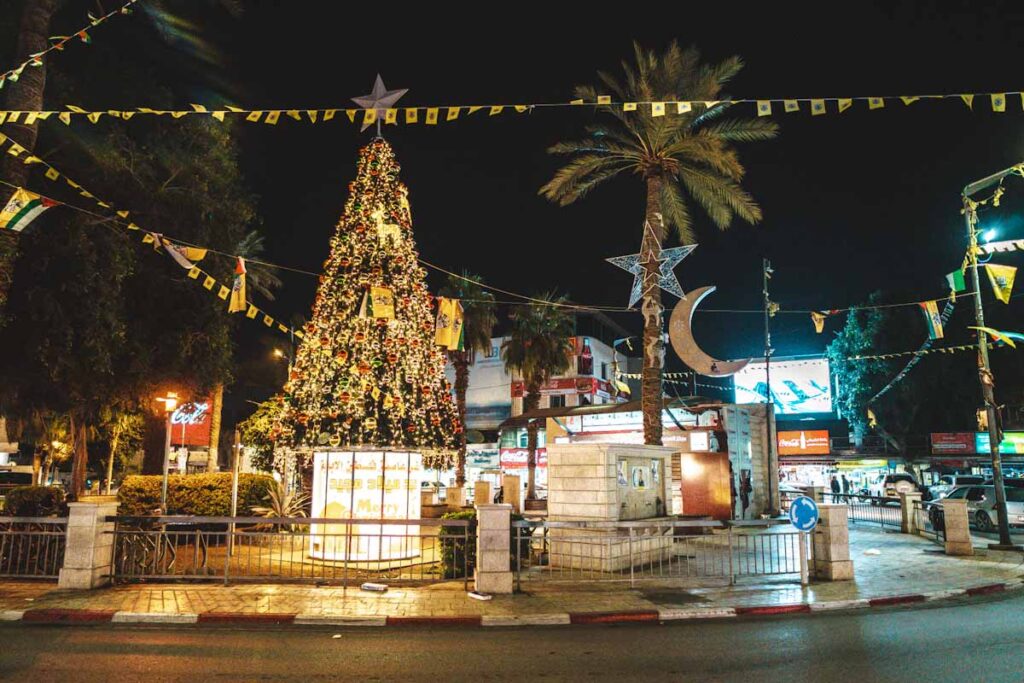
SAFETY AND SITUATION IN PALESTINE
Israel has occupied Palestine since 1967, and the situation is only getting worse with Israel building more and more Jewish settlements in Palestinian territory. Basically, Palestinians have no way to fight back because as soon as they try, the Israeli army attacks back with much more power. Does this fact affect your travel? Yes and no. Yes, because the land is very sensitive, and riots are happening on a daily basis, especially if you decide to stay in a refugee camp with local families. All the army attacks on Palestinian people occur at night and early in the morning. Therefore, try to avoid being outside at that time.
During our time in Palestine, we were informed by local people that there is daily shooting in refugee camps and dangerous situations for Palestinians happening. We personally did not see anything dangerous, and we did not go out at night & very early morning. We felt very safe and welcomed.
Palestine territory is divided into the West Bank and Gaza Strip. Gaza Strip is absolutely off-limits to tourists; therefore, all travel guides we wrote about Palestine refer solely to the West Bank territory.
Essential reading: Is it safe to visit Palestine? Our experience. (Coming soon)
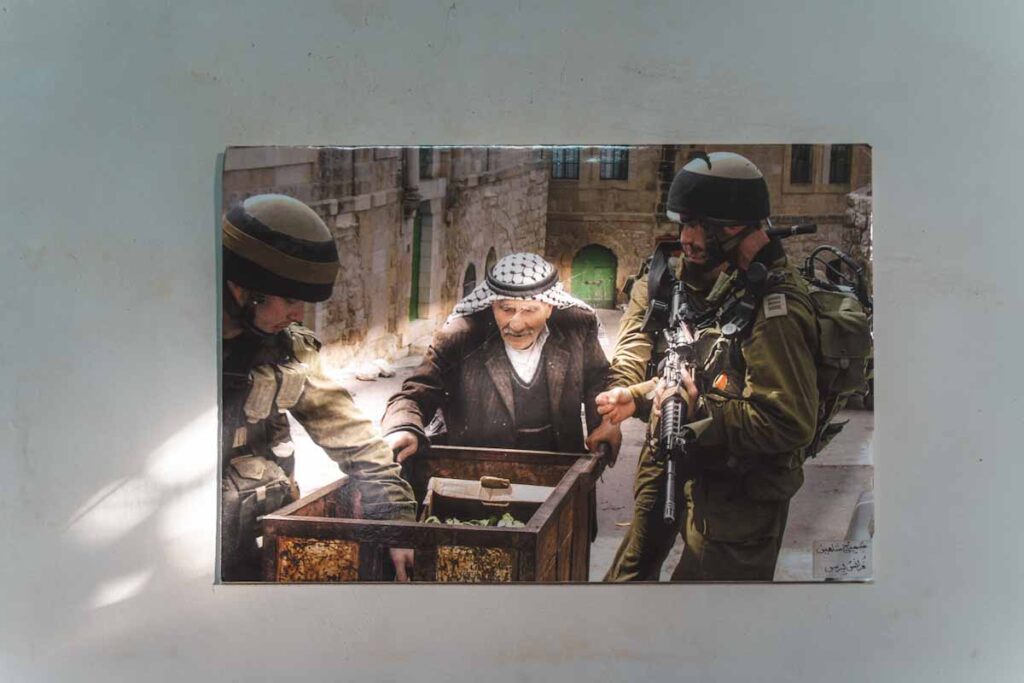
Israel also limits the water supply for Palestine since the reservoir is on Israeli territory. They open the water for Palestinians only two days per month. That’s why you will see many water tanks on the rooftops of houses. Because they have to collect rainwater and in those two days when they have the water they collect as much as possible.
Electricity & Internet works well everywhere we have been in Palestine. Use VPN for accessibility to certain sites.
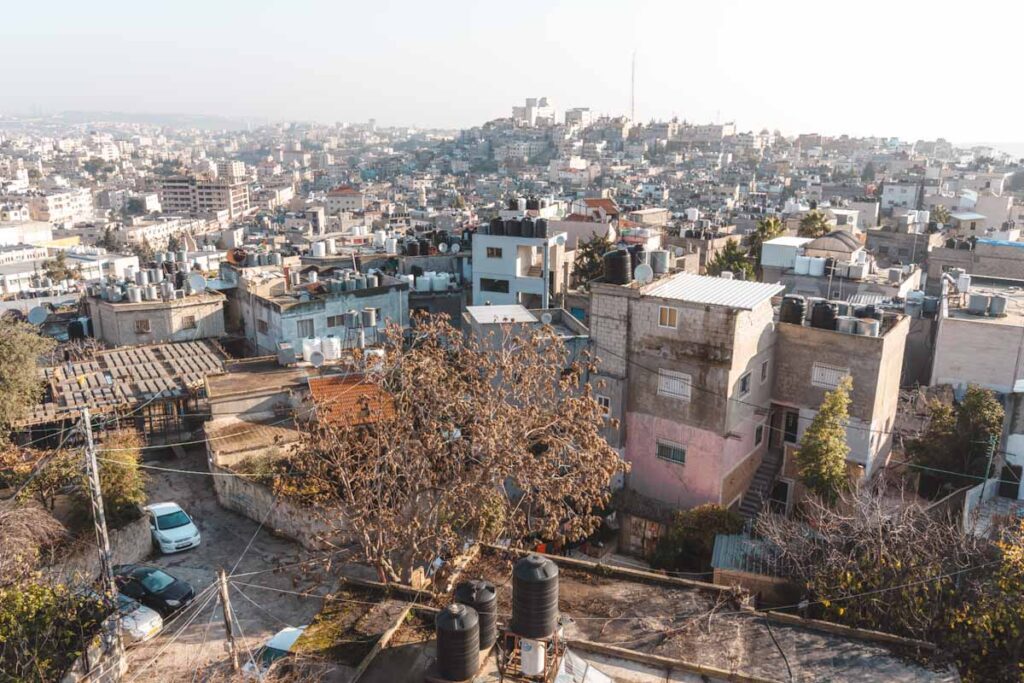
SNIPERS AT BUS STOPS
When travelling in Palestine, get used to seeing snipers behind the barriers, either made of sandbags or bulletproof glass. They are usually located close to where the Israeli settlers live, next to the bus stations. They point their huge gun directly at incoming cars. Sitting in a car and seeing the soldier pointing a gun at you is a super weird feeling. They are protecting the settlers from potential attacks from Palestinians. Notice the huge red signs close to the Jewish settlements that state: ,,This road leads to Area A Under the Palestinian Authority. The entrance for Israeli citizens is forbidden, dangerous to your lives and against Israeli law” . So even if Israelis would like to go and see Palestine themselves. They can not, as they are told it is dangerous for their lives.
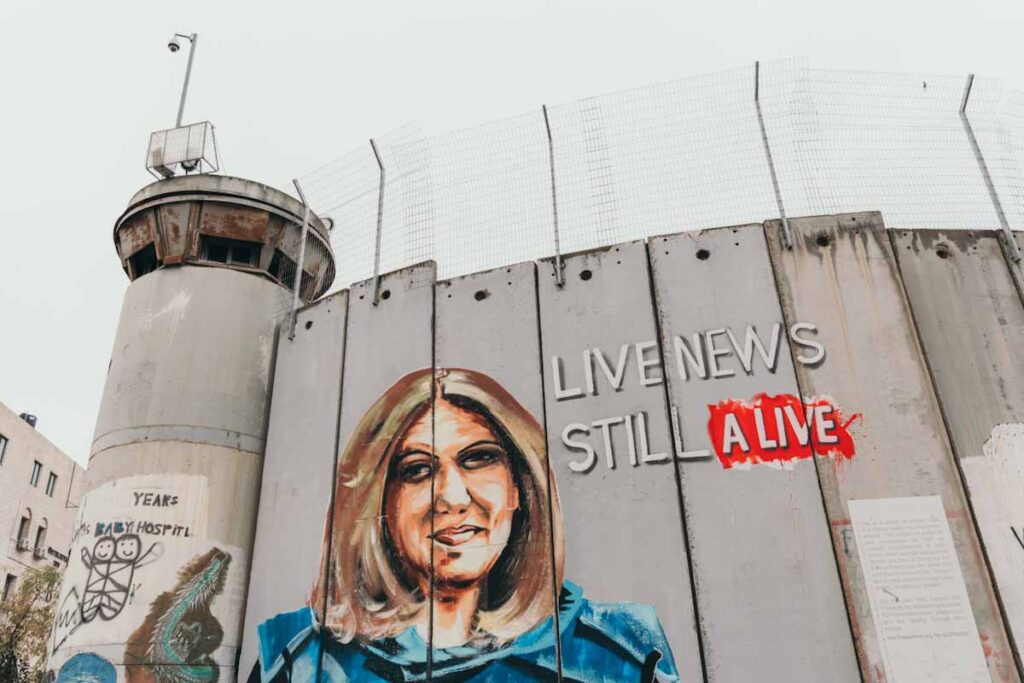
Travel Insurance for palestine
Have proper travel insurance for Palestine covering various activities such as IATI Insurance does. They have fantastic customer service and provide different kinds of insurance packages. As a reader of Broken Navigation, you get an exclusive 5% discount.

Get your exclusive 5% discount for your travel insurance with IATI here.
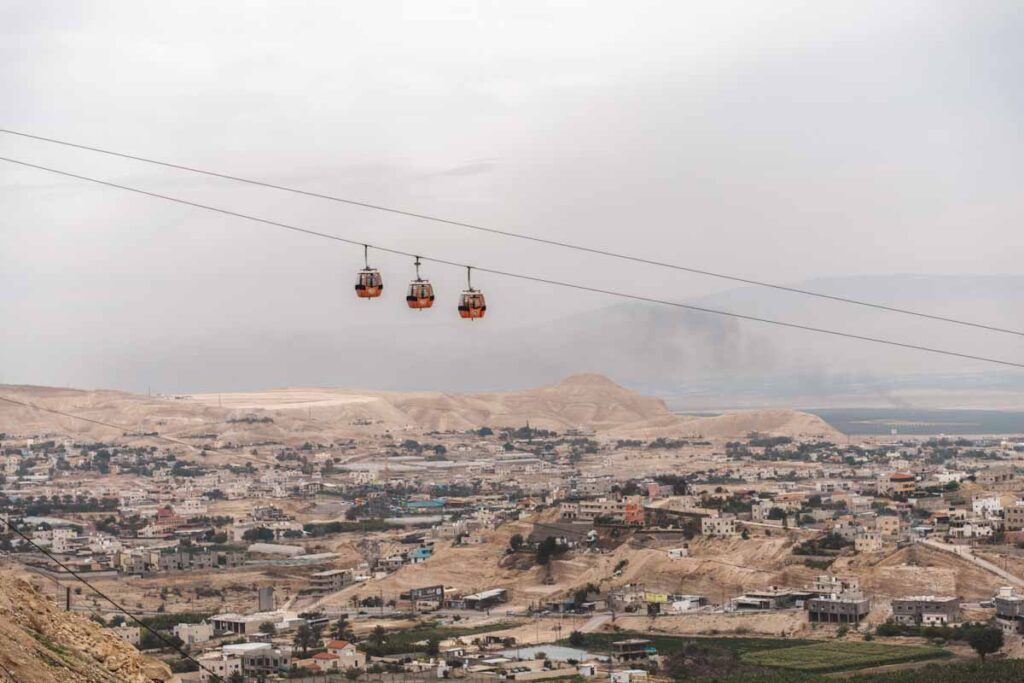
CHECKPOINTS
Going through checkpoints is very easy for foreigners. Basically, in most checkpoints between Israel and Palestine, when going in the direction of Palestine, you just freely walk through without any special check. If you want to go from Palestine to Israel, that’s a different story, though.
Overall, there are more than 100 checkpoints across Palestine and roadblocks to separate new roads, which only Israeli cars can use, from the old and not repaired roads only for Palestinian cars. You will also see the separation wall in Bethlehem, that most likely will leave you emotional with all the powerful graffiti on it. Palestinians say it is to segregate them from the rest of Israel and limit their free movement. Israel claims it is for the safety and preventing the terrorist attack. Come and see yourself. We travelled around Palestine independently to see with our own eyes what was happening. We talked with people to learn their points of view.
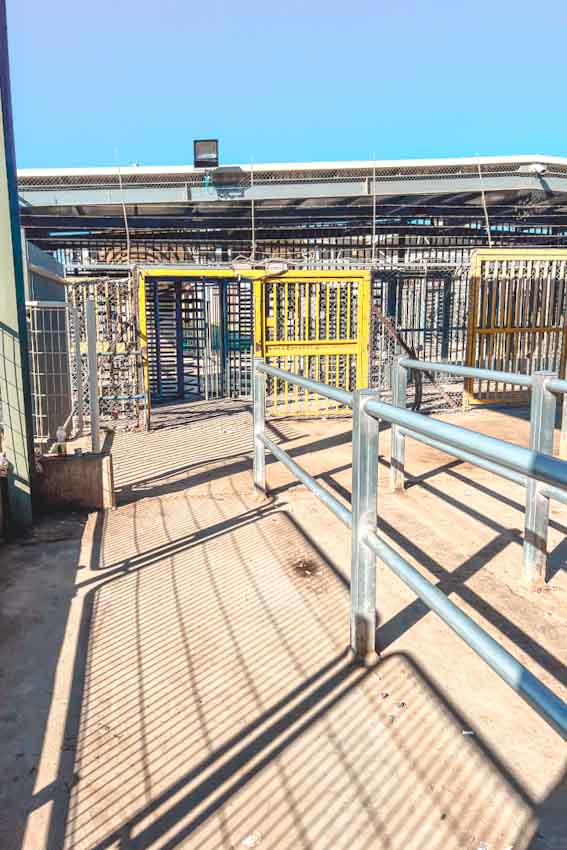
CHECKPOINT 300 – JERUSALEM TO BETHLEHEM
The first checkpoint we crossed was between Jerusalem into Bethlehem. Checkpoint 300. Located South of Jerusalem by the entrance to Rachel’s tomb. This checkpoint is used for Palestinians who are permitted to cross into Jerusalem. If going in the direction from Jerusalem to Bethlehem, it is very easy. You go through the concrete tunnel with multiple one-way gates. There are no officers to check anything as you are going into Palestine, and no one care. If you go in the opposite direction, then officers will check your documents. And for Palestinians, they check their permit. From what we heard, frequent harassment towards Palestinians is happening on these borders. They let them wait for hours.
After we got out into Palestine, there were many taxi drivers. Some of them immediately started chatting with us. Even though they are not used to many tourists coming independently through this checkpoint, they tried to rip us off by asking for crazy amounts of money. That surprised us a bit. Don’t get me wrong. Palestinians are lovely and hospitable people; however, but as elsewhere, be careful about the taxi drivers as they will try to rip you off in many places in Palestine. You don’t need a taxi if you want to explore the separation wall and reach The Walled Off Hotel. You can easily walk as it is an easy 800 m walk from Checkpoint 300. This checkpoint is open 24/7.
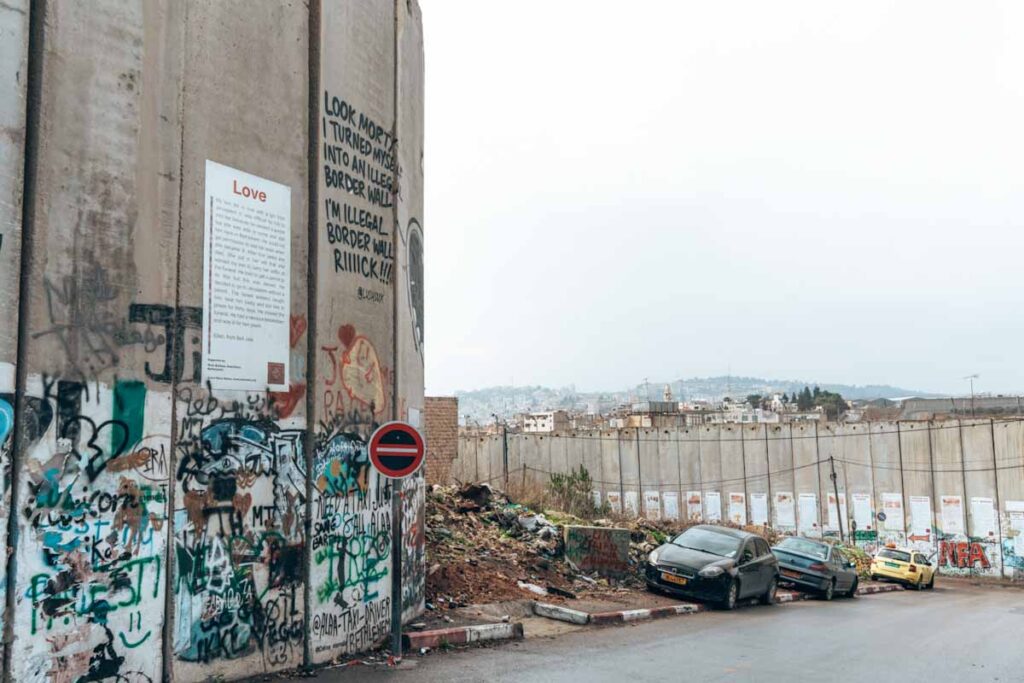
JALAMEK/ EMEK HAROD CHECKPOINT – JENIN TO NAZARETH
Another checkpoint in Palestine we crossed was Jalamek Checkpoint from Jenin to Nazareth. We used this checkpoint on our last day in Palestine to cross into Israel (Nazareth). I have to say; the Jalamek checkpoint was the worst border crossing / Checkpoint we have ever experienced. The way Israeli officers act here is unthinkable. They are rude, humiliate people and make you feel like nothing. Here, the checkpoint is open only at certain times. We arrived here at 2pm, and it was closed. We and other Palestinians waited an hour, and at 3pm, they finally opened the gate. Be careful; it is open only for some time and then closed again. The best way to find out is to ask locals. We were told the checkpoint is open from 2pm, but as you see, they did not open till 3pm. Then the queue was already quite long; we were between the first ones who got through the gate. We recommend you have your bag carefully packed and prepared and have documents handy. As soon as the gate opens, people start rushing and pushing you from behind. Everything goes very fast and hectic. First, you have to send your luggage through the x-ray check, your jacket as well, belt etc. It is a similar procedure to the security check at the airport. We did not expect that. And there was very little space, people were rushing, and we had to pick up our bags quickly & forgot our bag with food there as it was super hectic. Then we continued through the designated path until we reached the officer in a stall behind bulletproof glass. From the second floor, there was an officer with a gun pointing at people. Super weird situation. They checked our passports and took them.
We were asked to go aside, and after a few minutes, the officer & armed guard came to question us. What we did in Jenin was their biggest concern. We said we did not go to Jenin but to Nablus. This was partially true as we slept in Nablus and Jenin we visited when we went through on the way to the border. Why do you go to Israel? What you’re going to do? We showed our itinerary for Israel, explained we were travellers, and they let us go through after a few minutes. Overall, this checkpoint with waiting for opening took 2 hours. Even though the experience here was awful, I recommend anyone to cross this border to see with their own eyes how the officers act towards others.
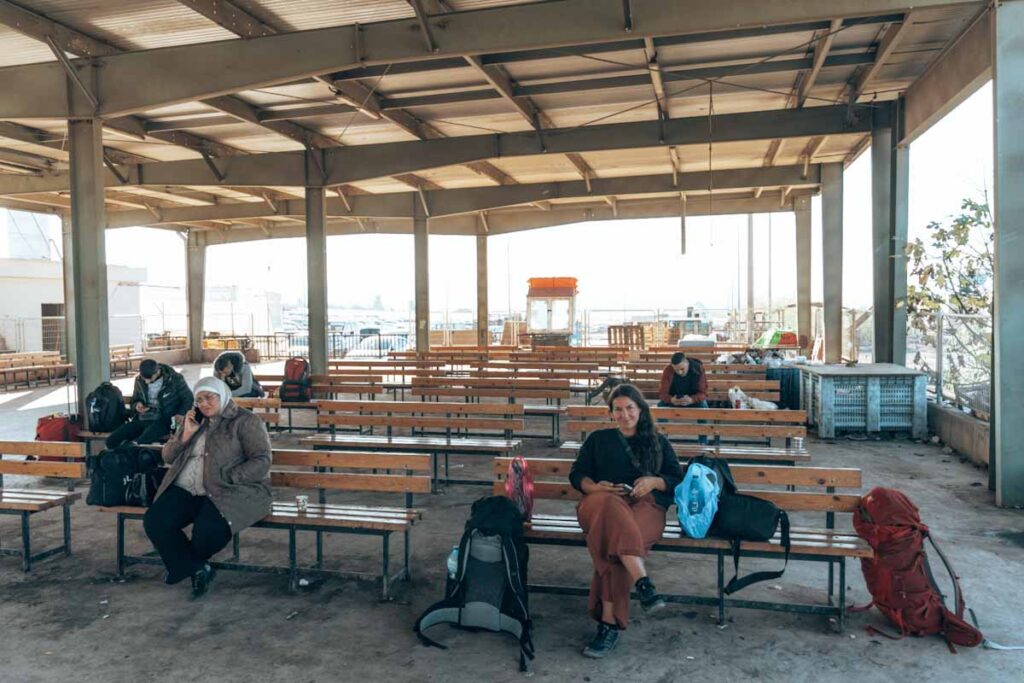
CHECKPOINTS IN HEBRON
When visiting Hebron, you will go through multiple checkpoints. Hebron is divided into two areas known as Area H1, which is under the control of Palestinians and Area H2, which is Israeli controlled area. Both crossings are in the Middle of the city. The tension between those two areas is huge as the checkpoints separate the Al-Ibrahimi Mosque (Holy site for Muslims) from the Cave of Patriarchs (holy site for Jews). One building. Two checkpoints.
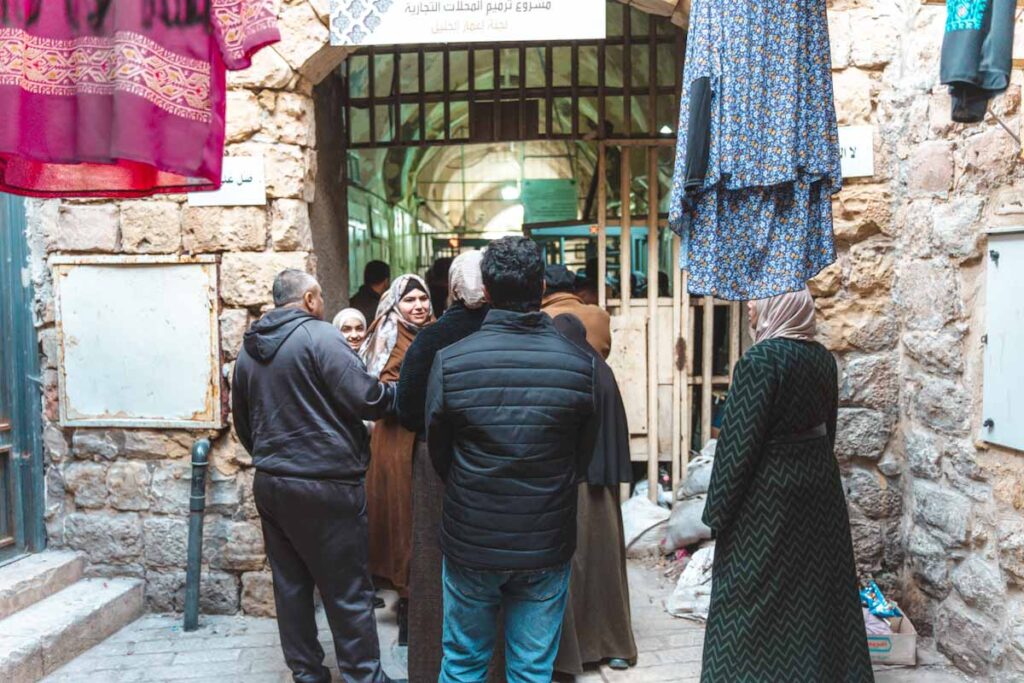
CHECKPOINT TO AL IBRAHIMI MOSQUE
Basically, to enter the Al Ibrahimi Mosque, you go through 2 checkpoints. In both of them, they ask where you are from, why you are here and if you have any weapon. The officers let people go through a one-way gate only one by one. So when the light is green, you can go. Otherwise, you wait in a queue.
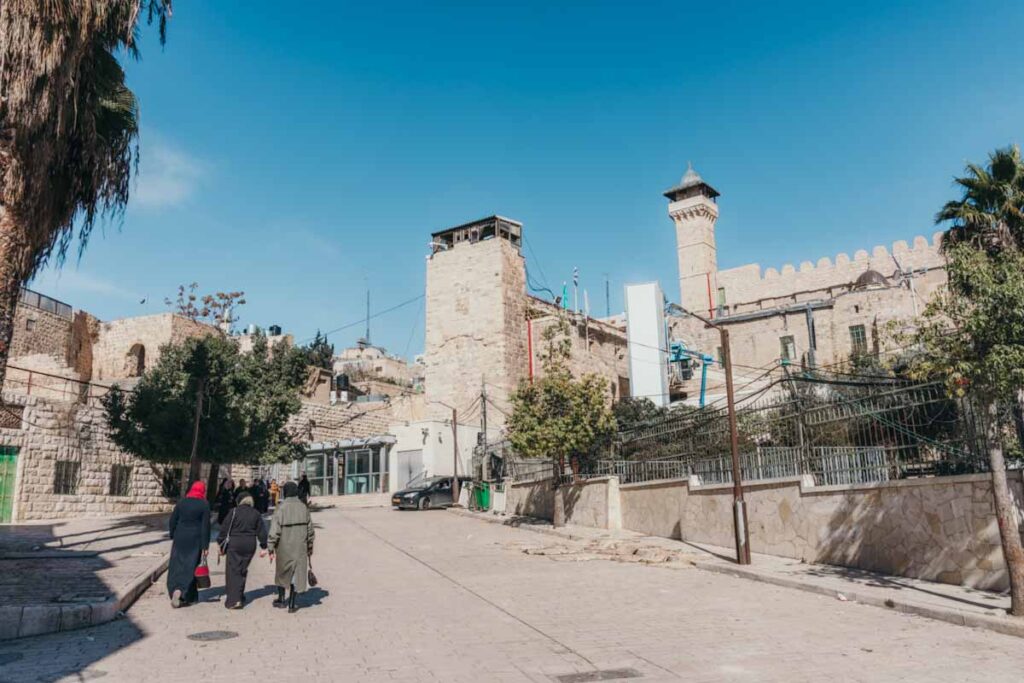
CHECKPOINT TO CAVE OF PATRIARCH
To enter the Cave of Patriarch, you return to the main street (in front of the first checkpoint you crossed) and make your way toward the checkpoint that leads into the Cave of Patriarchs. Here you have to answer the same questions, and you also will be asked about your religion. We said we are Christians. Entry for Muslims is forbidden here.
CHECKPOINTS IN H2 AREA – ISRAELI TERRITORY
After visiting the synagogue, we walked around the area H2, which is under Israeli control. It is basically a dead city with a huge military presence. No Palestinians can set foot on those streets. There were multiple barriers with soldiers who always stopped us, asking what we were doing there, where we were from and where we were going. They checked our passports, made a few phone calls – I guess to the soldiers on the other barrier and let us go. When we wanted to go and visit the archeological site up the hill, the Israeli soldiers told us that area was not safe for us to go alone and would not let us go through without an armed escort. We accepted. Otherwise, we would have to return to area H1, where we had a hotel. After visiting the site, we crossed another checkpoint that brought us back to the H1 area.
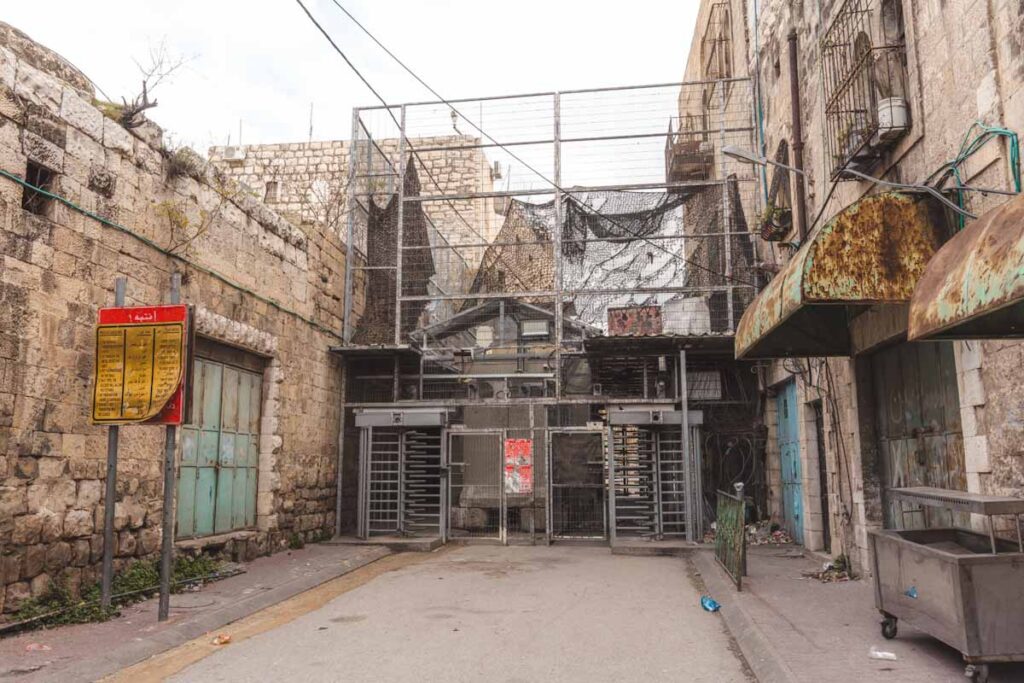
WHEN TO VISIT PALESTINE
When is the best time to visit Palestine? Avoid the summer in Palestine if possible, as the temperatures get way too hot. We visited Palestine in January, and it was a perfect time as we still managed to see a lot of Christmas decorations, and it was not too cold. In Jericho was the warmest weather from the whole trip.
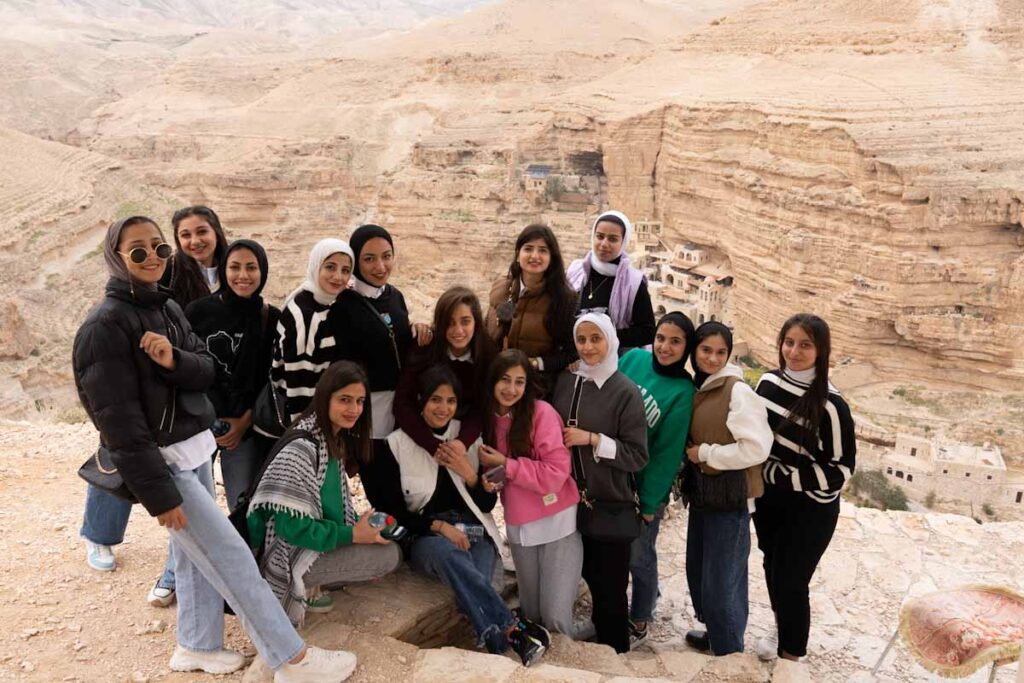
THE BEST TOURS TO PALESTINE
Independent travelling in Palestine is not a big thing. To be more precise, we barely met any travellers during our travels, and the first hint that Palestine’s destination is not among the most typical is the fact there only exist a few up-to-date travel guides.
In our eyes, it is very easy to get around independently, and obviously, that way, you experience a whole different point of view than if you take a tour. On the other hand, I understand that many people maybe don’t want to travel alone or want a guide to listen to their opinions on the situation. There are many tours you can take comfortably from Jerusalem. If that’s what interests you, base yourself in Abraham hostel in Jerusalem and check our top tour picks:
HOW TO GET TO PALESTINE
There is no international airport in Palestine; no matter what direction you’re coming from, you must go through Israel.
To get to Israel, you can cross overland borders from Jordan, or like we did from Egypt. However, the most common way to reach Israel is by flight and airports in Tel Aviv or Eilat have frequent flights from Europe with the low-cost airline Wizzair, and you can find flights for as little as $25.
Find cheap flights to Israel here.
Border Crossing Report: How to cross the Taba Border between Egypt and Israel.
HOW TO GET AROUND PALESTINE
Getting around Palestine is very easy as the shared taxi system works very well. Don’t bother using Google Maps, as it always shows you a non-sense, much longer way. Instead, use Maps.me app that shows the correct way. Travelling around Palestine by shared taxis or buses is easy, convenient and safe.
SHARED TAXIS & PRICES OF TRANSPORT
Here you can see the summary of buses & shared taxis we used in Palestine and how much they cost. Bear in mind, when travelling around Palestine, to start your day early as there is much more traffic going to places and also coming back from sights is much easier in the early afternoon rather than in the evening as there are lower chances of catching the shared taxi or you will wait a long time for them to fill up. Usually, the shared taxis run till 6pm, but make sure you ask drivers or locals before. In our experience, we woke up every day early and started exploring no later than 8-9am. We never had any problems with waiting for shared taxis to fill up. It usually took up to 10 minutes only.
- Jerusalem – Bethlehem: bus #234 to Checkpoint 300 5.5 ILS ($1.5)
- Bethlehem – Mar Saba: Shared taxi to Ubediya 5 ILS ($1.4)
- Shared taxi in Bethlehem: From the centre to Dheisha refugee camp 3 ILS ($0.8)
- Bethlehem – Hebron: Shared taxi from Dheisha refugee camp 10 ILS ($2.8)
- Hebron – Jericho: Direct shared taxi 30 ILS ($8.3) or Shared taxi to Al Azariyah 20 ILS ($5.6) and change to shared taxi to Jericho 10 ILS ($2.8)
- Shared taxis in Jericho: From the centre to Hisham Palace 10 ILS ($2.8) to Mount Temptation 20 ILS ($5.6), to St. George Monastery 15 ILS ($4.2)
- Jericho – Ramallah: Shared taxi 18 ILS ($5)
- Ramallah – Nablus: Shared taxi 17 ILS ($4.8)
- Nablus – Jenin: Shared taxi 16 ILS ($4.5)
- Jenin – Emek Harod Checkpoint / Jamaleh: Shared taxi 4 ILS ($1.1)
You can expect to spend a total of around 180 ILS ($50) for transportation in Palestine.
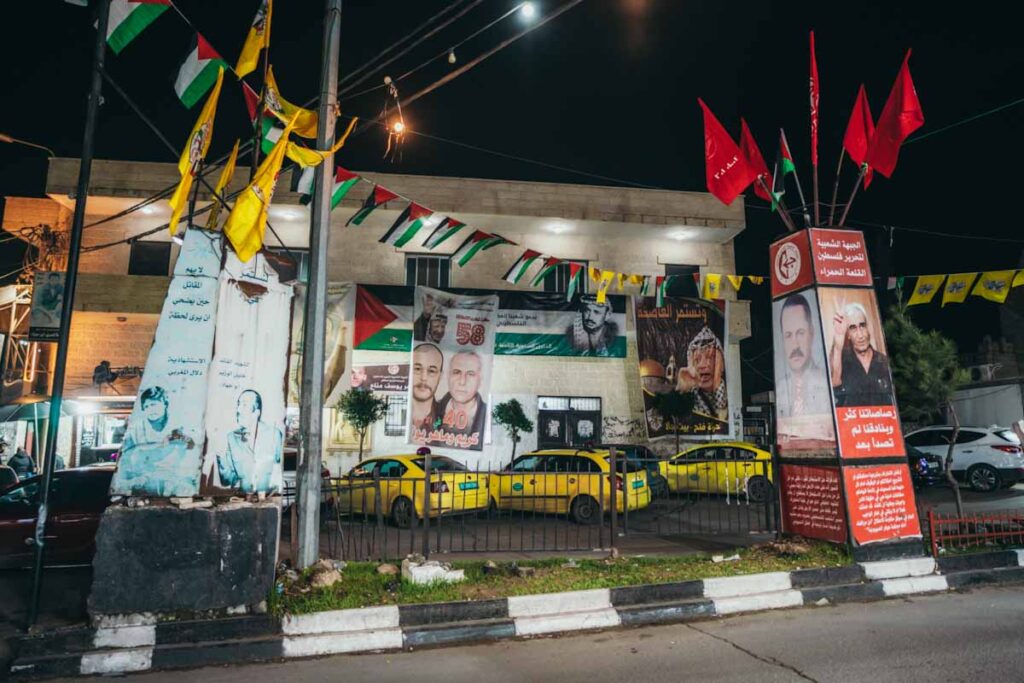
DO YOU HAVE A TROUBLE STAMP ON YOUR PASSPORT?
When we travelled to Palestine, we had two passports with us, and the one we used had stamps from Syria and Iraq and multiple stamps from Lebanon and other Muslim countries. We decided to cross the overland Taba border between Egypt and Israel with that passport as we thought it might be even more suspicious if we used the clean ,,backup” passport, and they found the other one with stamps from those countries. We have been detained and questioned for 5 hours, including a body search and a very detailed bag search. After 5 hours, we successfully made it to Israel. You can read a full report on crossing the Taba border into Israel here.
After we made it to Israel, we no longer had any issues, even though multiple officers in both Israel and Palestine checked our passports.
The currency in Palestine is the Israeli Shekel. $1 = 3.58 ILS. Regarding ATMs money withdrawal, you don’t have to worry about anything as ATMs are widely spread and easy to find. We withdraw money in Palestine many times and never faced any issues. However, there is always a transaction fee of around 11 ILS ($3). In the Bank of Palestine, the withdrawal fee was even 40 ILS, so don’t even bother. We usually used the ATM of the Arab Bank . We used cash everywhere in Palestine; they are not used to card payments. But it is possible in some places.
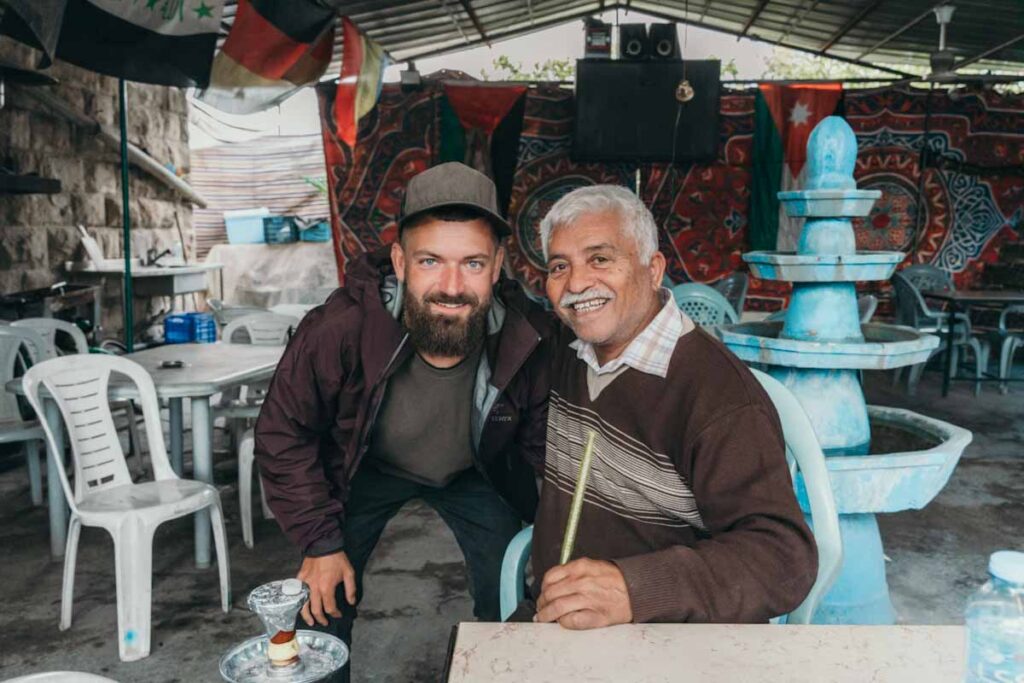
INTERNET & SIM CARD
The Internet in Palestine is very good. In every accommodation we stayed wifi was very fast and reliable. Regarding Sim cards, you have two options. Either buy it in Palestine or Israel. SIM cards in Palestine are cheaper. However, their coverage is not great, and it’s only 2G, sometimes 3G. We recommend getting a SIM card in Israel. We bought ours in Jerusalem. It is not the cheapest, but it worked well in most places. However, we had some outages in Bethlehem and Hebron. Anyway, from what we heard from others, Pelephone is still the best option for Palestine. To access some sites, you will need a VPN. We paid 100 ILS ($28) for a Pelephone SIM card with 100 GB, unlimited use of apps such as Instagram and Facebook, and they provide 5G. Even Palestinians use Israeli sim cards. Don’t buy a sim card at the airport; they are overpriced.
VPN FOR PALESTINE
To access many sites in Palestine, it is necessary to use a reliable VPN app . Don’t use the free VPN apps, as they are unreliable, and there is always a safety risk as they can steal your data. We always use NordVPN everywhere we travel. They have excellent services and very fast support, which is important when you need to access the internet quickly. In some countries we visited, VPN can be blocked, but after we contacted the helpdesk of NordVPN, they quickly navigated us how to connect. Check the link below for the discount option – sometimes you can get up to 65% discount for a 2-year plan.
Check the best prices for NordVPN here.
PRICES IN PALESTINE
- Entrance fees: usually around 5-10 ILS ($1.4 – 2.8)
- Accommodation: $17-$35 for both of us per night
- Transportation: For 11 days in Palestine and using Shared taxis, we spent around $50 per person; you can see more details in How to get around Palestine section.
- Falafel sandwich: 5 ILS ($1.4)
- Ice cream: 5 ILS ($1.4)
- Palestinian Pizza: 7-10 ILS ($2-2.8)
In 11 days in Palestine, we spend around $750 for both of us ($375 per person) , so I’d say Palestine is a very affordable destination. In that budget, I don’t count the flight ticket from Tel Aviv to Europe, which costs an additional $50 per person.
WHERE TO STAY IN PALESTINE
You can find accommodation on Booking.com and also Airbnb. However, during our visit, the hotels started to disappear from Booking.com due to some new laws and hotel owners told us that the issue is they can not receive money through booking into their bank account due to them being from Palestine. Just another example of unfair play Palestinians have to go through. Anyway, you can also try to contact the hotels directly by searching their number through Google. The majority of people use WhatsApp, and Couchsurfing is also popular. We got in touch with a few incredible people who have been willing to show us around. The sleepover never worked, though, but at least for meeting local friends, it is incredible. See below all the accommodations we used in Palestine. We describe each accommodation in greater detail in our 11 days itinerary below.
The following prices are per night for two people:
- Jerusalem I Abraham hostel ($52, dorms)
- Bethlehem I Staying with Ibrahim’s family in Dheisha Refugee Camp ($33)
- Hebron I Friends Hostel Area B ($32)
- Ramallah I Eco Hostel Ramallah ($40, dorms)
- Jericho I Aqabat Jabr Refugee Camp Sami hostel ($33)
- Nablus I Turquoise Guest House ($36, dorms)
- Jenin I Jenin Creative Cultural Center ($55)
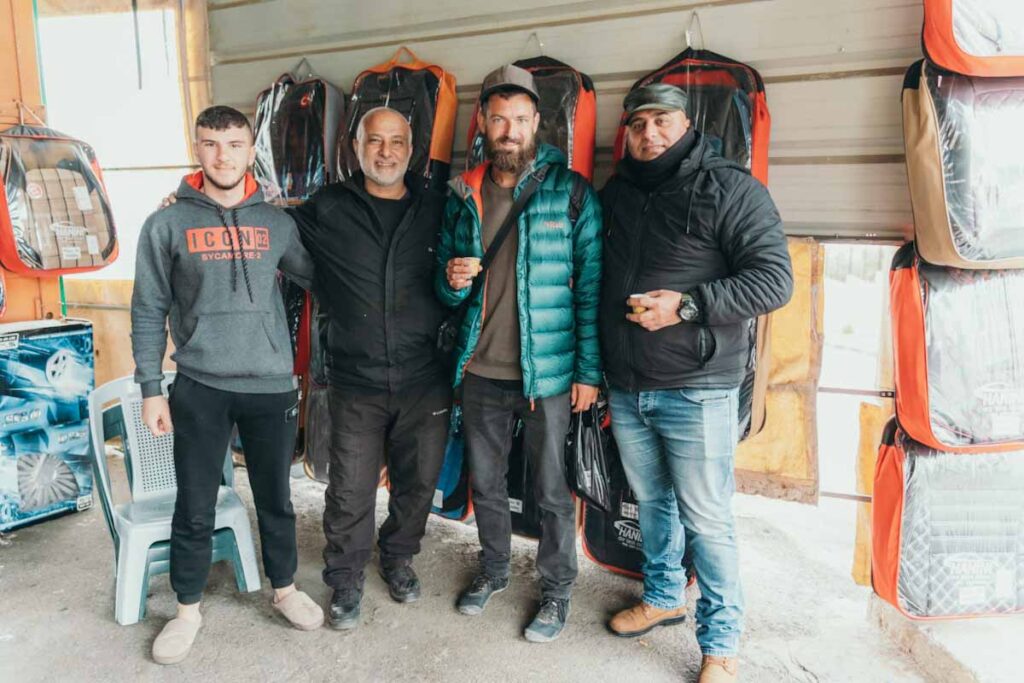
STAYING IN REFUGEE CAMPS
If you truly want to understand Palestine, there is no better way than staying overnight in one of many refugee camps in Palestine. We absolutely loved staying with locals in camps, listening to their stories, and seeing the reality with our own eyes. Read our detailed travel guide on how and where you can stay in refugee camps in Palestine and how to book it, including contacts and exact locations in Bethlehem, Hebron and Jericho.
Read more: How to stay in Refugee Camps in Palestine & Things to know.
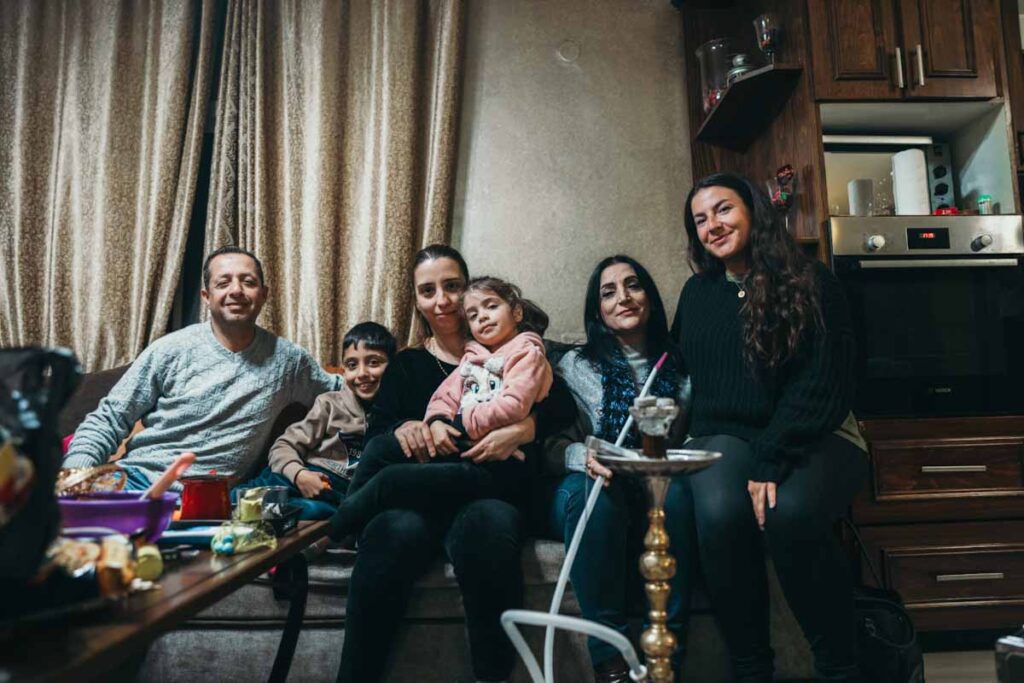
QUICK SUMMARY OF OUR 11 DAYS ITINERARY:
- DAY 1 JERUSALEM (1 NIGHT)
- DAY 2 – 3 BETHLEHEM (2 NIGHTS) – Checkpoint 300 to get in West Bank
- DAY 4 – 5 HEBRON (2 NIGHTS)
- DAY 6 RAMALLAH (1 NIGHT)
- DAY 7 – 8 JERICHO (2 NIGHTS)
- DAY 9 – 10 NABLUS (2 NIGHTS)
- DAY 11 JENIN – Emek Harod Checkpoint to get out West Bank
Map of the 11-day itinerary for Palestine
11 DAYS ITINERARY FOR PALESTINE
Day 1: jerusalem.
The first minute we stepped out from a bus in Jerusalem, we found ourselves immersed in a culture we haven’t seen before. We felt like we showed up in an old movie with all the fashion people in Jerusalem wear. Jerusalem is today part of Israel. However, East Jerusalem is inhabited by Palestinians.
Not every day you see a city that welcomes more religions, and Jerusalem is the holy place, sacred for Jews, Muslims and Christians.
Essential reading: How to visit top places in Jerusalem in one day.
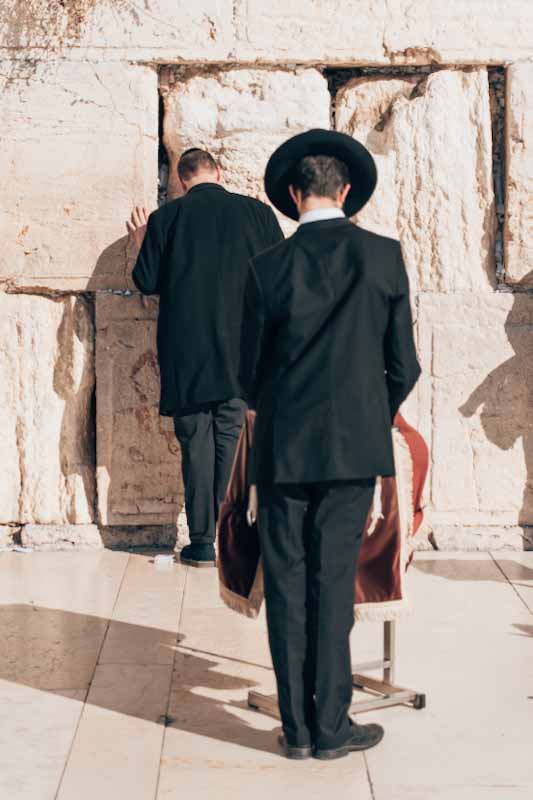
BEST THINGS TO SEE IN JERUSALEM
Temple mount/ al haram ash sharif.
The biggest landmark in Jerusalem, especially the Dome of the Rock , is the most holy and famous site. There are nine gates for Muslims to enter; however, as a non-muslim, you can only enter through the Gate of Moors (Bab Al Maghrib). It is recommended to line up early, as many tours are coming and you should expect huge queues. When we visited in January, there was a small queue, and it took just 10 minutes to get inside. You will go through the security check and then follow the wooden bridge that gives you a perfect view of the Western Wall.
The Dome of the Rock is where you find the foundation stone Jews believe is the centre of the earth. For Muslims, it is a place where Mohammed made his ascent. Non-muslims can’t enter the Dome of the Rock or Al Aqsa Mosque. But even from outside, we had a great time wandering around its plaza and admiring the architecture, which is simply stunning.
- Sites inside Temple Mount Areal: Dome of the Rock, Al Aqsa Mosque, Dome of the Chain, Sabil of Qaitbay, Scales of Souls, Bab Al Qattanin
- Opening hours for Temple Mount for non-muslims: 7 – 10:30am and 12:30 – 1:30 pm in winter and 7 – 11am and 1:30 – 2:30 pm in summer. Fridays and Saturdays are closed.
- Entrance fee: Free
- Security: They take security seriously in Temple Mount, and they will thoroughly search your bag while entering by the Gate of Moors. The military presence here is huge.
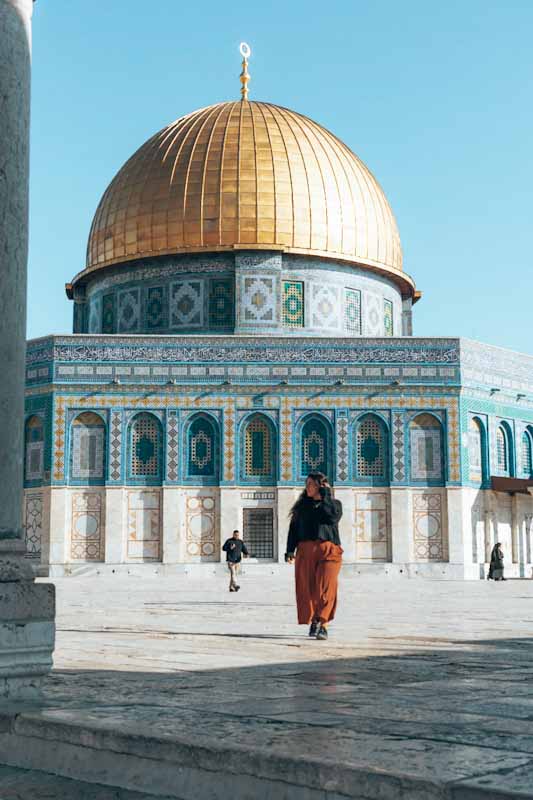
Western Wall
Western Wall is the holiest site in the world where Jews pray by the wall. We already mentioned above you get a perfect view of the Western Wall from above when walking on the wooden bridge when visiting Mount Temple. Stop there for a few minutes and just watch how Jews pray here. Western Wall is open 24 hours a day, but it makes the most sense if you come here after visiting Mount Temple as it is very close.
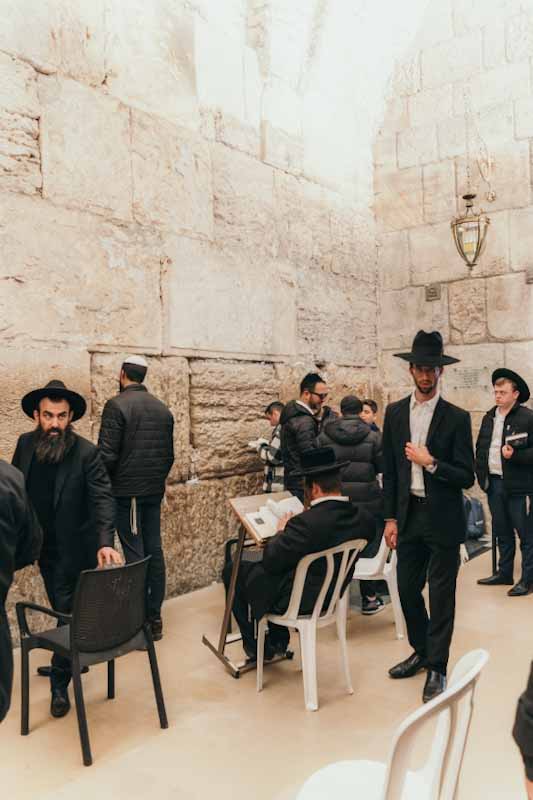
Church of the Holy Sepulchre
After seeing the holiest site for Jews, it’s time to move to the Christian Quarter, where the main pilgrimage site for Christians, the Church of the Holy Sepulchre, is to be found. Christians come and pray here by the empty tomb of Jesus. It is the place where Jesus was crucified. You find here the Stone of Unction, which is apparently where Jesus’ body was laid and prepared for burial.
- Opening hours of Church of the Holy Sepulchre: 5am – 8pm from April to September and 5am – 7pm from October to March.
- Entrance fee: Free
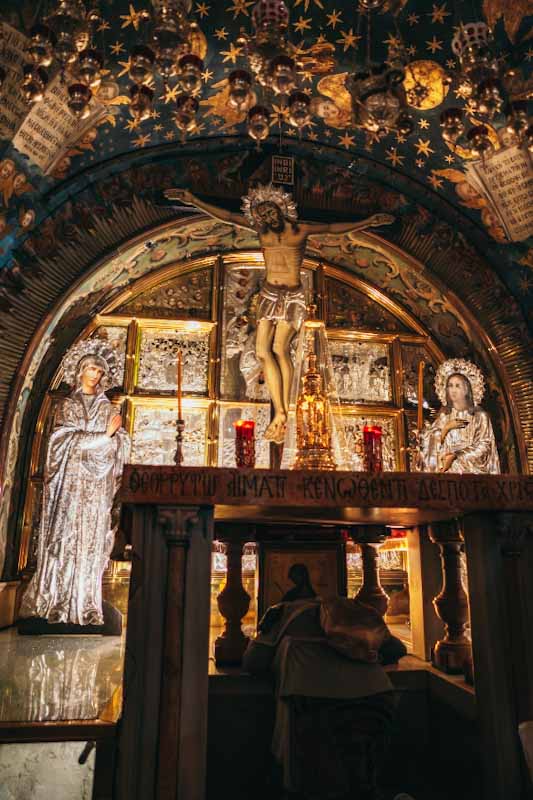
Via Dolorosa
Via Dolorosa is the holy walk through the Jerusalems’ holiest sites. It takes roughly one hour to walk this 600m paths; that is the one believed that Jesus took carrying the cross. We took a whole walk and did not expect such a spiritual experience. Having a map from Lonely Planet and reading the description of places as you go is worth it. The walk starts by St. Stephen (Lion’s) Gate, and it ends at the Church of the Holy Sepulchre.
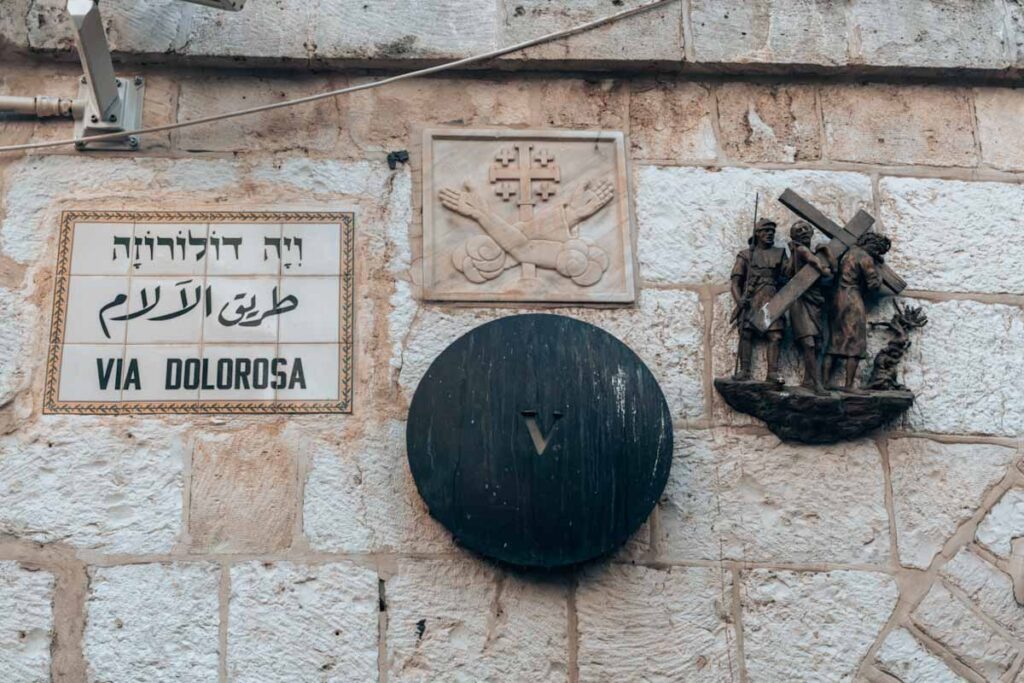
Mount of Olives
To end the day and watch the sunset with an unbeatable view over Jerusalem, head to the top of the Mount of Olives. We decided to walk from the old city, but you can also take bus number #83, which runs between Jaffa Gate and the top of the Mount of Olives. The viewpoint lies over the slopes of the cemetery where more than 150 000 Jews are buried. It is worth it to come here for epic views of Jerusalem with the shining golden Dome of the Rock.
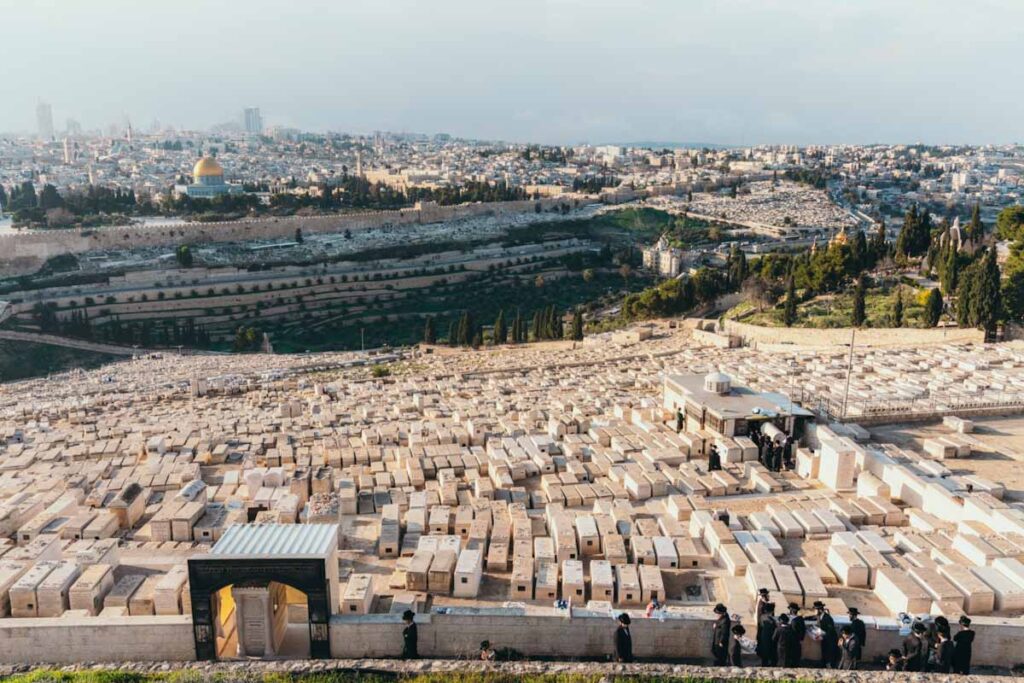
Mahane Yehuda Market
We enjoyed strolling through this vibrant market after sunset. You can expect many halva, bakeries, cool food stalls and eateries. If you want to buy some locally grown products such as dates, oils and much more, this is the place to be. This market stood here since the Ottoman period and is located on Yehuda St., which is an open market, especially for veggies and butchers, and Etz Chayim St., where all the eateries, bakeries and halva makers are. We ended our day in Jerusalem here.
- Opening hours for Mahane Yehuda Market: 8am – 7pm and 9am – 3pm on Fridays.
We managed to visit all these top sites in Jerusalem during a 1-day visit. We started exploring early in the morning, and we had plenty of time to see most places. However, you can easily spend more days here as there are many historical and religious sites to visit.
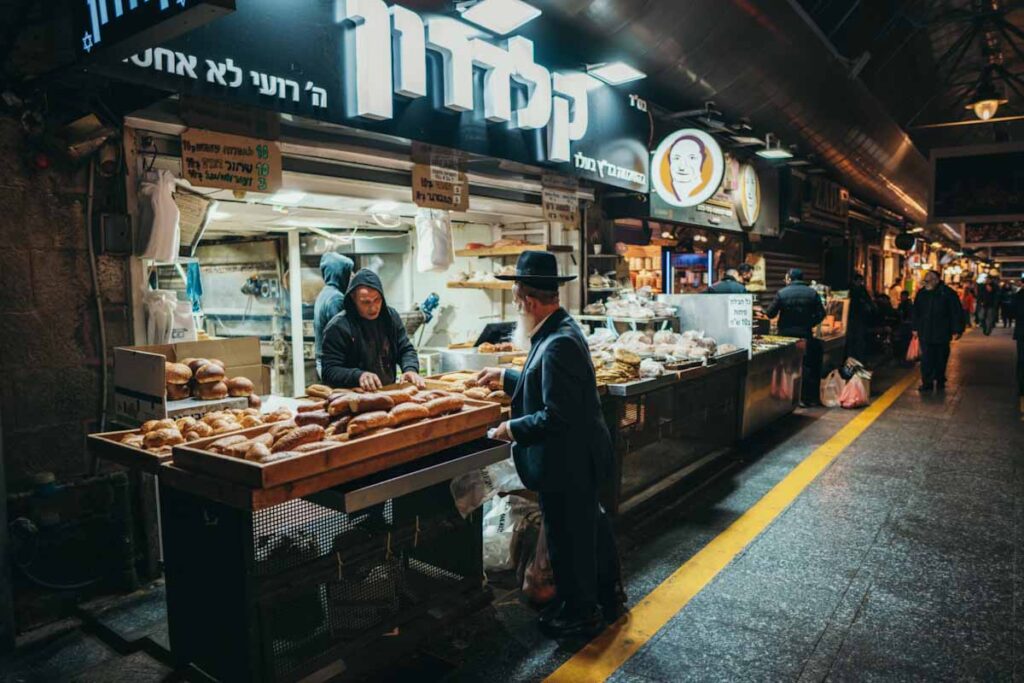
HOT TO GET AROUND JERUSALEM
Use Rav Kav Card and travel with trams and buses all around Jerusalem. You find the correct timetables in Moovit App. However, if you base yourself in the old town or close, you can basically visit all places by just walking around.
HOW TO GET TO JERUSALEM FROM EILAT
In Eilat, we took bus #444, which goes from Eilat Central Station. We got our tickets for 63 ILS and waited for an hour for the next bus as it was Shabbat, and the bus went every hour from 3pm. The bus wasn’t full, so I believe it was enough to get the bus ticket on the spot. We also bought here the Rav Kav card for public transport in Israel.
WHERE TO STAY IN JERUSALEM
The budget I Abraham Hostel – we highly recommend you stay here, as Jerusalem is pretty expensive, but staying in Abraham Hostel gives you a lot of advantages. They serve a huge, healthy local breakfast buffet that will make you full for most of the day. And if you pay for your stay in advance, you also get a free ticket for a beer in their bar. It is also located close to the centre, with a tram station right in front of them. It is one of the best hostels we have ever stayed in.
DAY 2-3: BETHLEHEM
Bethlehem is a synonym for religious travel in West Bank. Many pilgrims come to see the main sight, which is the Church of the Nativity. Many tours are coming here, but is there more to see from Bethlehem? Oh, yes, but you have to go behind the tourist trail. Many tourists come with a guide as they’re worried about crossing the checkpoints independently into Palestine. What a shame because the true understanding of what is happening in Palestine does not lie in the Church of the Nativity. But far behind the line when you experience staying with a local family in the Dheisha refugee camp in Bethlehem. Read our recommendation of places that you can visit in two days in Bethlehem.
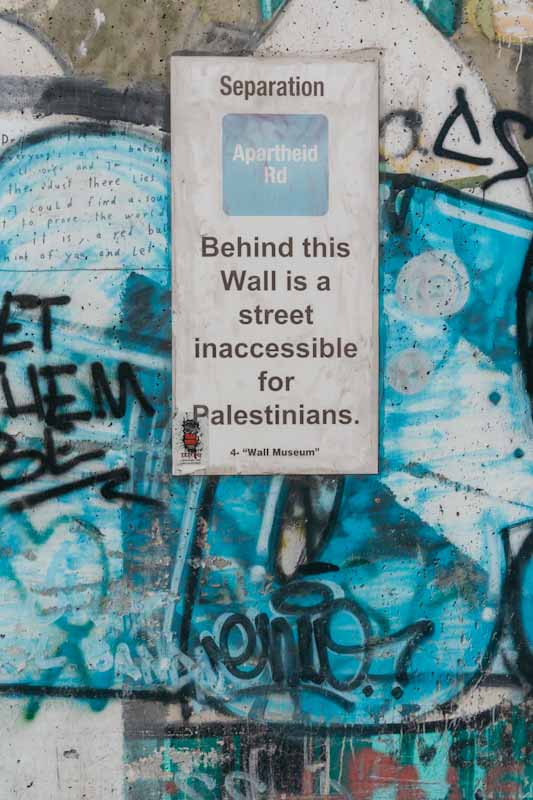
BEST THINGS TO SEE IN BETHLEHEM
Israeli separation wall.
As soon as you cross Checkpoint 300 to Palestine, you will see the huge separation wall that is known as Israeli Separation Wall. It is a concrete wall up to 8m high that separates Israel from West Bank. The first feeling of this wall is pretty depressing. Follow the path along the wall and walk towards Walled Off Hotel. It is where you will see the most powerful graffiti. Basically, the whole wall is covered with graffiti, and each of them has a powerful message. Take your time to read it, to carefully watch all the art that helps Palestinians express how they feel. Truly powerful. Before we turned to the street that led to the Walled Off Hotel, there was a petrol station where we left our backpacks. The friend of Ibrahim, our host in Bethlehem, arranged it for us so we didn’t have to carry it the whole day before he picked us up later in the evening. Take your time and make a loop from Checkpoint 300. Go straight until the turn left that takes you to the Walled Off Hotel. Then turn left again, follow the wall until you can turn left, and follow the path down the hill, check the graffitis along the way. This loop is the most common to walk, as you will see most graffiti on the wall.
From the point of Israel, they built this wall for the safety of Israelis as frequent bomb attacks were taking place in the past, killing many Israelis. From the Palestinian point of view, this wall is to separate Palestinians, humiliate them, control their movement and show who has the power.
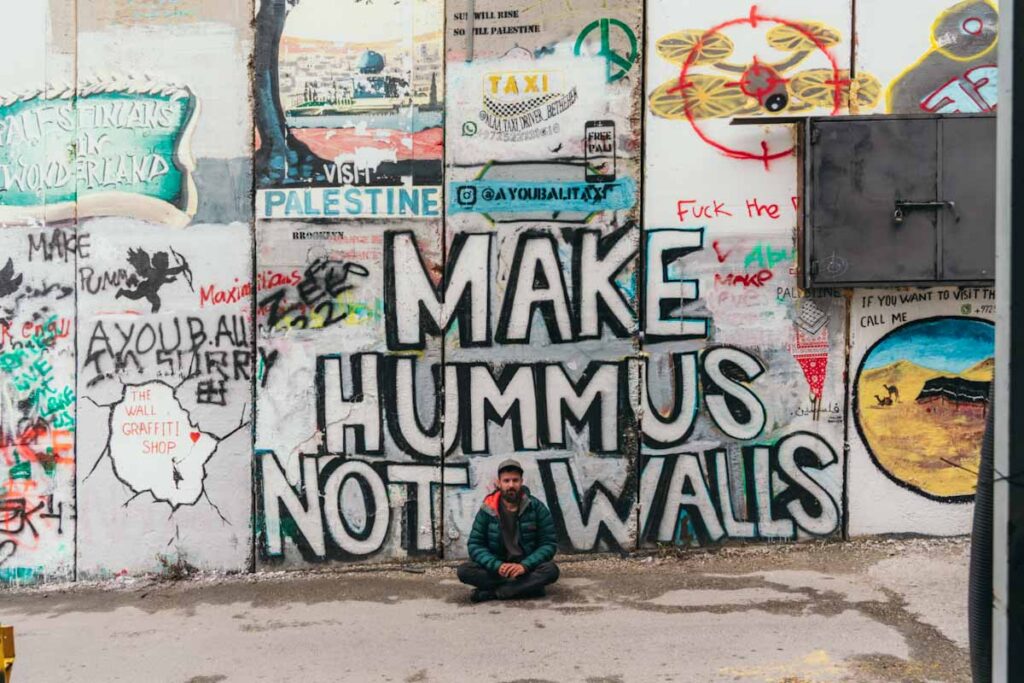
Walled-off Hotel + museum
If there is only one place you should see in Bethlehem, you need to visit the museum inside the Walled Off Hotel. Hands down, this museum was the best we have ever seen, as it’s a good start to understanding the problem between Israel and Palestine.
You can’t take photos inside the museum. But there was (not only) one powerful moment when you walk through the museum and suddenly the phone rings. I came closer and saw the sign: ,,Please, answer the phone” . When I answered the phone, I heard: ,,This is Israeli Defence Forces; you have 5 minutes to leave your house until we blow it away” . I felt sick in my stomach. Is this the life people face here?
Besides the museum, the hotel is stylish inside, with a piano bar, interesting decorations, and occasional live music on Saturdays. If you don’t want to spend the night in a refugee camp, you can stay here. Who would not like to stay in a hotel that claims to have the worst view in the world?
- Opening times of the museum: 11am – 7:30pm
- Entry fee: 20 ILS ($5.5)
Want to stay in the Walled-Off Hotel? Book it here .
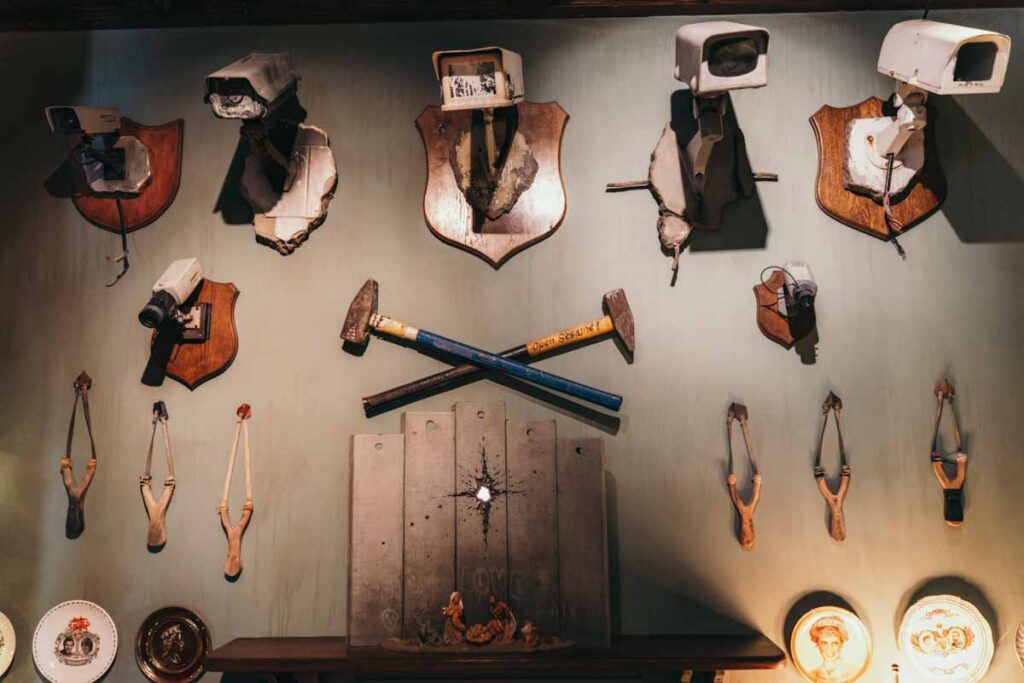
Church of the Nativity
The most important religious site in Bethlehem. This Church is believed to be built on the spot where Jesus was born. To enter the Church, you must bow your head through the tiny Door of Humility built in the Ottoman Era. Once you admire the detailed decoration in the main hall, descend the stairs into the Grotto of the Nativity. It is the place where Jesus was born. When we visited, we even saw a priest walking around the Church. However, expect lots of people to visit this site.
- Opening Hours: 6:30am to 7:30 pm and 6:30am to 6pm in winter.
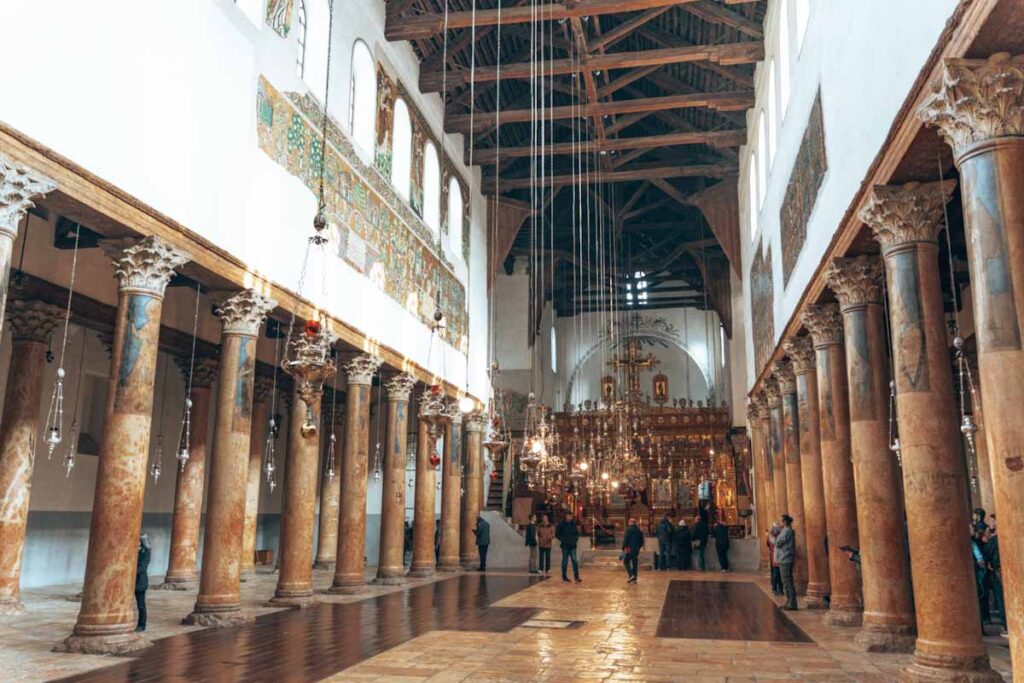
St. Catherine Church
Right next to the Church of the Nativity, there is St. Catherine Church. Visit the underground praying hall and the outside little garden. We liked this Church; very peaceful and atmospheric.
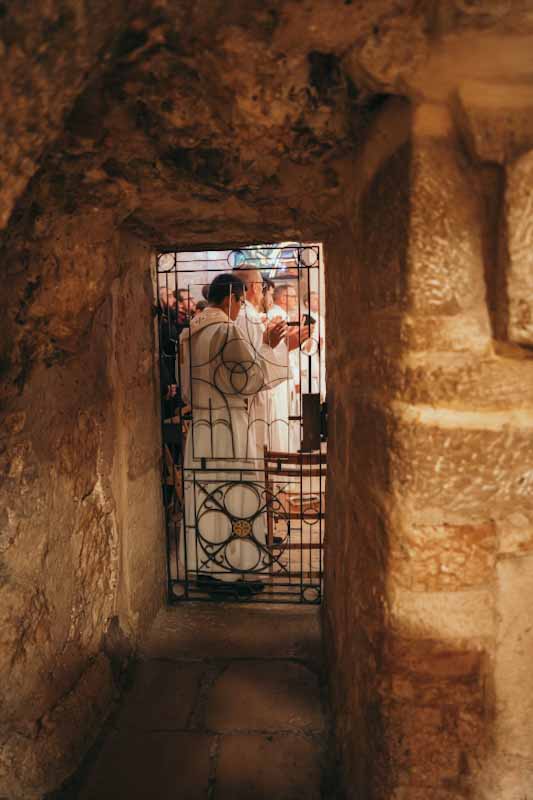
Milk Grotto Chapel
Visitors often overlook this Chapel, but once in the centre, it is just a short walk to visit this beautiful place. It is believed that it is where Mary and Joseph fed their baby, and after the milk dropped on the floor, it turned the red rock into white.
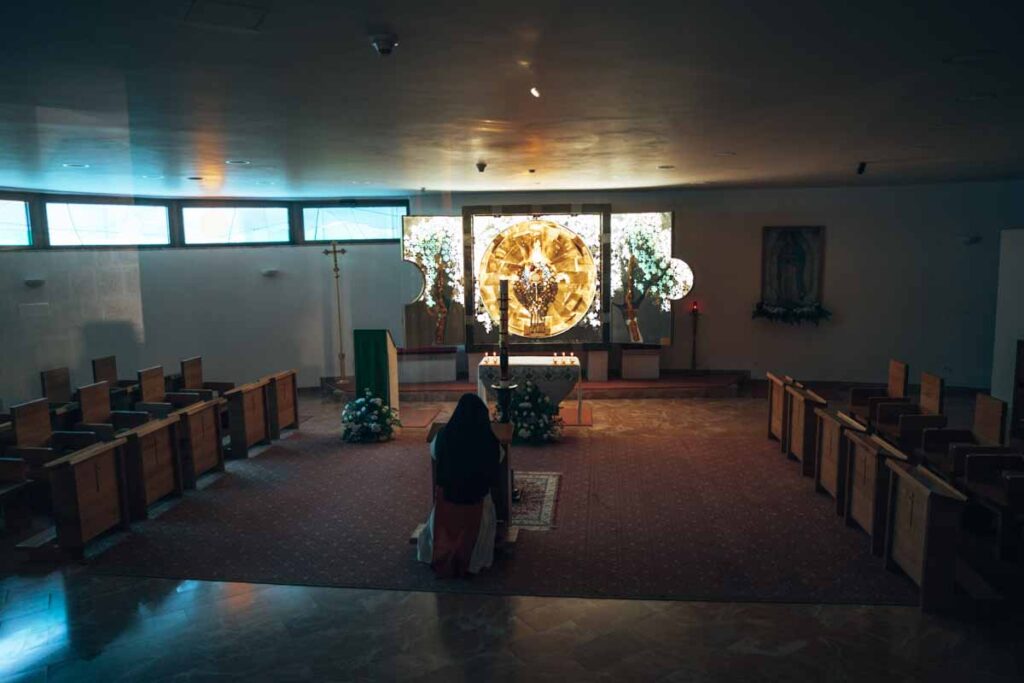
Green Market
The main souq in Bethlehem, you can visit after the Church as it is right in the centre. Here, you will meet very friendly people, have a chat with them, buy some fresh fruit or a small snack and absorb the atmosphere.
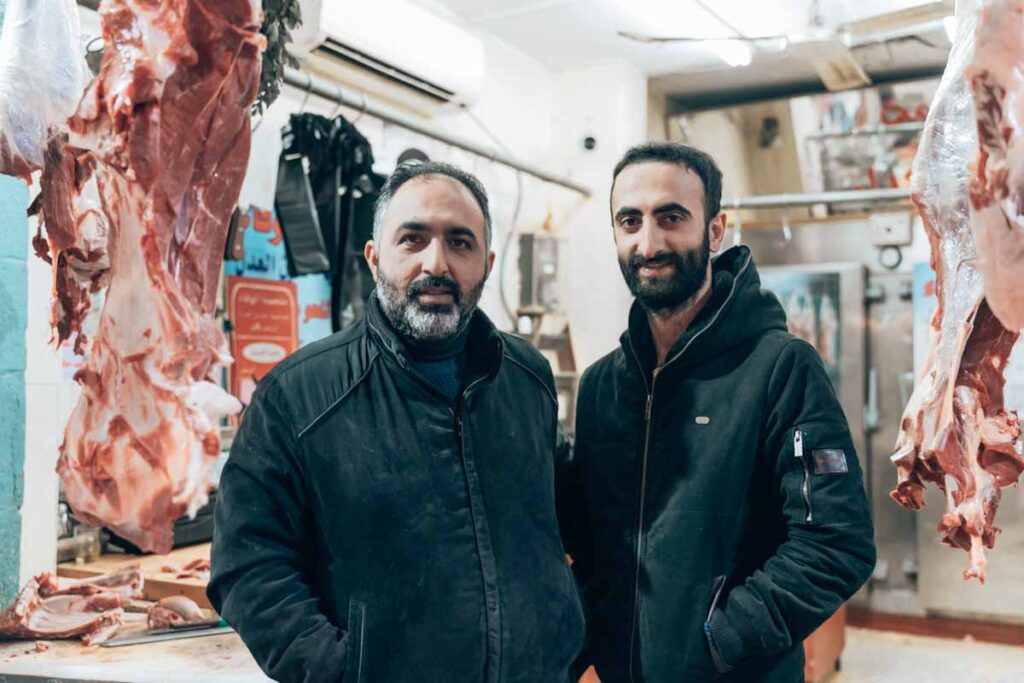
Refugee camps in Bethlehem
Another must and very important thing to experience not only in Bethlehem but the whole of Palestine is to visit refugee camps. There are two camps in Bethlehem. Dheisha and Aida. We visited both independently and spent a night in Dheisha with Ibrahim’s family. It was an unforgettable experience; you got to learn so much and hear the stories that you would never hear in media.
We visited the Aida refugee camp on our second day after we returned from Mar Saba Monastery. We walked through the camp, took some photos and did not experience any issues. People there are very friendly and welcoming, happy to see foreigners coming on their own. Right by the entrance, we were invited into the Car Mechanic shop because as soon as they saw us, they almost yelled with excitement. It was such a warm welcome; we had a nice conversation with a cup of coffee.
Essential reading: How to spend a night in a refugee camp in Palestine.
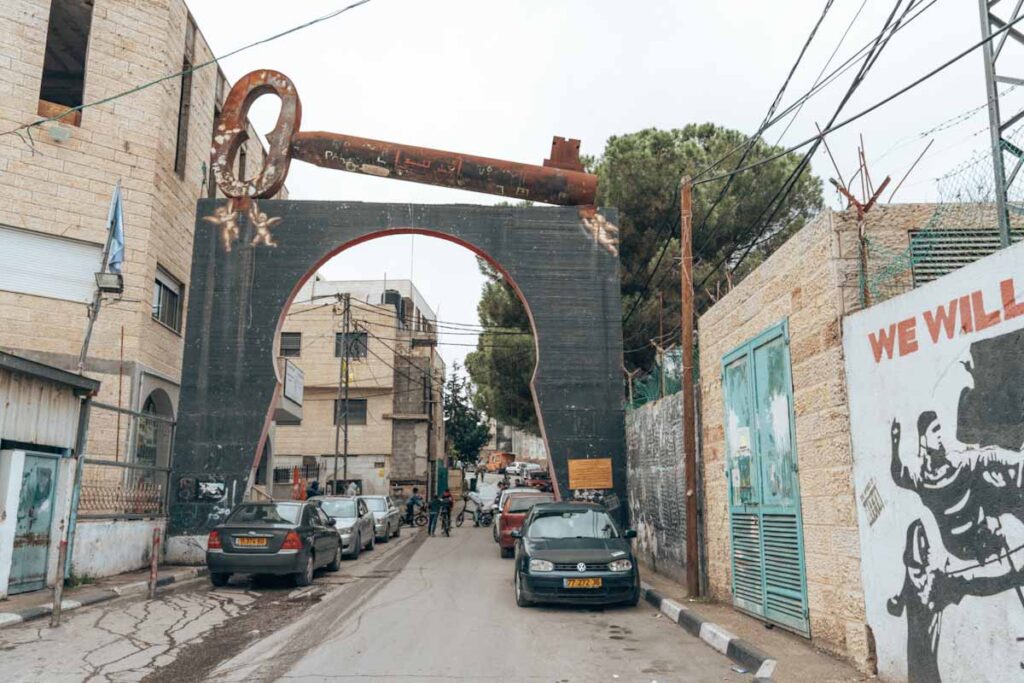
Mar Saba Monastery (Half-day trip)
Mar Saba is a dramatic cliff-clinging monastery half an hour from Bethlehem. It is our favourite place we visited as the monastery, and the surroundings are breathtaking. Women are not permitted inside, but let’s make it clear. It is the outside look over the monastery from the opposite slope that is the main goal of this trip. Men can enter inside and take a tour with one of the monks. When we visited in January, it was open between 9am to 2pm. Once you arrive at the monastery, follow the stairs and trail that leads down the valley. Once there, cross the small bridge over the river and follow the trail that takes you all the way up the slope opposite the monastery. From there, find a spot and the best viewpoints to view the Mar Saba Monastery. When we visited, we were the only ones who hiked on the opposite slope, but surely it is worth it; otherwise, you miss out on the main beauty. It takes only half an hour to get to the other side of the slope. Ensure you have water with you; it is quite warm when the sun shines. On both sides, there is a stall where two brothers sell some small snacks, tea, coffee and water.
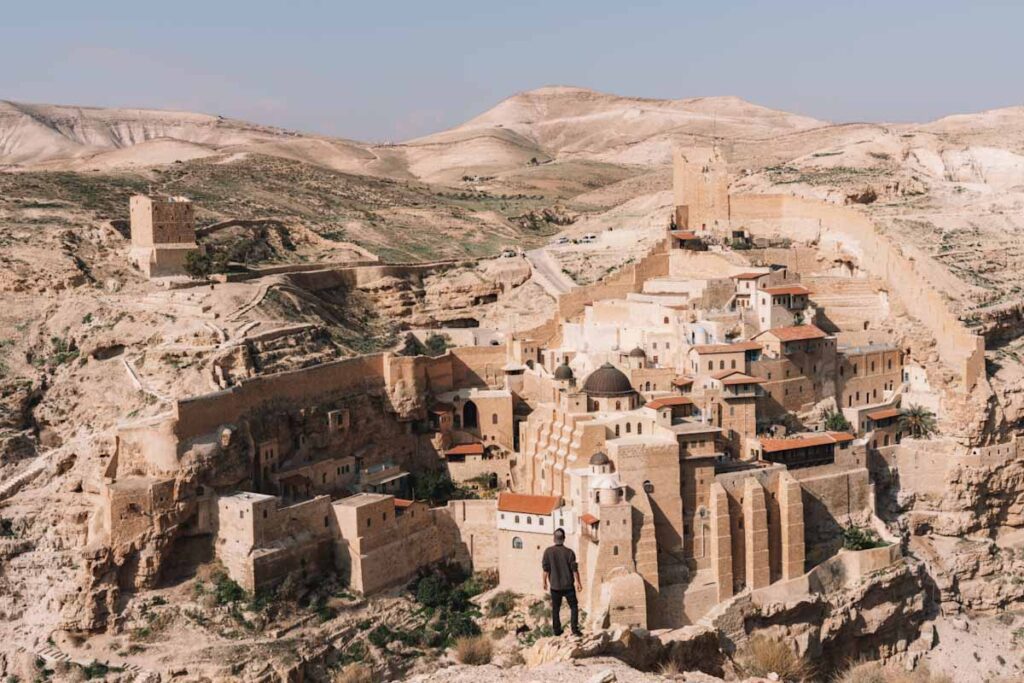
How to get to Mar Saba from Betlehem
Take a shared taxi (yellow minivan) from the central bus station located in the basement of the Bethlehem city mall, where KFC is. You’ll see a lot of yellow minivans waiting there. Search for one that goes to Ubediya. Be aware that some taxi drivers might want to cheat you; they told us that it is dangerous to go alone and that we should go with them, a private taxi for 150 – 200 ILS. We did our research and talked with locals, and we found it very safe and cheap to go independently. Shared taxi costs 5 ILS ($1.4), and the ride takes around 30 minutes, it is 12 km. The shared taxi stop is at the end of the village, by the brown sign pointing the way to Mar Saba.
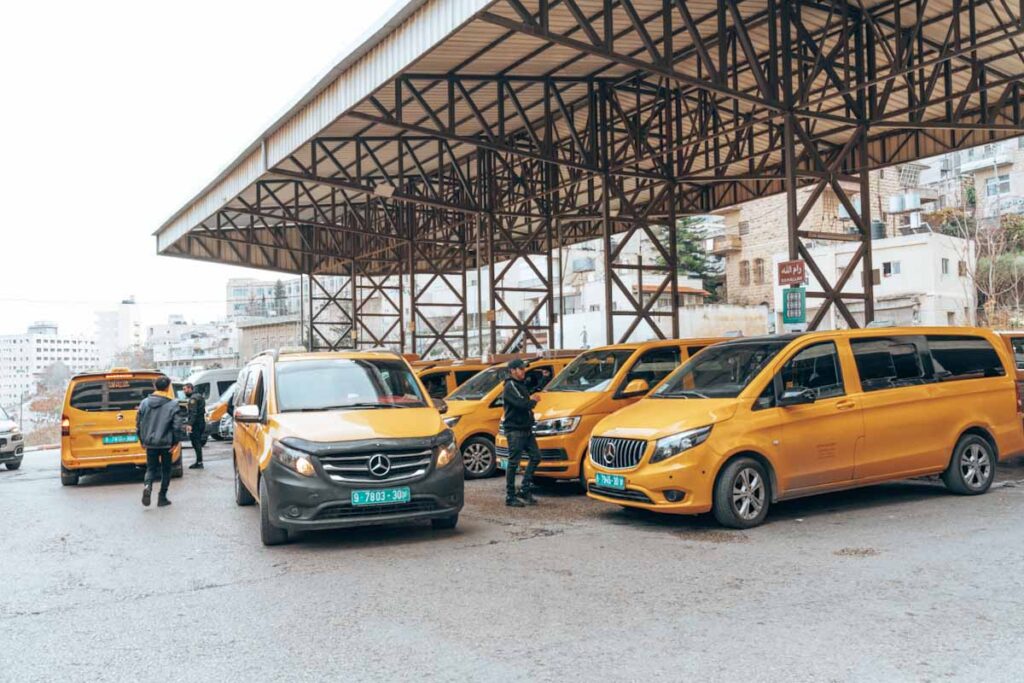
From there, hike down the hill on the road, 4.5 km, until you reach the monastery. In the middle of the way, there is a nice viewpoint. Many taxis and buses with tourists or locals go there every day. You can also hitchhike. We were hiking, and after just a few metres from the shared taxi stop, a taxi with a French tourist stopped and offered us a lift to the monastery for free and we gladly accepted. We stopped at the viewpoint on the way down.
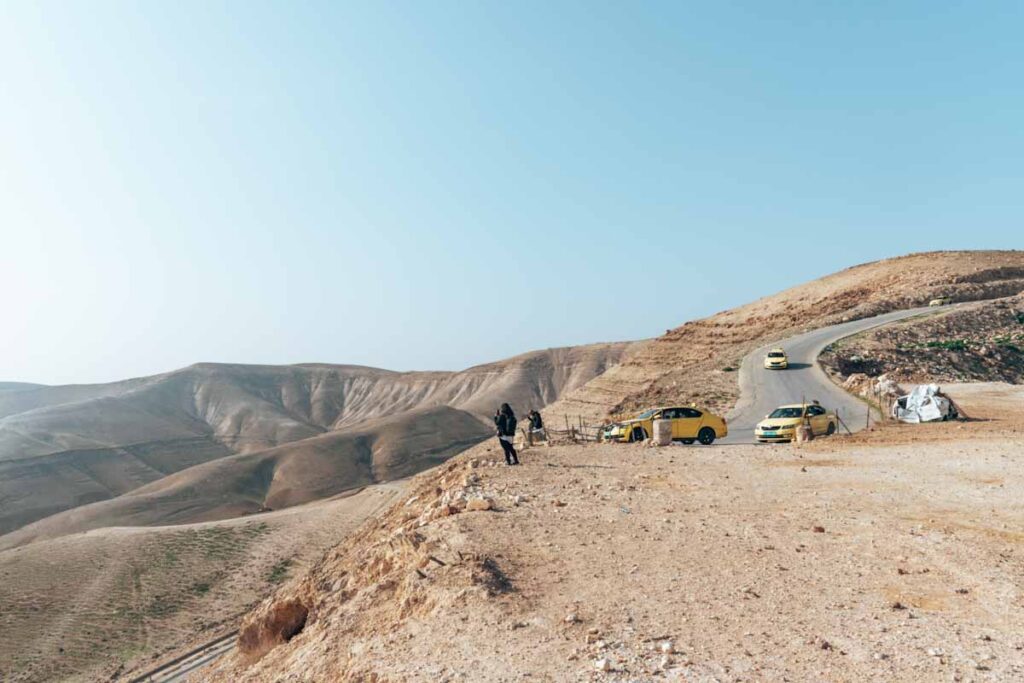
To go back, it’s the same process. Ask someone to take you up the hill, where the shared taxi dropped you. Or hike, but note this part is only uphill four and a half km. It will take around one and a half hours to hike, and it is a safe area. There is a local guy selling tea & snacks, and he offered to take us uphill for 19 ILS ($5.3). Since there were no more cars at the monastery when we finished exploring, we accepted his offer, as simply it was a faster and easier solution than hiking 4.5 km uphill. After 10 minutes ride, we arrived exactly when the shared taxi arrived, and we made our way back to Bethlehem from the same spot where they had dropped us off earlier (5 ILS).
Is it safe to go alone? Yes. We felt perfectly safe and comfortable. You basically just walk down the hill from Ubediya town; you have almost all the way the monastery in sight. There is traffic daily, either tour buses, many taxis and local people coming. Chances are that someone will offer you a lift, or if you feel like you can ask them & hitchhike.
- Opening times: 9am – 2pm
- Entry fee: Free
- Total time from leaving Bethlehem and being back to Bethlehem: 3 hours (9-noon)
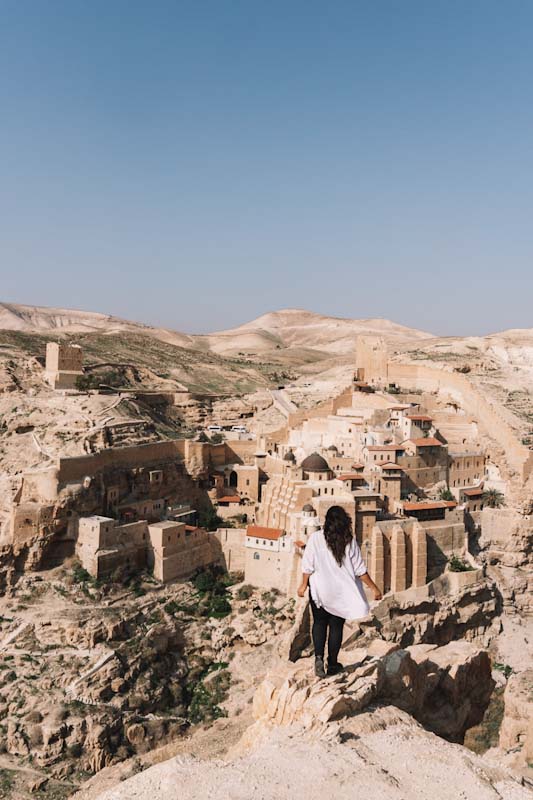
HOW TO GET TO BETHLEHEM
From Jerusalem, we took bus #234 (5.5 ILS, 30 minutes) from HaNevi’im Terminal from Damascus Gate, which takes you to Checkpoint 300, which we crossed on foot. There is no control if you’re crossing in the direction from Jerusalem to Bethlehem, so it is very fast and easy to get into Palestine.
Another option is to take bus #231, which actually crosses into Bethlehem, but it takes 1 hour, and we felt like it is better to experience and cross Checkpoint 300 ourselves.
TIP: As soon as you get to Israel, get a Rav-Kav card for public transport. You can top it up in kiosks or online through the Rav-Kav Online app and then use it for buses in Jerusalem.
HOW TO GET AROUND BETHLEHEM
Taxi or shared taxi is the common way of transportation, and it is quite cheap. Yellow taxi with black sides is a shared taxi , and you can expect to pay 3 ILS for the ride in the city or to Dheisha and Aida refugee camps. If the taxi is only yellow, it means it is private, and the charge will be higher. You can expect to pay around 15 – 20 ILS for a private ride.
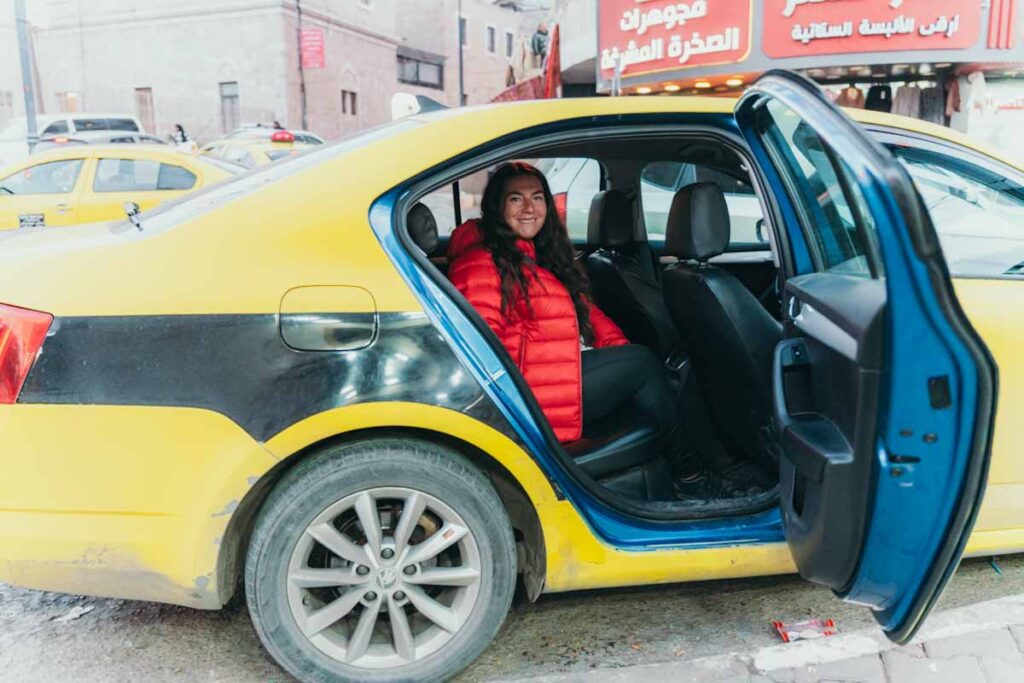
WHERE TO EAT IN BETHLEHEM
Afteem restaurant .
This restaurant is located on the corner opposite the Church of the Nativity. They serve delicious Masabacha, which is a warm hummus with whole chickpeas. It was also our go-to restaurant for falafel sandwiches. Very tasty.
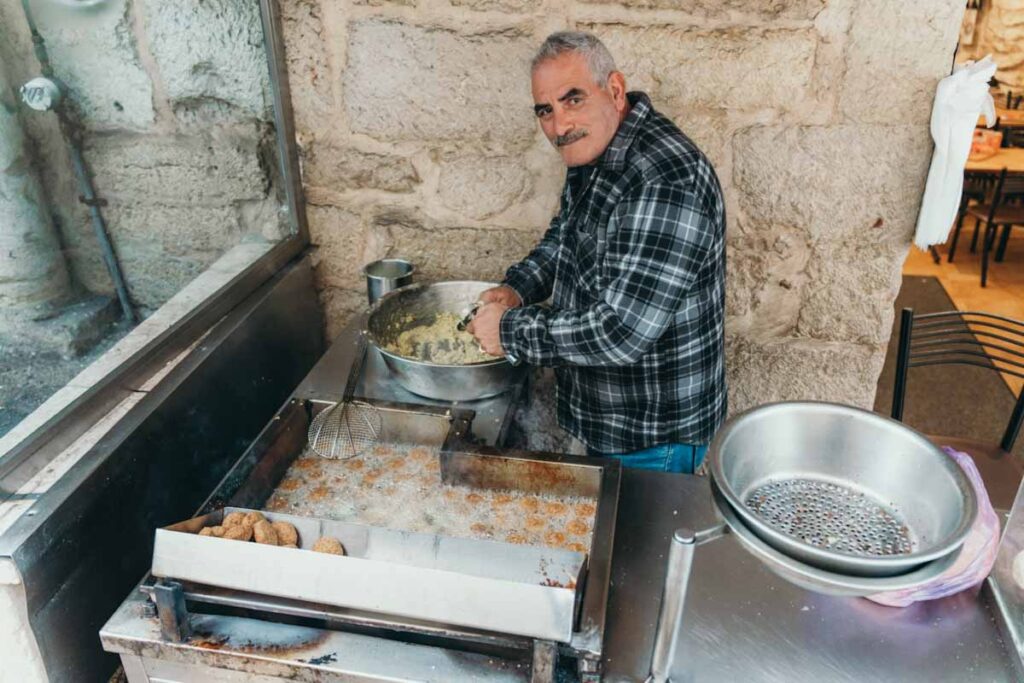
Stars Bucks
Located across Manger Sq, this cafe serves delicious coffee and snacks. Not talking about its name.
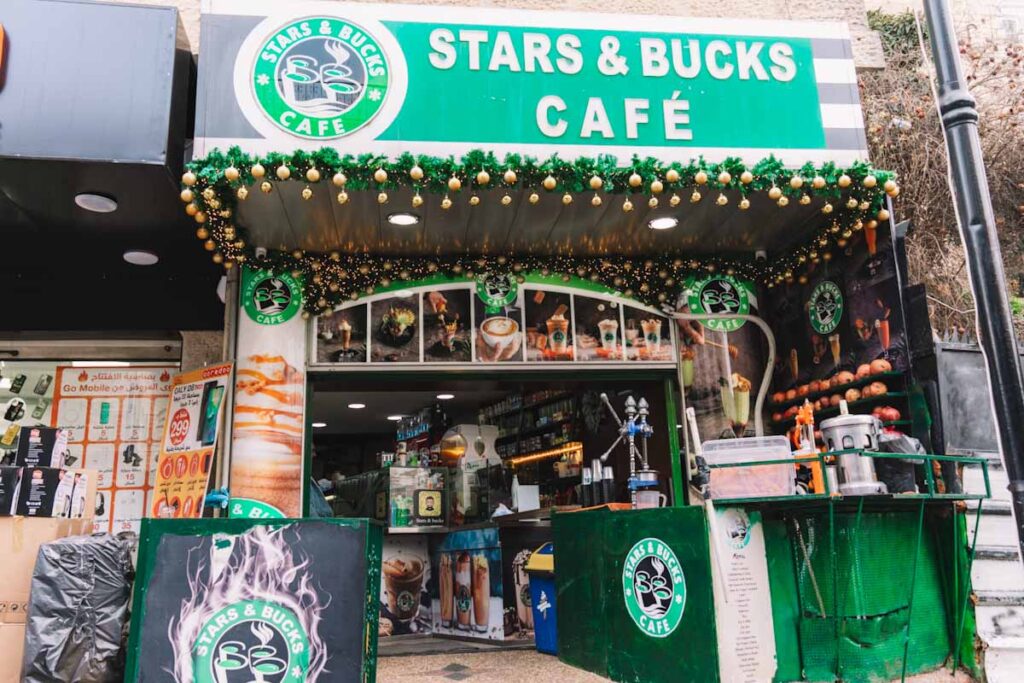
Coffee stalls on the square
You will see some coffee stalls on the square in front of the Church of the Nativity. Getting coffee, sitting on the bench and enjoying the atmosphere is worth it. Coffee costs only 1 ILS ($ 0.3) you won’t find cheaper.
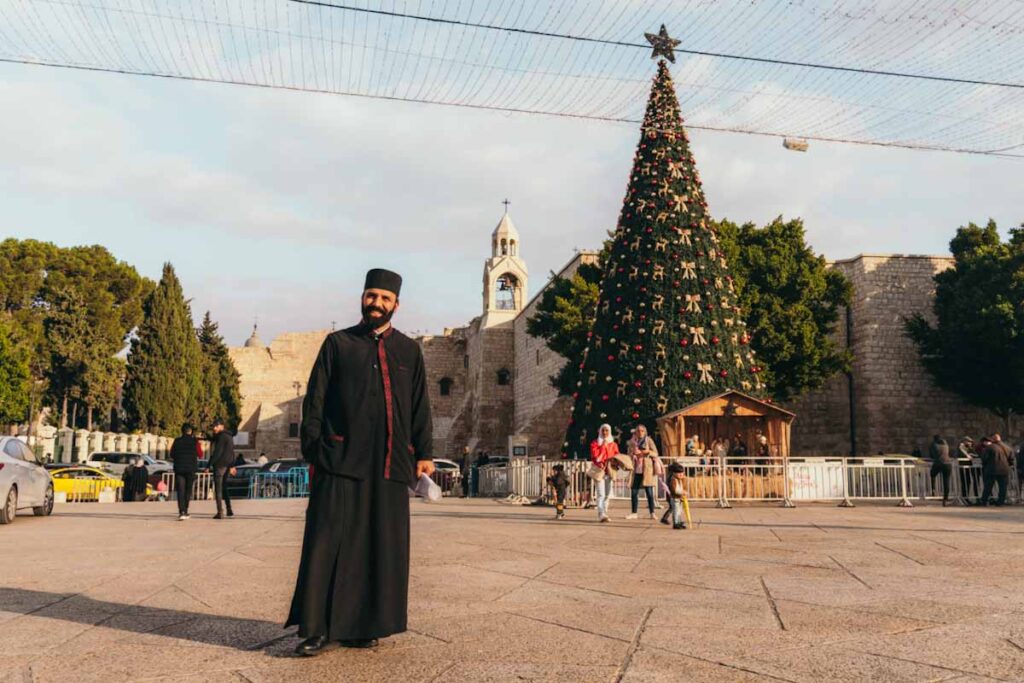
WHERE TO STAY IN BETHLEHEM
Dheisha Refugee Camp I Stay with a family in Dheisha refugee camp.
Walled Off Hotel I Stay here for the worst view in the world. This hotel is located right next to the Israeli’s separation wall.
DAY 4-5: HEBRON
Despite the fact that Hebron is the most problematic city in Palestine, it is a rich cultural and handicraft centre, and it is one of the most interesting places to visit in Palestine. What is the problem in Hebron? The city is divided into two areas H1: the area under Palestinian control, and H2: the area under Israeli control. And as if this is not enough, Jewish settlements are built within the old city. The city is divided by many checkpoints, and Palestinians can not walk on certain streets. The tension in this city is high, to say at least. You won’t meet many independent travellers here; we met only two other independent travellers; others came with a tour. The best thing to see in Hebron is visiting the Mosque and Cave of the Patriarchs, a holy place for Muslims and Jews and inside, it is separated by bulletproof glass.
Expect going through many checkpoints in Hebron, have your ID ready and be prepared for questions such as your nationality, why you are coming, and your religion. I already described it in the Checkpoints section.
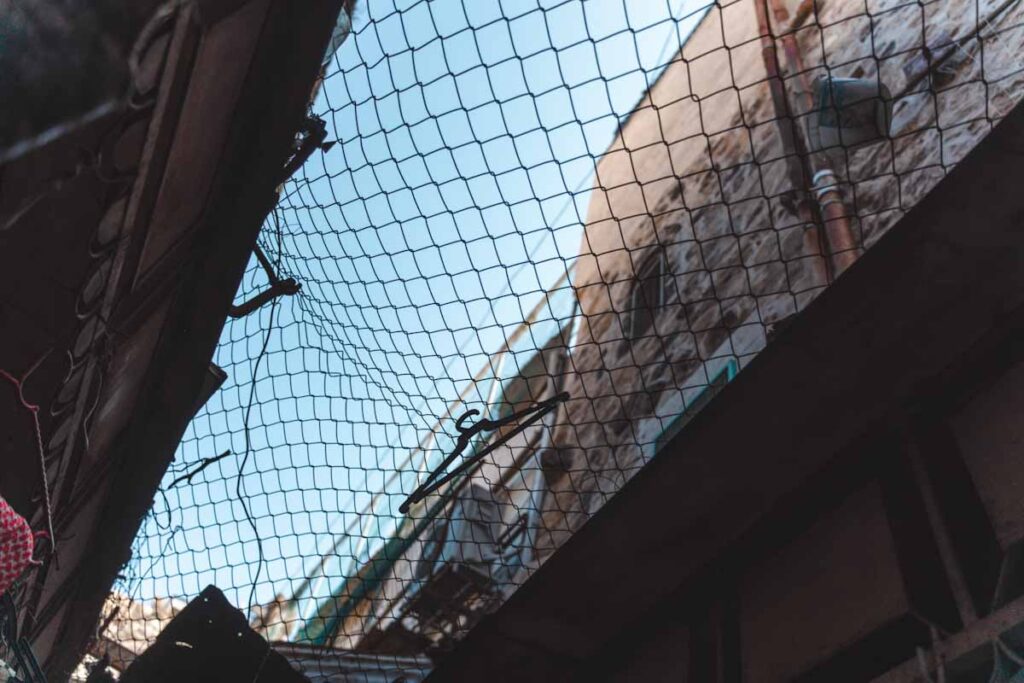
BEST THINGS TO SEE IN HEBRON
Area h1: palestine territory: market.
The main place to visit is the market that used to be bustling with life once upon a time. Today, some shops are open, but it is just a short part. The market has a fence from above to protect people from Jewish settlers who throw trash and worse at Palestinians. You can still see lots of garbage, church and different items thrown at people and stuck in the fence.
Actually, the Friends hostel, where we stayed, is located inside this market and to get inside you go through one of the shops. You can buy clothes, fruit and vegetables in the market, especially lots of colourful pickled veggies and olives. Some art shops are open, and it was a pleasure to talk with some shop owners about the situation and their opinion about the future of Palestinians. You will see many barriers on sidewalks that Israelis have placed.
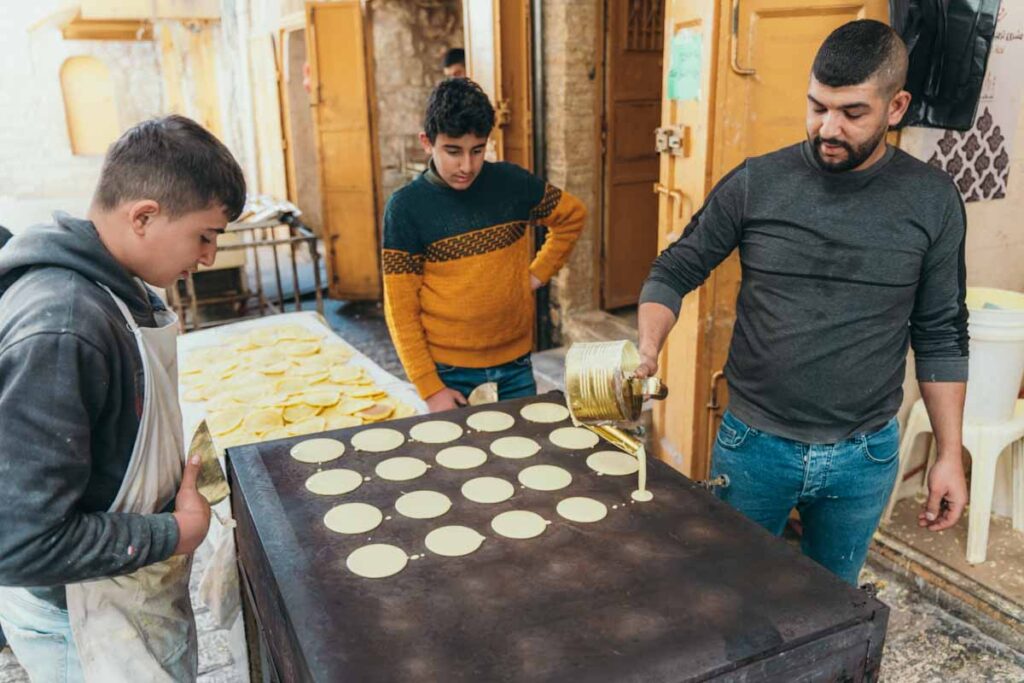
Tomb of the Patriarchs and Ibrahimi Mosque
An important holy place for both Muslims and Jews who believe here is the final resting place of Ibrahim. One building. Two separate entrances. Two checkpoints from each side to enter. The security and amount of military is insane. This must be one of the most controlled places in Palestine. We entered both sides and seeing two completely opposite worlds was interesting. In the middle of the building is placed the tomb, which is protected with bulletproof glass, as you literally see from the mosque to the synagogue.
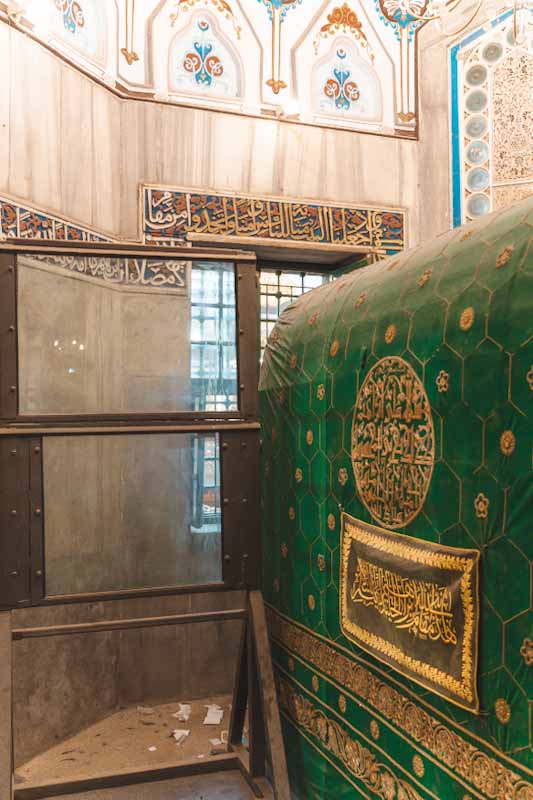
Area H2: Israeli Territory
From the Ibrahimi mosque, you can continue your way to Area H2, which is hugely protected by the Israeli military. We walked through the deserted city, and in a 1 km walk, we were stopped at least six times. They checked our ID and then let us go. You can see lots of military presence here, and deserted streets with tens of shops closed down.
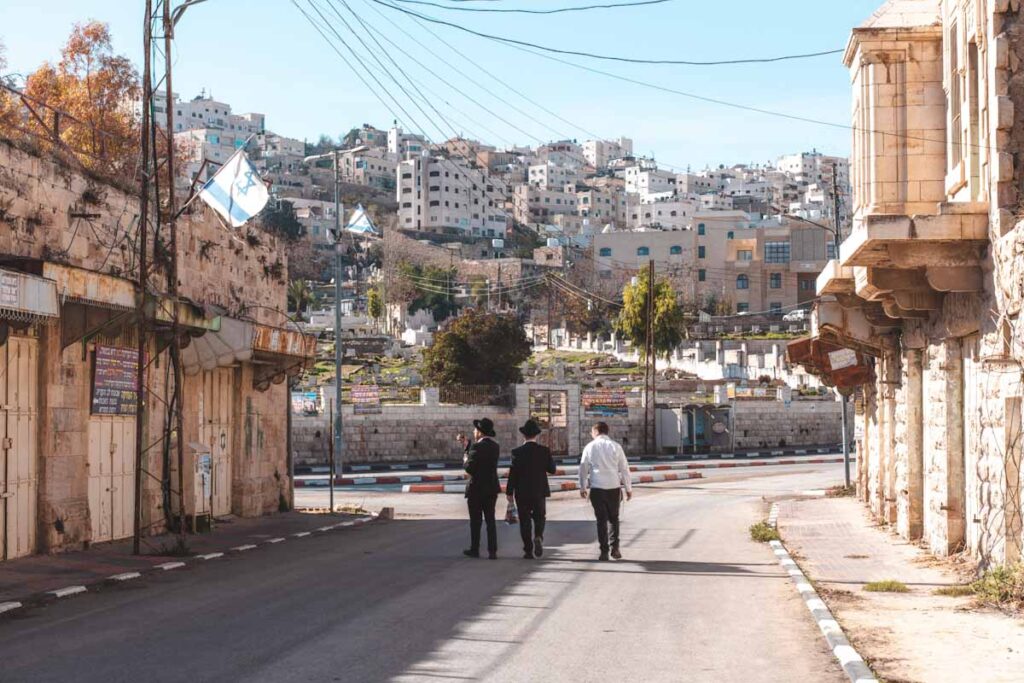
Herbawi Kuffiya factory
Everybody knows the Palestinian scarf; this factory is the first Kuffiya factory in Palestine. The entry is free; you can see how the scarf is made. There is also a little shop where you can buy a scarf. We bought ours there.
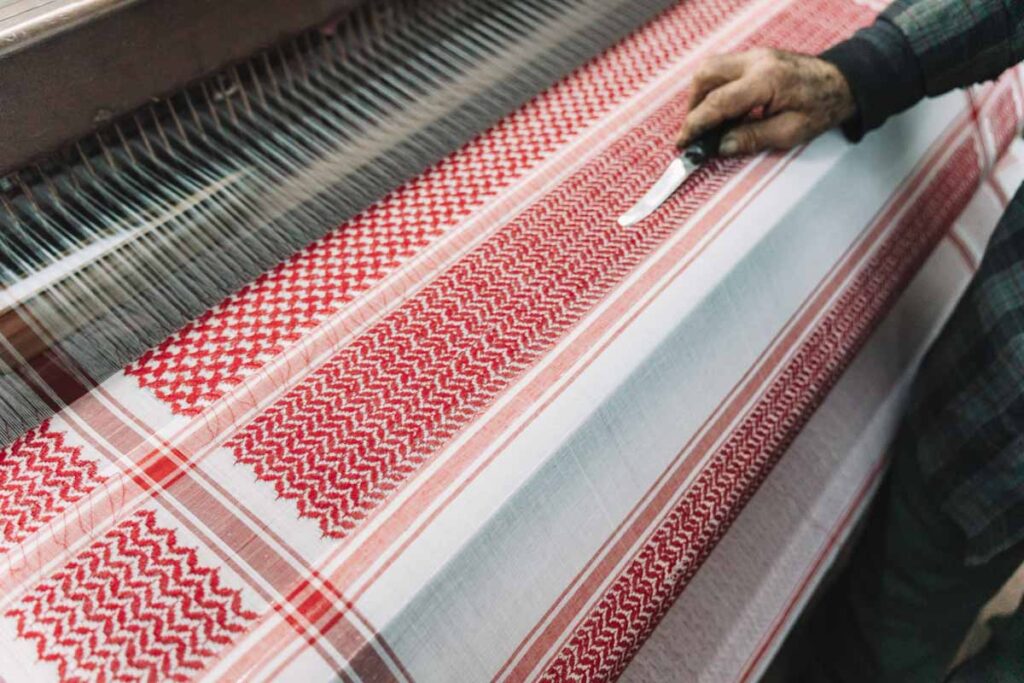
Glass Factory
Another souvenir we brought from Palestine is a Christmas decoration made in the Glass Factory. You can watch here how the glass is made, and there is a shop with hundreds of different glass products.
Sidr family
You can visit the Sidr family, one of many families living in the old town who was offered millions of $ to leave their house to make space for Jewish settlers. They refused. They welcome people from outside to come and talk about the situation. Read more in our separate post about Hebron.
Essential reading: The ultimate guide to visiting Hebron. The troubled city in Palestine. (Coming soon)

HOW TO GET TO HEBRON FROM BETHLEHEM
If you stayed with Ibrahim in the Dheisha Refugee camp in Bethlehem, just walk back to the main street and wait for the shared taxi van that goes directly to Hebron. It cost 10 ILS ($2.7); this is what we did. Otherwise, take a shared yellow and black taxi for 3 ILS, which takes you close to the Shepherd Hotel, which is the station for shared taxis. There, find the one that goes to Hebron.
HOW TO GET AROUND HEBRON
You can easily walk everywhere. Or catch a taxi.
WHERE TO EAT IN HEBRON
Who would guess that Hebron is the ultimate foodie destination? Everywhere you go, there is delicious food. A falafel sandwich typically costs around 4 ILS. Try also Palestinian chocolate; many stores in Hebron sell many kinds of small chocolate.
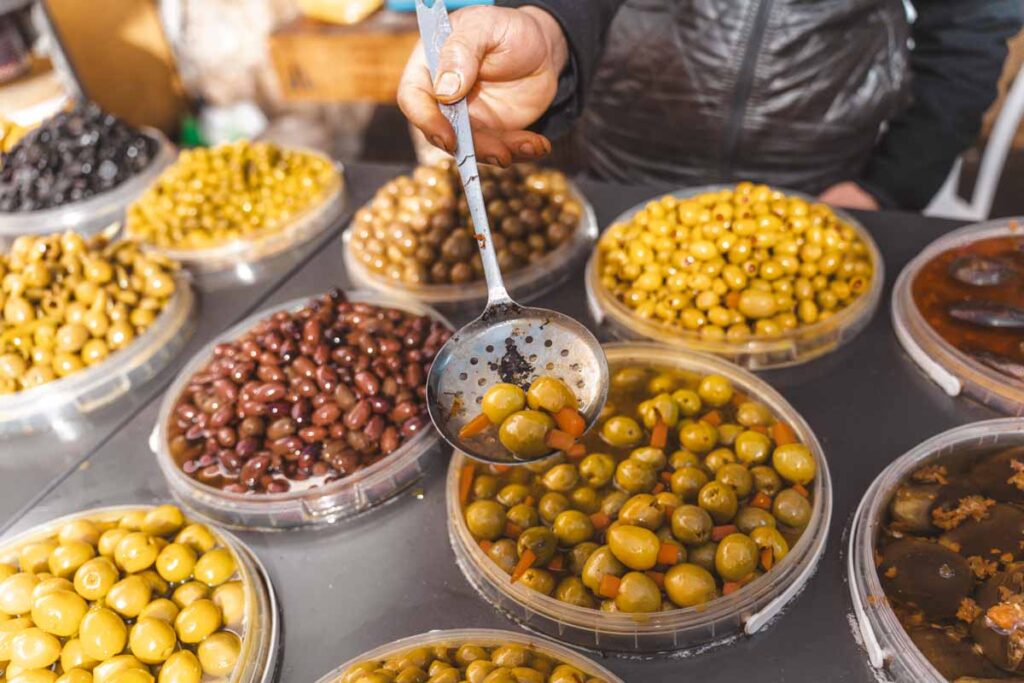
WHERE TO STAY IN HEBRON
Friends Hostel Area B I The best and most welcoming place to stay in Palestine. Akram really makes sure you feel well; his place is full of useful maps and recommendations on what to visit. He made sure he sat down for tea with us, let us ask as many questions about the situation in Hebron and Palestine as we wanted, and explained everything passionately. This hostel is located right in the centre so you can walk from here everywhere.
You can also stay in the refugee camp at Hebron Hope Guesthouse.
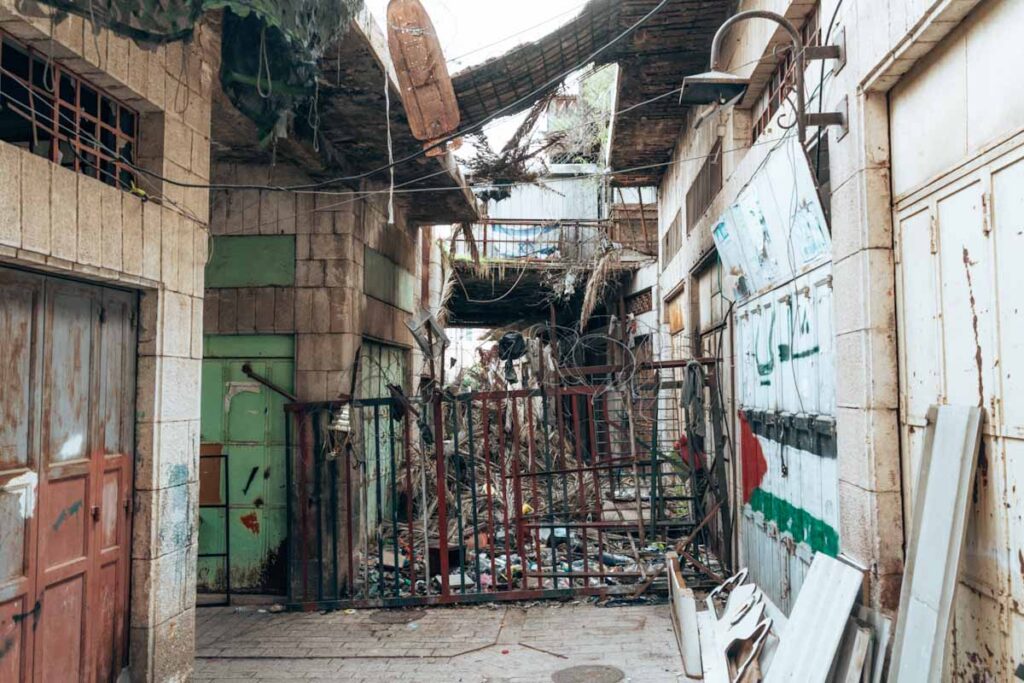
DAY 6-7: JERICHO
Jericho is one of the world’s oldest continuously inhabited cities and the hottest area in Palestine. Jericho doesn’t have the old historical centre. Still, it is the monasteries carved into mountains, archaeological sights and close proximity to the Dead Sea that make it an attractive destination for foreign and local tourists. Two days are sufficient for the places below; if you want to visit the Dead Sea, you need to add one more day. On day 1, we started exploring late at 1pm by visiting Hisham’s Palace, Mount of Temptation and Jericho City Centre. On day 2, we hiked to St. George Monastery and explored the Jericho city and refugee camp where we stayed. I can not forget to mention the people of Jericho, who are amongst the friendliest we have met in Palestine. Many times we were invited for a coffee and friendly chat.
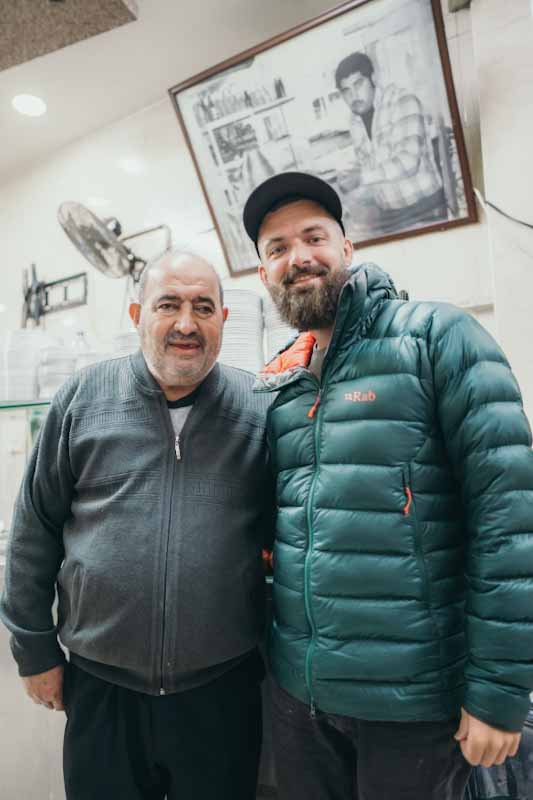
BEST THINGS TO SEE IN JERICHO
Hisham palace .
We arrived in Jericho around 1pm, and the first thing we visited was Hisham’s Palace. We took a taxi for 10 ILS from the city centre. But you can walk, it would take around 40 minutes. After you get inside the area, watch the 10 minutes documentary explaining the history of Hisham Palace. It is an Islamic ruin with one of the most well-preserved mosaics. Search for the Tree of Life, the most famous mosaic in the palace.
- Opening times for Hisham Palace: 8am – 6pm
- Entry fee: 10 ILS
- Time: 45 minutes
How to get to Hishams palace
You can easily walk from the city centre to Hisham’s palace. It is roughly 3 km and 40 minutes on flat terrain through the city. Or take a taxi for 10 ILS ($2.7).
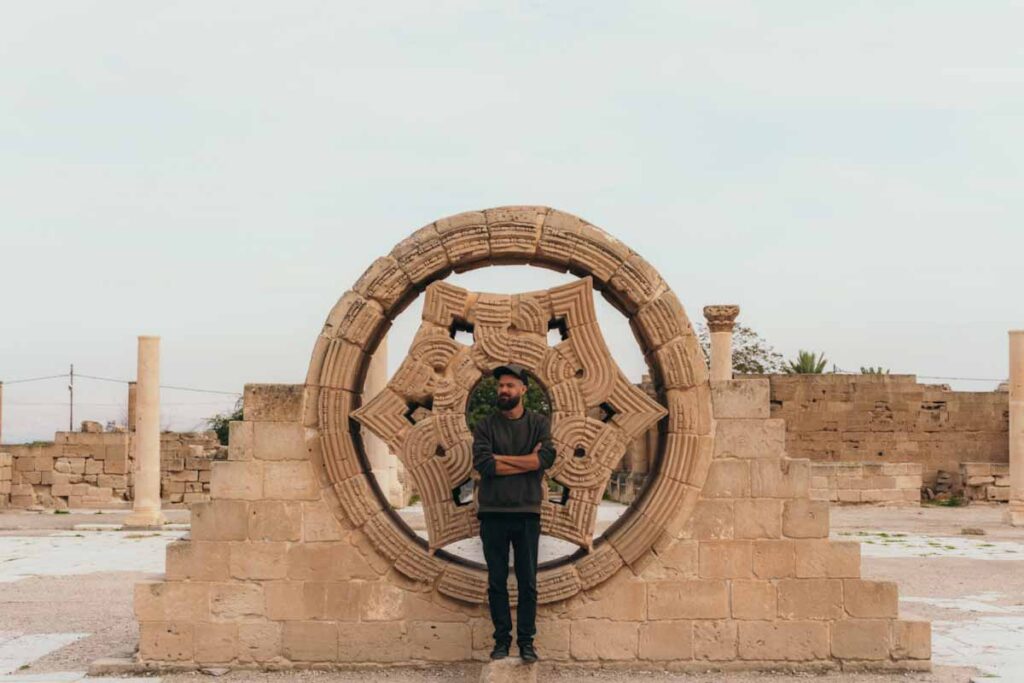
Mount of Temptation (Deir al Krntl)
This Monastery is carved high in the mountain into the cliff, which is totally impressive. I’d say one of the most beautiful sights in Palestine. Unfortunately, when we came, it was closed. It means they lock the gate, and you can not get inside. However, you can still have a nice view from the area around you and take a small hike that takes you under the Monastery, where you can see a lot of caves and the Monastery from below. The Monastery is built on the spot where Jesus resisted Satan after 40 days of fasting. You get amazing views over the Dead Sea and the agricultural area of Jericho.
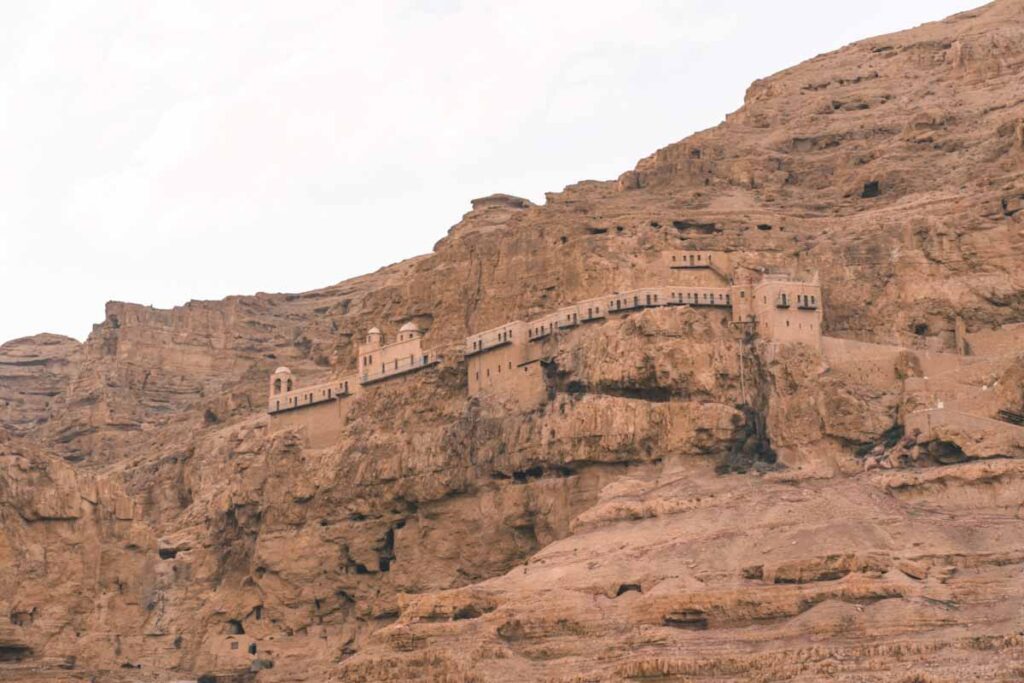
How to get to Mount of Temptation
From Hisham’s Palace, it makes sense to head to the Mount of Temptation, as it’s in the same area, only 4.5 km away. It’s the Monastery carved into the rock on the opposite hill. We took a taxi for 15 ILS to reach the bottom of the Mount of Temptation. It takes 15 minutes to hike on the gravel path to reach the top. It’s a pretty easy short hike; you see the Monastery right above you all the time. If you go from the city centre, just take a taxi for the same price.
After we were done exploring, we hiked down the mountain back to the road and saw a shared taxi coming. We asked the driver if he went into the centre and he pointed that we can jump in. So we did. We showed him where we wanted to go – to the Jericho centre, and he dropped us off there for 3 ILS. Otherwise, you can walk back to the main road and catch any shared or private taxis passing by.
Another option to reach the Mount of Temptation is to go by cable car, which costs 60 ILS. A big restaurant is on the top where the cable car stops, just a few metres from the entrance.
- Opening times: Mo, Tu, We, Th, Sat: 9-15:30, Sun: 10-15, Friday: Closed
- Entry fee: free
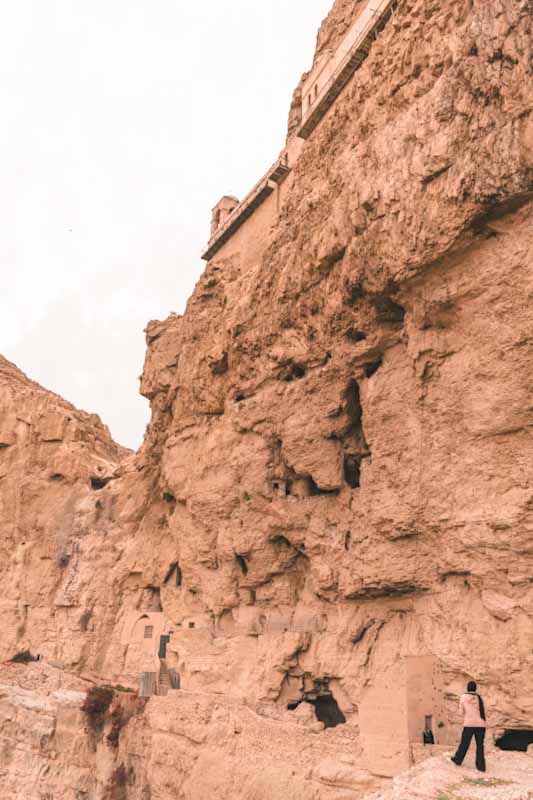
St. George Monastery
Another monastery carved into the cliff. You get a fantastic view from the upper viewpoint. Be prepared for many locals pushing you to take a donkey ride down to the Monastery. Apparently, beautiful paintings are inside the chapel, and you can see parts of the original mosaic floors.
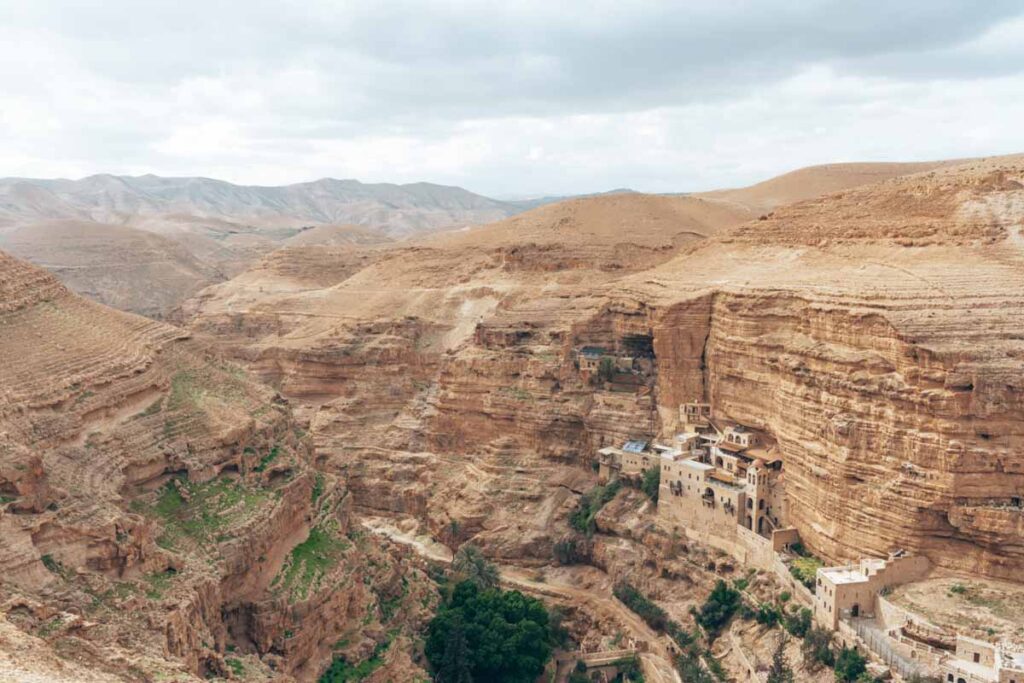
How to get to St. George Monastery from Jericho
Reaching the Monastery is straightforward. From Jericho city centre, it’s 6 km to reach the Monastery. You should open Maps.me while reading this description, as it will be easier to understand. From the city centre (Mount 41 hostel), walk or take a taxi to Wadi Al Qelt hostel – it’s 2,5 km through the city and along the road.
When we walked this way, after the roundabout towards the Wadi Al Qelt Hostel, the car with two friendly locals stopped and offered us a ride for free to the Monastery. Which was super nice, so you can also try to hitchhike; locals in Jericho are very friendly.
Ok, if this won’t be your case, the way is following. There are two ways from Wadi Al Qelt Hostel. The first one is to follow the road for cars, which will take you to the Monastery. It’s a steep uphill road. This way, you turn up at the Monastery’s viewpoint (the most beautiful one). You can also take a taxi from Jericho centre to this viewpoint; when we asked around, the lowest price was 10 ILS per person. To reach the Monastery, you just walk from the viewpoint down the steep road; it takes maybe 10-15 minutes.
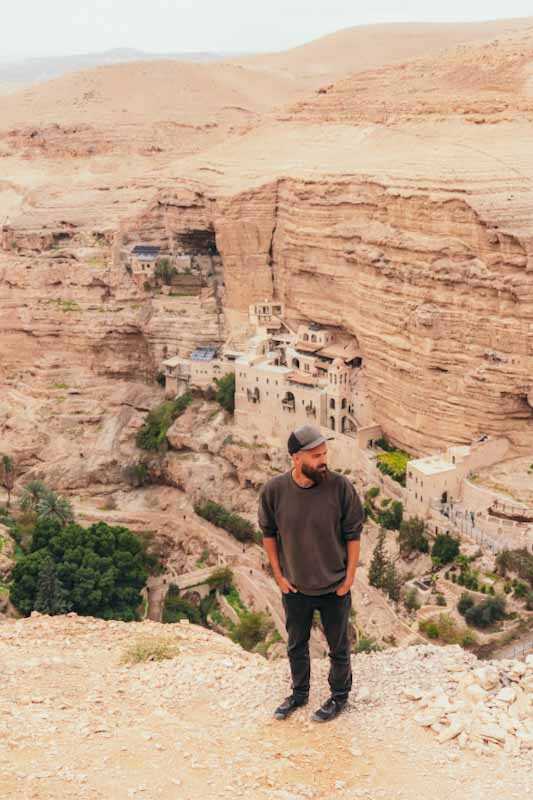
Second option: Little bit before Wadi Al Qelt hostel, there is a brown sign on your right that says ,,Herod’s Palace”. Turn right. After you cross the bridge, turn left and follow blue or red signs that will take you through the valley, through the beautiful scenery to the Monastery. It takes roughly 1 hour and 15 minutes through this hiking trail. The first part is uphill, and the rest is more or less flat. This way, you will appear directly by the Monastery. To get to the viewpoint, it’s a very steep hill.
Therefore we recommend you go the other way around (like we did). Walk along the road for cars to get to the top viewpoint (or take a taxi), then check the viewpoint and hike down to the Monastery to explore. After you’re done, walk back to the city through the hiking trail. Btw, the hike through the valley was wonderful; we enjoyed the scenery very much and met many marmots. Bear in mind that this hike goes through the valley, and we were the only people on the trail. It’s a hiking trail, and only a few people actually do it. However, we enjoyed the views, and the valley was stunning. After the hike, we returned to the road close to Wadi Al Qelt hostel by the brown sign described above. From here, it is roughly 2,5km back to the centre. We took a taxi for 15 ILS.
- Opening times of St. George Monastery: 9-13, but when we arrived at 12:20, they had already closed
- Entry fee: Free
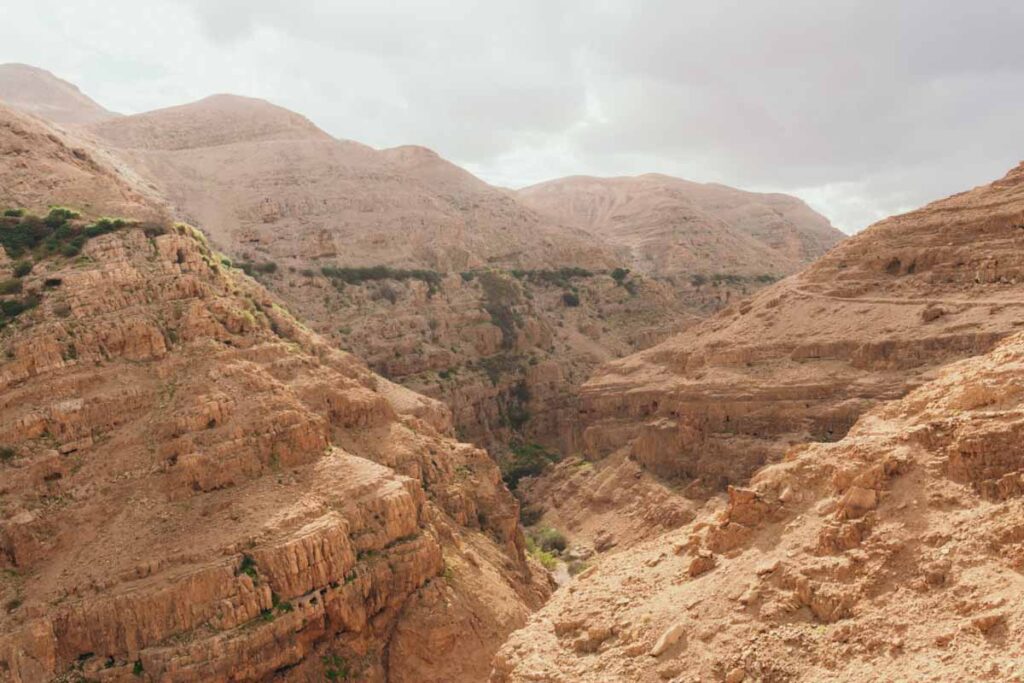
HOW TO GET TO JERICHO FROM HEBRON
Take a shared taxi from this location. You can also find shared taxis to Ramallah and other locations from here.
We took a direct shared taxi to Jericho for 30 ILS. The ride took 1 hour and a half. Be careful; some taxi drivers are very sneaky and wanted us to go to the wrong location just to get money from us. Luckily other taxi drivers teamed up and took us to the right car to Jericho. The second option is to take a shared taxi to Al-Eizariya (20 ILS) and change there for another shared taxi to Jericho (10 ILS).
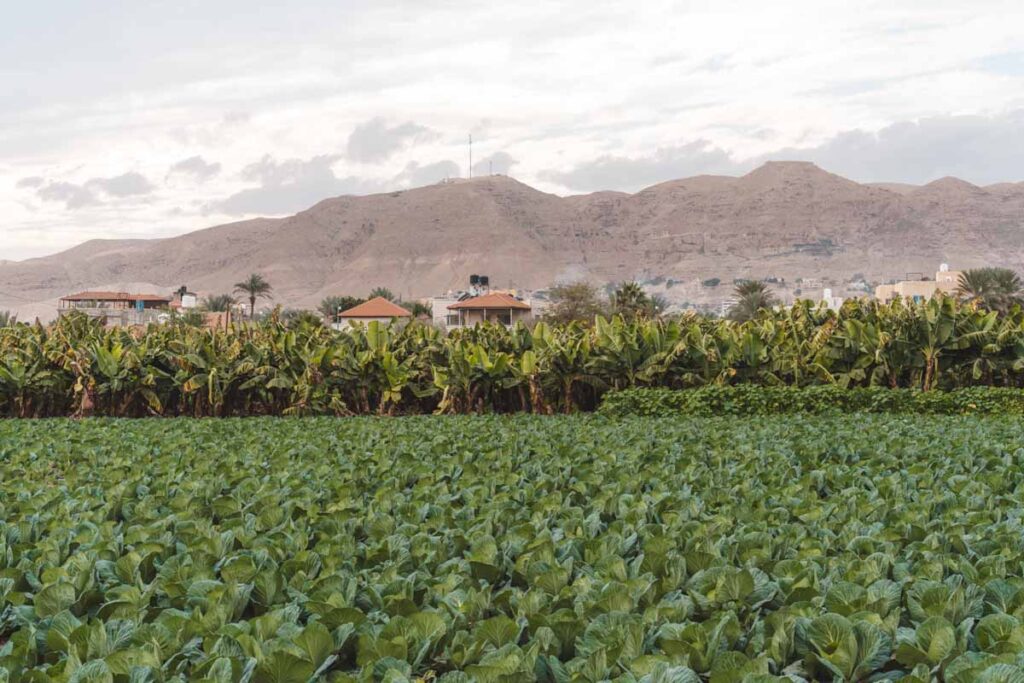
HOW TO GET AROUND JERICHO
If you stay in Jericho refugee camp, like us, reaching the city centre is around 3 km. The good thing is a shared taxi stops in front of the Sami Hostel , where we stayed and for 3 ILS goes to Jericho centre. This shared taxi runs very often, so it is not a problem. Once in the centre, you can easily walk almost everywhere.
Prices of shared taxis in Jericho
- Jericho Centre – Hisham Palace: 10 ILS
- Jericho Centre – Mount Temptation: 20 ILS
- Jericho Centre – St. George Monastery: 15 ILS
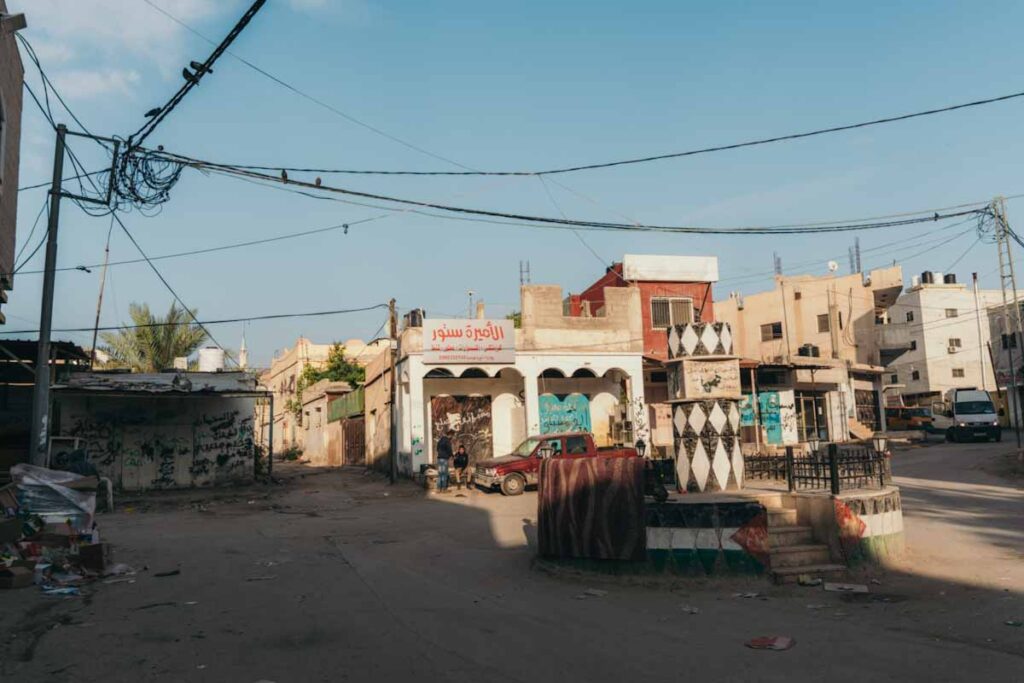
WHERE TO EAT IN JERICHO
Restaurants in the city centre (roundabout by Mount 41 hostel) are very overpriced and cheat customers by serving small portions. If you go a bit further away, you’ll find good local eateries.
Abu Feras restaurant – our favourite place to go. Falafel or hummus 5 ILS. They also have shawarma, Palestinian food (rice, small dishes and chicken) and more. It’s across the Bank of Palestine in this location.
مخبزومعجناتالشام – if you want a change from all the typical Middle Eastern food, head to this bakery , as this bustling place serves the best pastries we had in a while. Pizzas, different kinds of filled pastries. Super yummy. Prices range from 3-10 ILS.
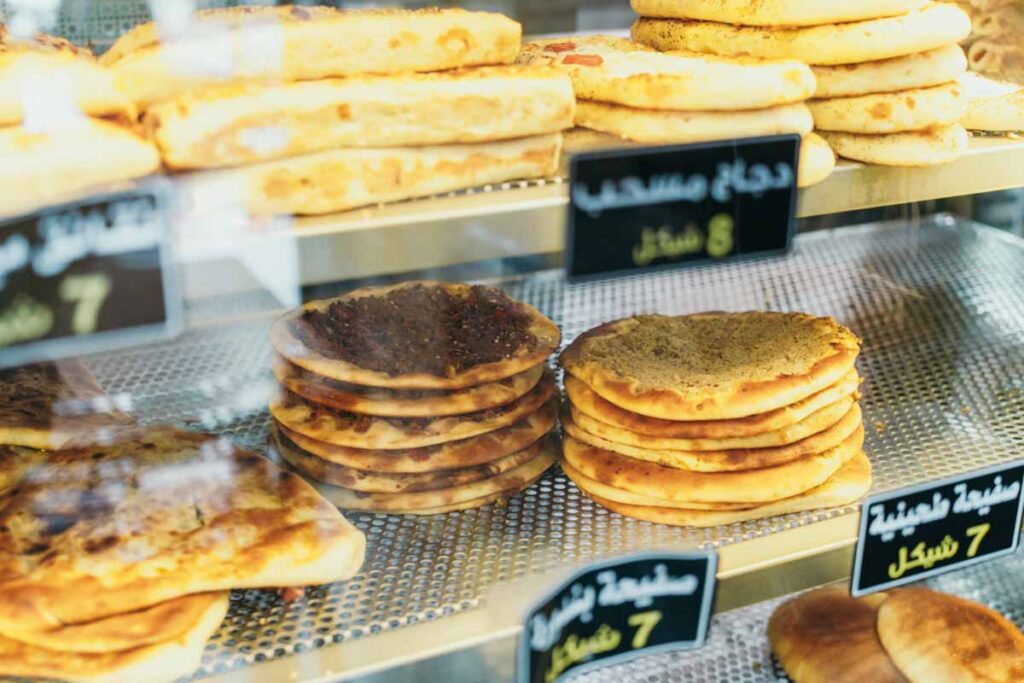
WHERE TO STAY IN JERICHO
Jericho has not many budget options. However, depending on your preferences and budget, you can easily find a place to stay. You can stay in the city centre or a refugee camp. We recommend you stay in the camps as they are a big part of Palestine, and everyone should experience the reality.
Budget I Sami hostel – the backpacker’s option in Jericho; this hostel is located in a refugee camp, that’s why we decided to stay there. The owner is friendly and helpful. It’s located 3 km away from the city centre however there are restaurants and stores right in front of the hostel. A shared taxi (3 ILS, 15 min) runs all the time between the centre and Sami, and they stop right in front of the hostel, which is super convenient. You can see life in the Palestinian camp, which was the first one built in Palestine. The area is safe to walk even after dark. You can book dorms online, but double rooms are available too, and the owner will most likely upgrade you. Also, it is a great option to talk to people about life in a refugee camp, the current situation and their opinions. A private double room costs 120 ILS ($33).
Want to stay in refugee camps in Palestine? Read our experience here.
Mid-Range I Mount 41 – if you don’t want to stay away from the centre, the best option is to stay in hostel Mount 41, which has the best central location in the city. However, there are only dorms.
Mid-Range I Auberg-Inn Guesthouse – another popular option amongst travellers. It’s close to the Mount of Temptation, the rooms are big, and the place is clean.
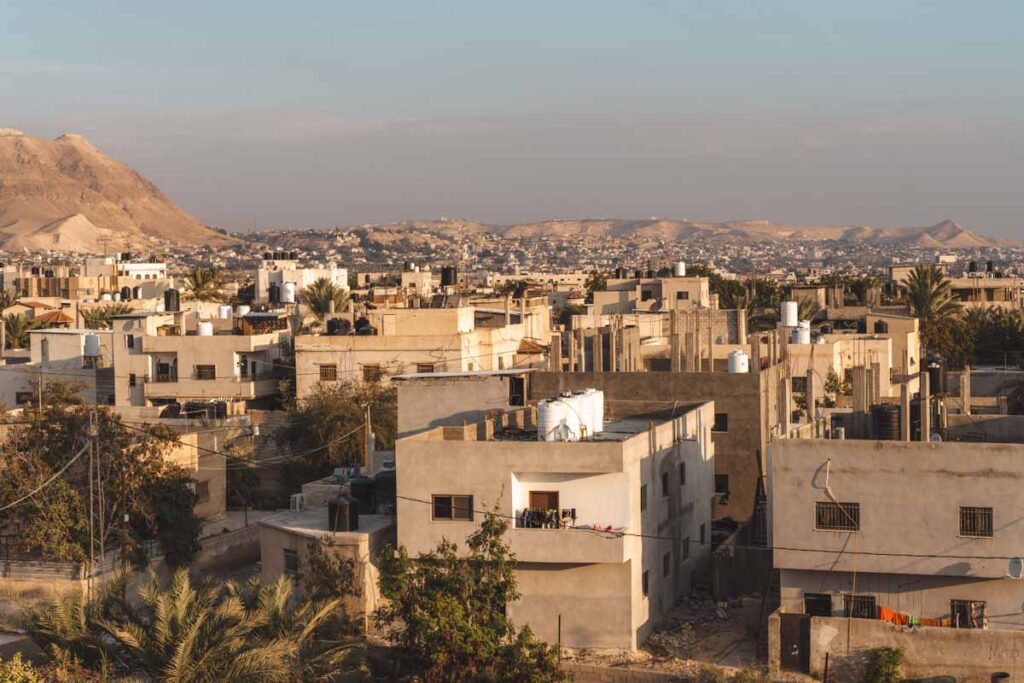
DAY 8: RAMALLAH
Honestly, Ramallah was a bit disappointing as we felt like not much was going on here. We enjoyed the Christmas decorations around the cosmopolitan city and the good Palestinian pizza in local bakeries. But also the famous local ice cream you can taste at Rukab’s Ice Cream.

BEST THINGS TO SEE IN RAMALLAH
Yasser arafat museum.
As the name suggests, this museum is dedicated to the life of Yasser Arafat. In my opinion, the museum is made in quite a chaotic way, and if you’re not familiar with Yasser Arafat’s actions, it might be a bit confusing. A whole section in the museum shows the life of Yasser under the Israeli Siege during the years 2001 and 2004. The first thing you see when entering the area is the Mausoleum. However, these days, it is not guarded by soldiers anymore.
- Opening times of Yasser Arafat Museum: 10am – 6pm
- Entry fee: 5 ILS ($1.4)
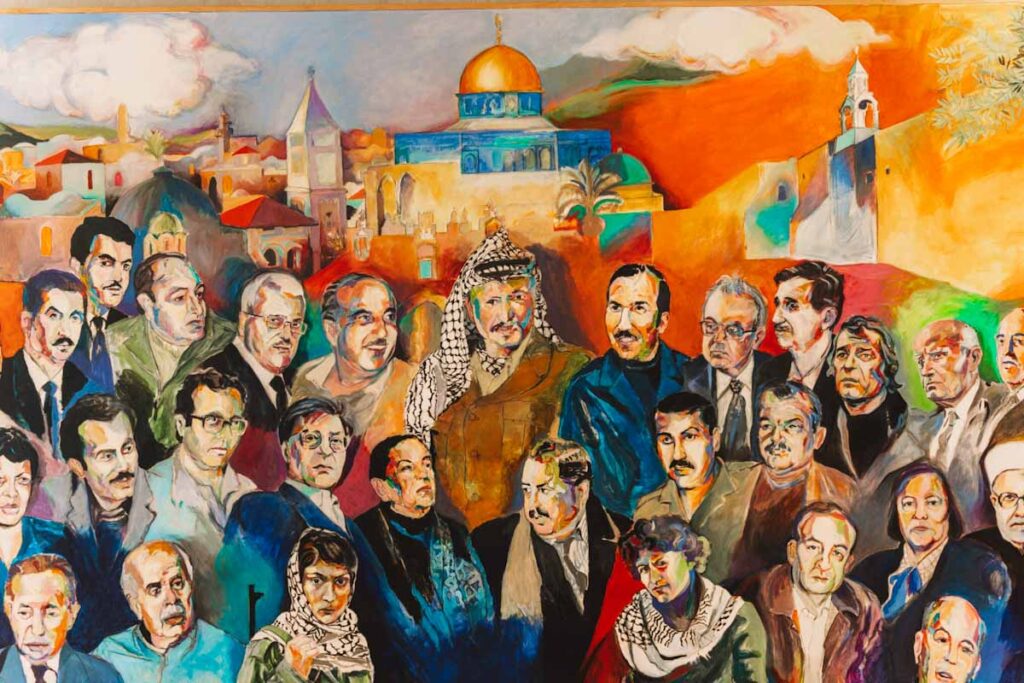
Taybeh Beer Brewery
We wanted to visit the beer brewery in Taybeh, so we went to parking lot where buses to Taybeh goes. We entered the bus and waited half an hour for the bus to fill up, but no one showed up. We used Google Translate, and the driver said it could sometimes take even a few hours. We searched for a shared taxi instead, which was right on the road next to this parking lot . We were the first ones in the taxi, another two ladies joined, and then we waited another half an hour, and no one showed up. We gave up as we thought getting back might be even more problematic.
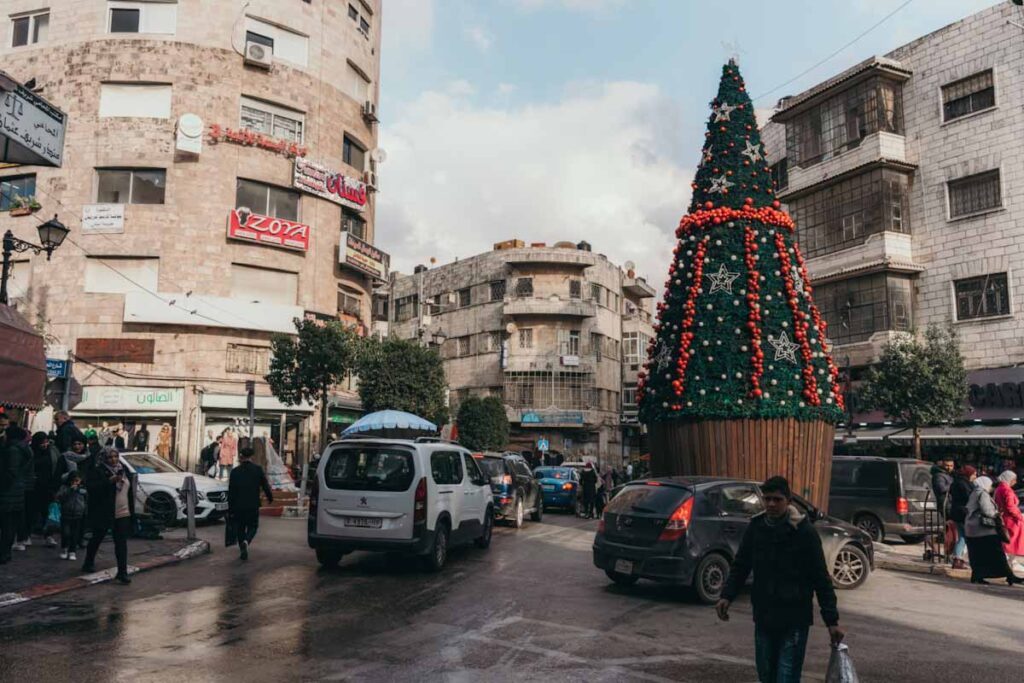
HOW TO GET TO RAMALLAH FROM JERICHO
Take a shared taxi that has a station in the centre opposite the Mount 41 hostel in Jericho. They charge 18 ILS.
How to get around Ramallah or to other cities
Ramallah is very confusing with the shared taxis system as there are many stations from where the shared taxis or buses leave, The best is always to talk to local people, and they will show you where to go.
WHERE TO STAY IN RAMALLAH
Eco Hostel Ramallah is a place where travellers meet in Ramallah and also volunteer. The German guy checked us into the hostel earlier than check-in time, which we appreciated. We stayed in shared dorms for 75 ILS ($20) per person, which is quite a lot in our opinion; it was the most expensive accommodation we had in Palestine. The place is very clean; you can use the kitchen, fast Wi-Fi, free water and a coffee & tea station.
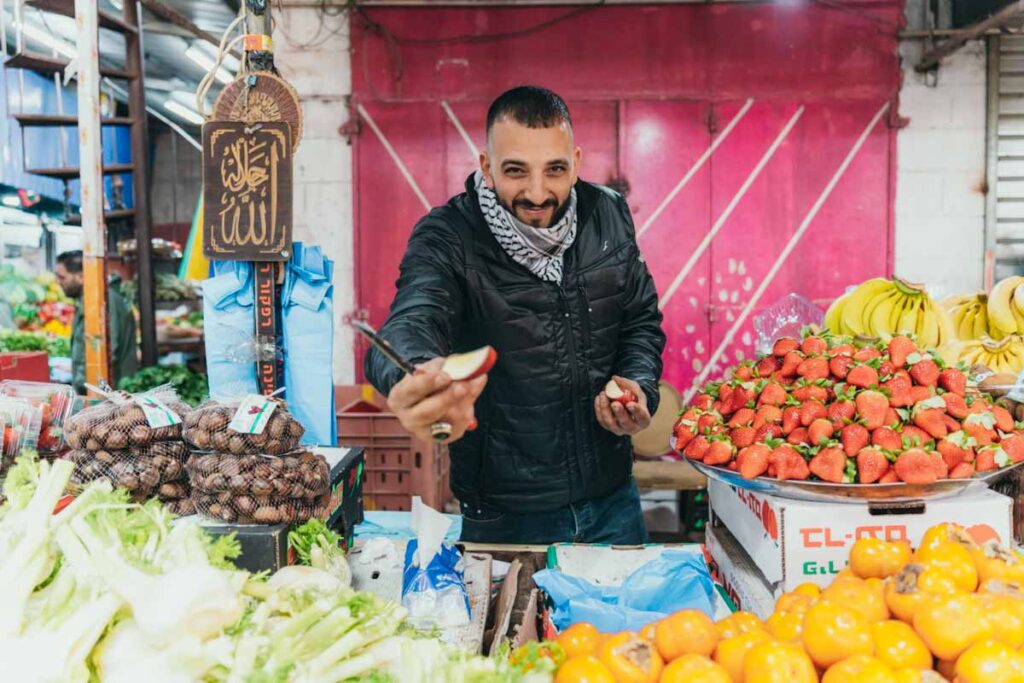
DAY 9-10: NABLUS
Nablus surprised us with its beautiful atmosphere and old city, where we felt like being back in Tripoli in Lebanon . It is a conservative and authentic city that does not attract many foreigners. At the time of our visit, a new terrorist group was forming with the aim of fighting the Israeli forces. The area from Nablus towards the north is quite sensitive, and during our stay, we were informed by our hotel not to go outside after sunset. The whole old city and market shut down before 5pm, which is when we should go back to the hotel. One evening, around 5pm, we were already chilling when we heard gunshots right in front of our window. Hundreds of people of this Nablus group with guns went into the streets and shot into the air. That day, we saw a small boy holding a huge gun and casually walking around the market. Even though it sounds dangerous place to be, this group aim to protect Palestinians, and you, as a tourist, have nothing to fear about. However, if the bullets are in the air, they must also go down; so it is better to be inside your hostel in the evenings.
That night, there were big riots close to Jacob’s Tomb as Jews, and the Israeli army, which protected them, came to pray at this holy site. There was shooting, fire on the streets and fights until late that night. In the hostel, we met US journalists who were preparing to go there to film and make a report on this.
People in Nablus are suspicious of foreigners at first, so they checked on us many times, asking where we are from, if we are journalists, and why we came. After we explained we were just tourists, they relaxed and were very nice to us. Actually, Nablus is a place where we would like to return one day.
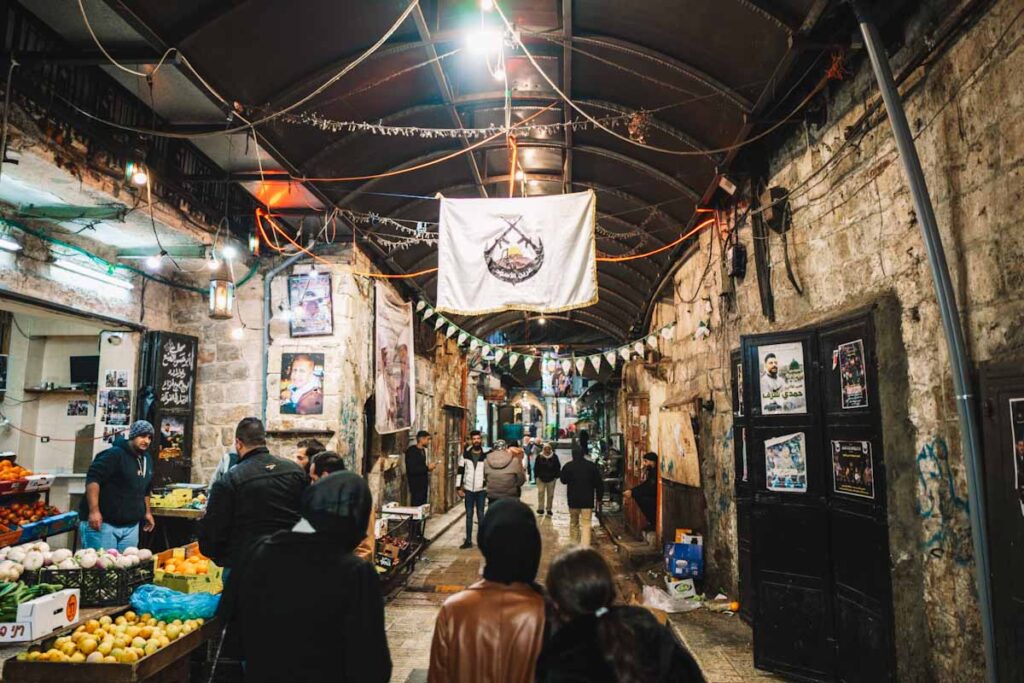
BEST THINGS TO SEE IN NABLUS
Traditional souq.
This souq had many shops with traditional products and crafts, where the recipe is passed from generation to generation: Halva, sweets, honey. There is even a store with a crocodile and snake skin that the owner brought from India. The whole market and old city are covered with posters and flags of the activist group, showing martyrs killed in fights with Israel.
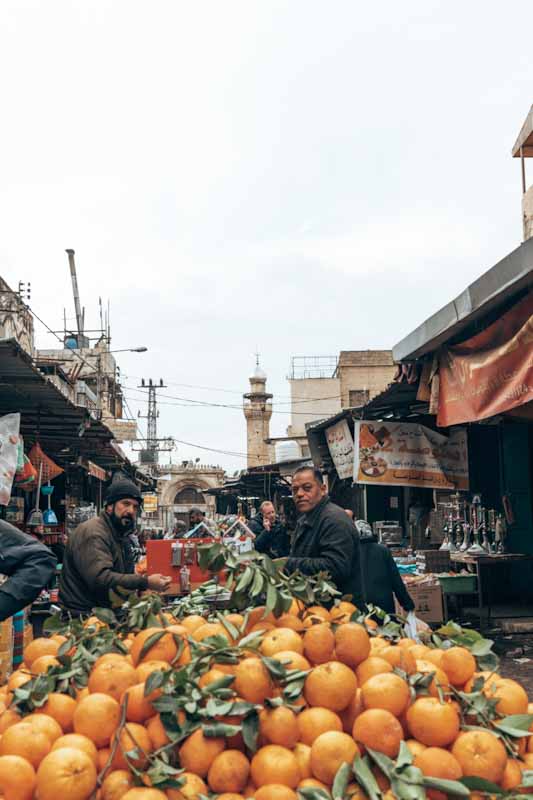
The old city and watch tower
The old city has an authentic vibe, narrow streets and charismatic stone houses. Come to the square with the watch tower, have a coffee from one of the stalls and enjoy the place. It has identical Ottoman Era architecture as we saw when we visited Damascus during our trip to Syria.
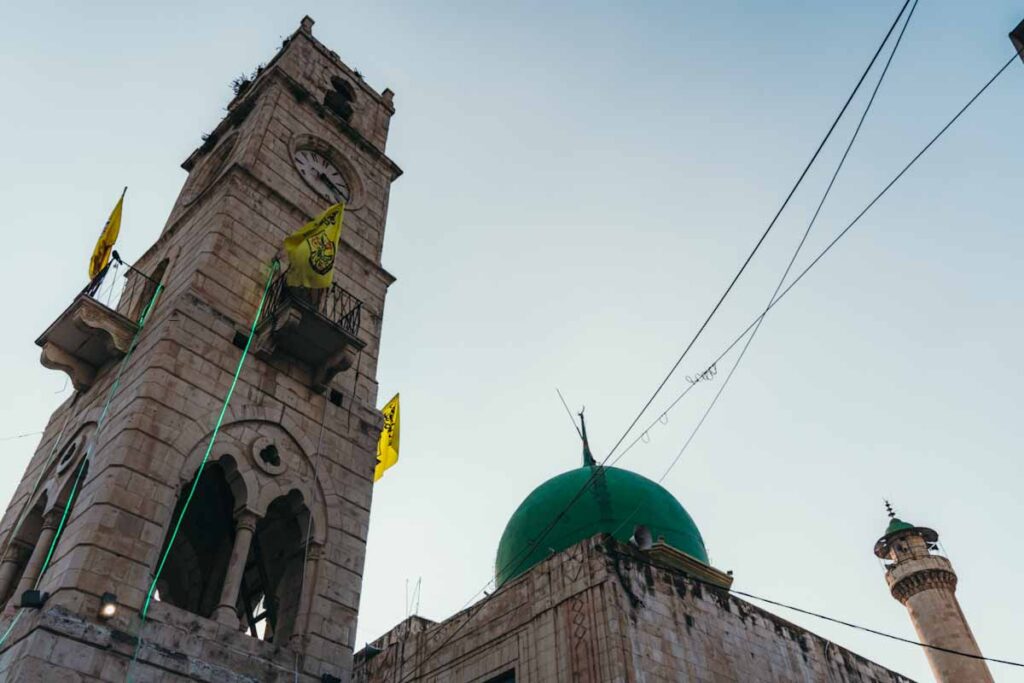
Try the best Kunafeh in Palestine in Al Aqsa Kunafeh , the famous Kunafeh place in Palestine. Their Kunafeh tastes like heaven, and there is no wonder why this place is bustling with locals every day. You can also see the whole process of making kunafeh which is a cool experience.
The next sweet thing you must try is Tamriyah , a fried pastry filled with semolina pudding that costs only 1 ILS. Zalabye Pumpkin is to die for. It is something like a crepe filled with sweet pumpkin filling and then fried. It costs 7 ILS and is totally delicious. Halva . Oh, halva. We visited two traditional places where they make halva, the owners took us inside, showed us around, and gave us a taste of their delicious halva, and we bought a few boxes to bring back home with us. The food in Nablus is fresh and so good.
You can get local Palestinian food, falafel sandwiches or hummus in many places. We didn’t make a mistake in any of the eateries we visited in the old town.
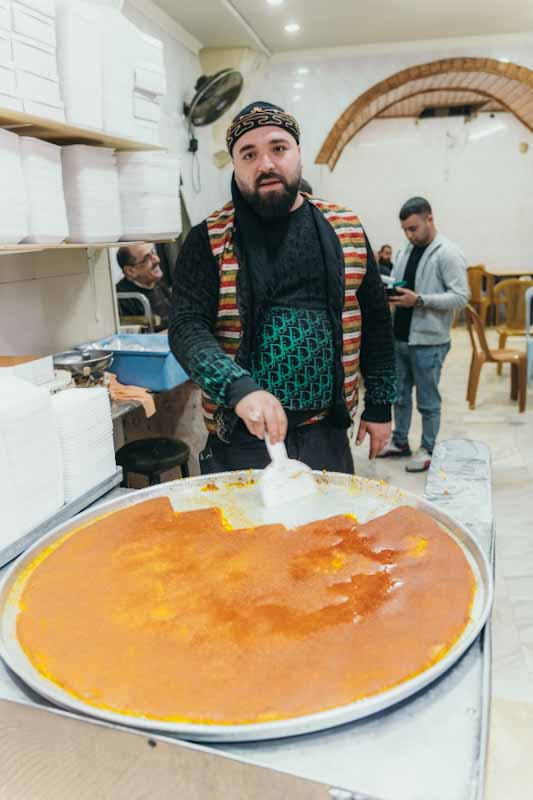
Soap factory
There are numerous soap factories in Nablus. Visit one, check out the colourful soaps and lovely smell and learn about the soap-making process.
As you can guess, Nablus is our favourite city in Palestine, and that’s why we dedicated a whole separate post about Nablus and the best things to do and eat there, but you can also read about the safety situation.
Read more in our post: How to visit Nablus, Palestine, in 2023 & Is it safe? (Coming soon)

HOW TO GET TO NABLUS FROM RAMALLAH
We asked the local man where the shared taxi have a station, and luckily he took us to the building, where we took a lift and after we saw the place where many share taxis stand. We paid 17 ILS. The location of the multi-floor building from where the shared taxis leave is here .
HOW TO GET AROUND NABLUS
Stay in the centre of Nablus, and you can easily walk everywhere. If you want to go further, take a taxi for 5-10 ILS.
WHERE TO STAY IN NABLUS
Turquoise Guest House I without a doubt, is the best place to stay in Nablus and maybe the whole of Palestine. It is right in the old town, located on the second floor of the stone house. There are some private rooms and also separate dorms for men and women; that’s where we stayed. We met interesting people here, travellers and volunteers who helped at Turquoise Guest House. The owner and family took the time to discuss things about Nablus; they have generally been very helpful. The guest house has an amazing rooftop from where you can see the whole of Nablus. After sunset, it’s a show of lights.
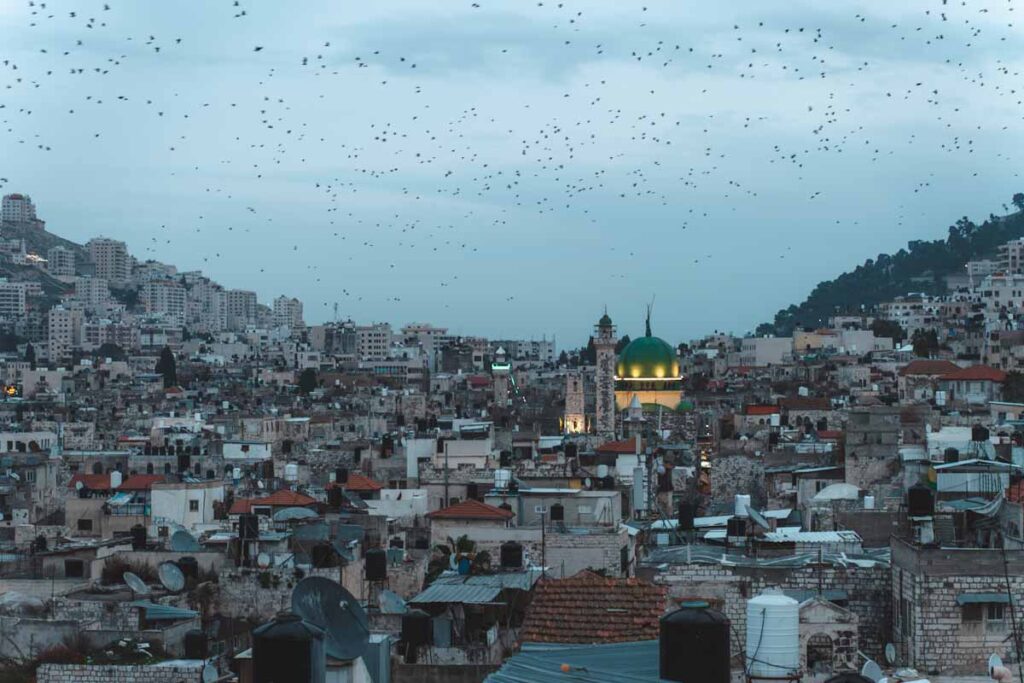
DAY 11: JENIN
Jenin is not your typical holiday destination as it is a place of frequent riots and a place where the Palestinian journalist Abu Akleh was killed when reporting for Al Jazeera. Her face is a symbol of Palestinian activism. You will see graffiti with her face and posters all around Palestine.
When you cross the Emek Harod checkpoint to Nazareth, expect you will be suspicious as only activists and journalists usually go to Jenin. We decided not to spend a night there and only go for a day trip. Jenin is a traditional Palestinian city with similar vibes to Nablus. We felt there very well, safe and welcomed. People stopped us on the street and wanted to practice English.
The market in the centre, together with the one in Nablus, is the best market we visited in Palestine. We wandered around its streets for a couple of hours. We used our time, especially for walking around the centre of Jenin, talking with people, and tasting some food and pomegranate juice. And then, we took a shared taxi towards the border as the plan that day was to make our way to Nazareth, Israel.
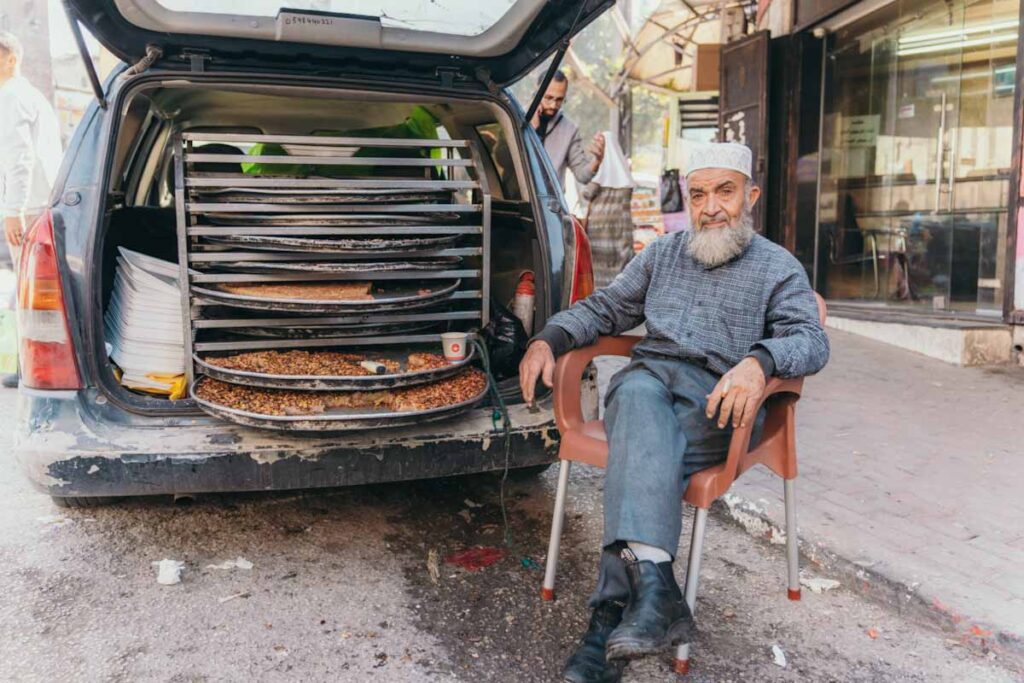
HOW TO GET TO JENIN FROM NABLUS
In Nablus, take a shared taxi to Jenin from this location . It costs 16 ILS.
WHERE TO STAY IN JENIN
Jenin Creative Cultural Center – I got in touch with Yousef through Facebook messages . He runs this place and is a director of an NGO in Jenin. They charge quite a higher price for accommodation, but since there are not many hotel options, this is the place to be. We spent a half day in Jenin on the way to the border, so we didn’t stay overnight.
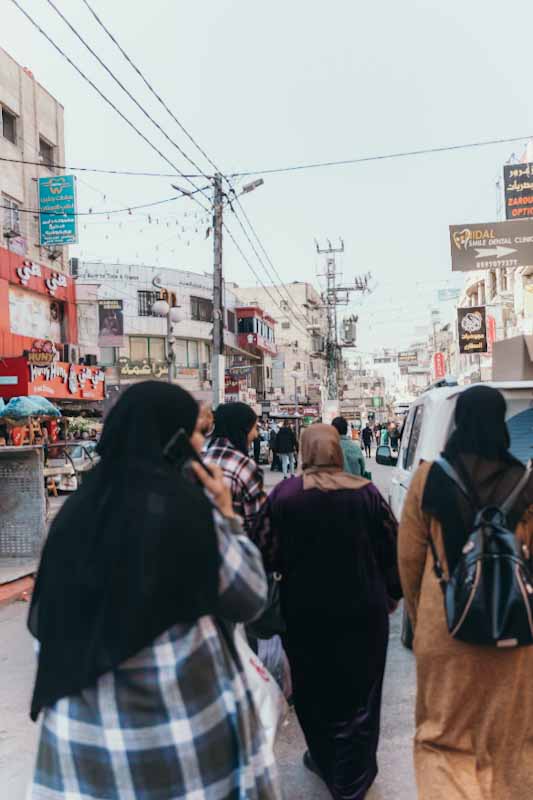
HOW TO GET TO NAZARETH FROM JENIN
Take a shared taxi from Jenin to Jalamah, the city right by the Emek Harod Checkpoint, where you cross to Nazareth in Israel. We asked locals, and they brought us to the shared taxi location. We paid 4 ILS for a ride.
We already described the Emek Harod Checkpoint above in the Checkpoint section .
After you cross the checkpoint, you find yourself back in Israel. Follow people and go outside of the building. Then continue your way to the bus stop by the main road. On google maps, you find the bus stop as Jalamah Checkpoint and wait for the bus to Nazareth. Check the Moovit App to find the bus that is going there. We took bus #52 and then changed to bus #354. More buses are going as well as taxis. It is only 25 km from Nazareth.
Read more: Visiting Israel on budget: Tips & Perfect 5 days itinerary. (Coming soon)
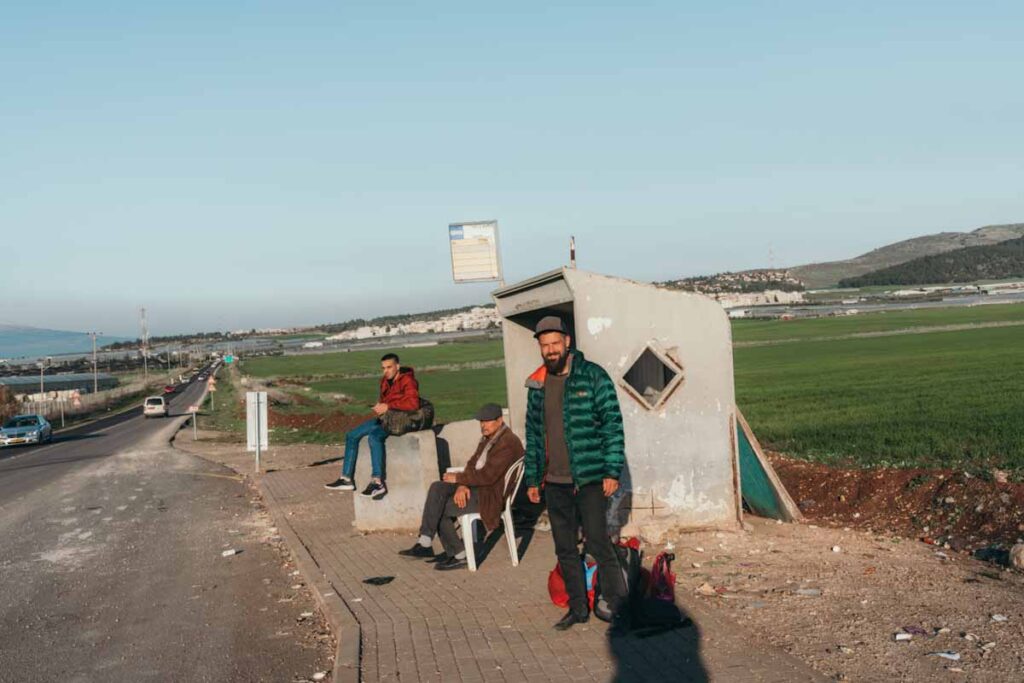
More from the Middle East
Palestine / israel.
How to visit Jerusalem in 24 hours: Safety, Tips, Itinerary
Visit & Stay in refugee camps in the West Bank.
Taba Border Crossing: Dahab (Egypt) to Eilat (Israel) with Troubled Stamps in Passport
How to travel to Lebanon & Ultimate 11 days itinerary
The best things to do in Beirut, Lebanon
Is it safe to travel to Lebanon? Our experience
How to travel to Syria & Is it safe to visit?
How to travel to the Turkish Republic of Northern Cyprus
Travel off the beaten path in Cyprus
Epic road trip: The King’s Highway in Jordan
Wadi Rum: Overnight in the desert & Know before you go
How to travel to Aqaba, Jordan & Ultimate beach guide
How to visit Petra and Little Petra in Jordan
It’s time to plan your trip!
Find our travel resources below that help you plan your next trip. Good luck and safe travels.
Book your flight
Skyscanner is our favourite tool for searching for the cheapest flights and flight combinations. Multi-city or Explore Everywhere helps us to find real bargains.
The best platform to rent a car and compare the prices for your next road trip anywhere in the world is Discovercars.com . The booking process is hassle-free.
Find your acommodation
On Booking.com we always find the best deals for accommodation. Another great option for cheap accommodation is Hostelworld .
Travel insurance
We always recommend IATI Travel Insurance which offers excellent plans. As a reader of Broken Navigation, get an exclusive 5% discount. For Europeans Truetraveller offers perfect travel insurance for the best price.
Explore more with Tours
Some places are better off explored with a knowledgeable guide. Or, if you simply want to save time and hassle, we recommend GetYourGuide . Another great option that also has an amazing range of activities is Viator .
protect yourself online by VPN
We always use NordVPN everywhere we travel for safe internet browsing and access to specific sites that might be blocked.
Disclosure: We recommend only companies we personally use. If you book services through any of the affiliate links in our posts, it earns us a small commission at no extra cost to you.
Travelling for years now, she found the passion in unique and off the beaten path places. Romana is a food lover, but it doesn’t stop her from hiking the mountains for several days. By sharing her experiences, she wants to help you experience the same.
You may also like
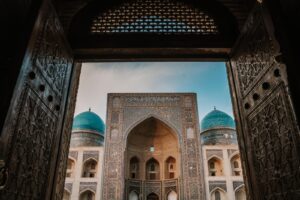
Top Places to Visit in Uzbekistan in 2024 & 2 Weeks Itinerary
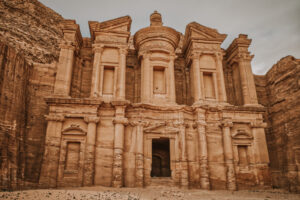
How To Visit Petra and Little Petra, Jordan in 2024
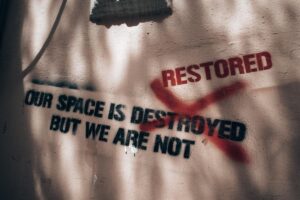
Is It Safe to Travel to Lebanon in 2024? Know Before You Go
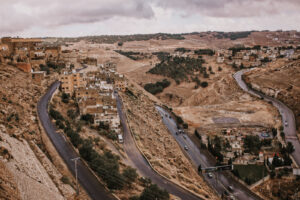
King’s Highway, Jordan – Travel Guide for an Epic Road Trip in 2024
Leave a reply cancel reply.
Your email address will not be published. Required fields are marked *
Name *
Email *
Add Comment *
Email me when someone replies to my comment
Subscribe to newsletter
Post Comment
Subscribe to our newsletter
Get access to exclusive content and stay up to date with the latest travel tips and news.
- Company History
- Mission Statement
- Philippines
- South Africa
- Afghanistan
- American Samoa
- Antigua and Barbuda
- British Virgin Islands
- Burkina Faso
- Canary Islands
- Cayman Islands
- Central African Republic
- Christmas Island
- Cocos (Keeling) Islands
- Cook Islands
- Cote d'Ivoire
- Democratic Republic of the Congo
- Dominican Republic
- Easter Island
- El Salvador
- Equatorial Guinea
- Falkland Islands
- Faroe Islands
- French Guiana
- French Polynesia
- Guinea-Bissau
- Liechtenstein
- Madeira Islands
- Marshall Islands
- Netherlands
- New Caledonia
- New Zealand
- Norfolk Island
- North Korea
- North Macedonia
- Northern Mariana Islands
- Palestinian Territories
- Papua New Guinea
- Pitcairn Islands
- Puerto Rico
- Republic of the Congo
- Saint Barthelemy
- Saint Helena
- Saint Kitts and Nevis
- Saint Lucia
- Saint Martin
- Saint Pierre-et-Miquelon
- Saint Vincent and the Grenadines
- Sao Tome and Principe
- Saudi Arabia
- Sierra Leone
- Sint Eustatius
- Solomon Islands
- South Georgia and the South Sandwich Islands
- South Korea
- South Sudan
- Switzerland
- Trinidad and Tobago
- Turkmenistan
- Turks and Caicos Islands
- U.S. Virgin Islands
- United Arab Emirates
- United Kingdom
- United States
- Wake Island
- Western Sahara
- Travel Vaccines
- Travel Health Consultations
- Travellers’ Diarrhea Kits
- Dengue Fever Prevention
- Malaria Prevention
- Chikungunya Prevention
- Zika Prevention
- Ebola Virus
- Yellow Fever
- Hepatitis A
- Japanese Encephalitis
- Hepatitis B
- Tickborne Encephalitis (TBE)
- Tetanus-Diphtheria-Pertussis
- Measles-Mumps-Rubella
- Influenza (Flu)
- Blood Tests
- Vitamin Injections
- Physician Referral Program
- London Bridge Clinic
- London – Euston Travel Clinic

Travel Vaccines and Advice for the Palestinian Territories

The Palestinian Territories of the West Bank and Gaza give travellers access to the famous Dead Sea and a warm Mediterranean climate.
Much of the West Bank is devoted to growing olives, which are important to the Palestinian economy and culture. About 45% of land in the territories is used for olives.
The Palestinian Territories also have one of the world’s oldest churches, the Church of Nativity.
Do I Need Vaccines for the Palestinian Territories?
Yes, some vaccines are recommended or required for the Palestinian Territories. The National Travel Health Network and Centre and WHO recommend the following vaccinations for the Palestinian Territories: COVID-19 , hepatitis A , hepatitis B , typhoid , rabies , polio and tetanus .
See the bullets below to learn more about some of these key immunisations:
- COVID-19 – Airborne – Recommended for all travellers
- Hepatitis A – Food & Water – Recommended for most travellers to the region, especially if unvaccinated.
- Hepatitis B – Blood & Body Fluids – Accelerated schedule available
- Tetanus – Wounds or Breaks in Skin – Recommended for travelers to most regions, especially if not previously vaccinated.
- Typhoid – Food & Water – Jab lasts 3 years. Oral vaccine lasts 5 years, must be able to swallow pills. Oral doses must be kept in refrigerator.
- Rabies – Saliva of Infected Animals – High risk country. Vaccine recommended for long-stay travellers and those who may come in contact with animals.
- Polio – Food & Water – Considered a routine vaccination for most travel itineraries. Single adult booster recommended.
See the tables below for more information:
Because of the large amount of immigration in the area, be sure you are up-to-date on any routine immunisations .
Visit our vaccinations page to learn more. Travel safely with Passport Health and schedule your appointment today by calling or book online now .
Do I Need a Visa to Travel to the Palestinian Territories?
There are no entry requirements as such for the Palestinian Territories. Entry is done through Israel.
No visa is required for stays under three months in Israel. Passport validity must be for at least six months to be allowed entry.
An entry card is given at some ports of entry instead of a passport stamp to facilitate travel to regions less friendly to Israel.
Sources: Embassy of Israel and GOV.UK
What is the Climate Like in the Palestinian Territories?
The Palestinian Territories have a Mediterranean climate, expect warm weather. Nights experience a chilly drop every day no matter the season. Summers are usually long and very hot. Winters are short, cold, and wet, with the rainy season between November and April.
Humidity is strong all year round. Khamaseen winds come through Palestine from about April to June and bring dust and sand. In the latter half of the Summer they give a more gentle breeze against the harsh sun.
How Safe are the Palestinian Territories?
General travel safety advice for the Palestinian Territories:
- Be wary of conflicts between Palestinian residents and Israeli security forces. Conflict can break out at anytime and lead to serious problems.
- Petty crime like pick-pocketing does occur. Assaults on foreigners happen in some regions as well. Take extra precautions including travelling as part of a group. Avoid travelling at night.
- Careful research how to be safe in the Palestinian Territories and relations with Israel. It is better to cancel a trip then end up in a dangerous environment.
Float on the Dead Sea
A large amount of the Dead Sea borders the West Bank. This salt lake is famous for its saline waters which allow travellers to float without the aid of vests. The Dead Sea is also the lowest body of water in the world. Many of the harsh ultraviolet rays of the sun are filtered out leaving calming, gentle light shining through.
Most of the Dead Sea’s water comes from the Jordan River. Over time, the Dead Sea’s water level has been lowering. But, it is still a riveting and beloved spot for tourists and locals alike.
Tourists not only enjoy floating, but also the mineral-rich mud for restorative masks and treatments. The salt crystals and waters themselves are known for their healing properties.
What Should I Pack for the Palestinian Territories?
Think ahead on what to pack by perusing these suggestions:
- Appropriate Clothing – The Palestinian Territories can be hot during the summer. Many religious sites require more covering clothing. Be sure to pack for the time of year and the activities you wish to do. Consider items such as sun cream, scarves, and bathing suits.
- Medical Kit – Be sure to bring a travel first-aid kit for any small injuries that may occur. A traveller’s diarrhoea kit is also recommended.
- Copies of Travel Documents – In case of lost luggage or theft, bringing copies of your passport and visa is a must.
Embassy of the United Kingdom in Israel
If you are in the Palestinian Territories and have an emergency (for example, been attacked, arrested or someone has died) contact the nearest consular services. Contact the embassy before arrival if you have additional questions on entry requirements, safety concerns or are in need of assistance.
Consular services for the region are handled by the British Embassy in Tel Aviv, Israel:
British Embassy Tel Aviv 192 Hayarkon Street 6340502 Tel Aviv Israel Telephone: +972 (0)3 725 1222 Emergency Phone: +972 (0)3 725 1222 Fax: +972 (0)3 524 9176 Email: [email protected]%20
Ready to start your next journey? Ring us up at or book online now !
On This Page: Do I Need Vaccines for the Palestinian Territories? >Do I Need a Visa to Travel to the Palestinian Territories? What is the Climate Like in the Palestinian Territories? How Safe are the Palestinian Territories? Float on the Dead Sea What Should I Pack for the Palestinian Territories? Embassy of the United Kingdom in Israel

- Privacy Policy
- Automatic Data Collection Statement

Palestine Travel Advice and Travel Advisories
Palestine travel vaccines and advice.

Palestine is a country where the colours orange, red and yellow blend together. Offering ancient biblical sites, the land is deemed as sacred by many groups, and proves a very interesting place to visit. For sweeping views of the territory, making the ascent to the Mount of Temptation Monastery is well worth your time. To explore further, stop off at the Qumran Caves, or The Church of St. Catherine to glimpse some stunning architecture and to immerse yourself in the local culture. The cuisine in Palestine is influenced by Persian culture and Turkish cuisine, and includes delicacies such as Sfiha – a flatbread with lamb and cooked peppers or tomatoes. Try sweet pastries during the evenings of Ramadan, one of the most interesting periods to visit.
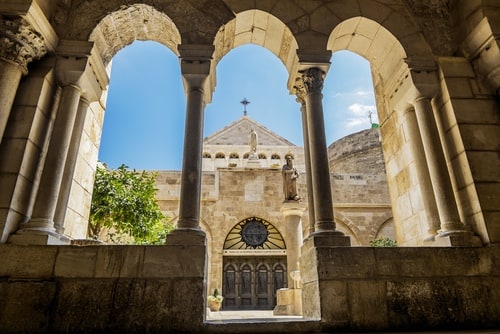
Recommended travel vaccinations for Palestine
There’s also a risk of poliomyelitis .
Recommended Medication for Travelling to Palestine
Current weather in palestine, medical care in palestine.
Healthcare can prove very expensive in Palestine. You must pay Hospitals directly, so make sure to bring sufficient funds whilst travelling. You should also purchase medical insurance which covers medical repatriation.
There are pharmacies available in Palestine but always travel with a well-stocked medical kit and any prescriptions you may require.
In order to access an emergency medical service, dial 101 for the Palestinian Red Crescent Society .
Is Palestine Safe for Travel?
Government information on safety and security is not currently available. While visiting Palestine, make sure you stay safe. Always keep an eye on your belongings and carry a copy of your passport rather than the original. Be wary of tourist traps and take the safest means of transportation possible. Finally, take care of your health by reducing exposure to bacteria and animals or insects.
Palestine and Israel have been in conflict for many years. Be wary during your travels.
Do I Need a Visa to Visit Palestine?
Prior to travel, make sure you check with your transportation company about any passport requirements to travel to Palestine. This is important as in some cases their regulations on passport validity may be more strict than those of the destination country.
Embassy of Canada to Palestine information
When travelling to another country, it is important to know where the Canadian embassy is located in the event of:
- A legal problem
- A lost passport
- The need to report a crime
It is advisable to make a copy of your original passport in case you lose it.
Canadian Embassy to Palestine There is currently no information on an embassy in Palestine, you may always call the Emergency Watch and Response Centre in Ottawa in case of embassy related issues.
Travel Vaccines and Advice for the Palestinian Territories

The Palestinian Territories of the West Bank and Gaza give travelers access to the famous Dead Sea and a warm Mediterranean climate.
Much of the West Bank is devoted to growing olives, which are important to the Palestinian economy and culture. About 45% of land in the territories is used for olives.
The Palestinian Territories also have one of the world’s oldest churches, the Church of Nativity.
On This Page: Do I Need Vaccines for the Palestinian Territories? Other Ways to Stay Healthy in the Palestinian Territories Health Notices and Outbreaks in the Palestinian Territories Do I Need a Visa to Travel to the Palestinian Territories? What Is the Climate Like in the Palestinian Territories? How Safe are the Palestinian Territories? Float on the Dead Sea What Should I Pack for the Palestinian Territories? U.S. Embassy in Israel
Do I Need Vaccines for the Palestinian Territories?
Yes, some vaccines are recommended or required for the Palestinian Territories. The CDC and WHO recommend the following vaccinations for the Palestinian Territories: typhoid , hepatitis A , polio , rabies , hepatitis B , influenza , COVID-19 , pneumonia , meningitis , chickenpox , shingles , Tdap (tetanus, diphtheria and pertussis) and measles, mumps and rubella (MMR) .
See the bullets below to learn more about some of these key immunizations:
- Typhoid – Food & Water – Shot lasts 2 years. Oral vaccine lasts 5 years, must be able to swallow pills. Oral doses must be kept in refrigerator.
- Hepatitis A – Food & Water – Recommended for most travelers.
- Polio – Food & Water – Due to an increase in cases globally, an additional adult booster is recommended for most travelers to any destination.
- Rabies – Saliva of Infected Animals – High risk country. Vaccine recommended for long-term travelers and those who may come in contact with animals.
- Hepatitis B – Blood & Body Fluids – Recommended for travelers to most regions.
- Influenza – Airborne – Vaccine components change annually.
- COVID-19 – Airborne – Recommended for travel to all regions, both foreign and domestic.
- Pneumonia – Airborne – Two vaccines given separately. All 65+ or immunocompromised should receive both.
- Meningitis – Direct Contact & Airborne – Given to anyone unvaccinated or at an increased risk, especially students.
- Chickenpox – Direct Contact & Airborne – Given to those unvaccinated that did not have chickenpox.
- Shingles – Direct Contact – Vaccine can still be given if you have had shingles.
- Polio – Food & Water – Considered a routine vaccination for most travel itineraries. Single adult booster recommended.
- TDAP (Tetanus, Diphtheria & Pertussis) – Wounds & Airborne – Only one adult booster of pertussis required.
- Measles Mumps Rubella (MMR) – Various Vectors – Given to anyone unvaccinated and/or born after 1957. One time adult booster recommended.
See the table below for more information:
Specific Vaccine Information
- Typhoid – Typhoid, a potentially life-threatening illness caused by Salmonella Typhi, spreads through contaminated food and water in areas with poor sanitation. To prevent it, practice good hygiene and safe food and water precautions.
- Cholera – Cholera, caused by the Vibrio cholerae bacterium, spreads through contaminated food and water, causing severe diarrhea and dehydration. Preventive measures include improving sanitation, hygiene, and food safety. Vaccination plays a crucial role, with oral and injectable cholera vaccines available for travelers to high-risk areas and during outbreaks.
- Hepatitis A – Hepatitis A, a liver infection caused by a contagious virus, can have severe symptoms. To prevent its spread, vaccination with the hepatitis A vaccine is essential, along with maintaining hygiene practices. This vaccine effectively protects against infection.
- Polio – Polio, a viral infection that attacks the nervous system, spreads through contact with infected feces. The most effective prevention strategy is vaccination. The vaccine bolsters the immune system’s defenses, reducing the risk of polio.
- Rabies – Rabies, a deadly viral disease, spreads via bites or scratches from infected animals. Vaccination is the cornerstone of prevention, including post-exposure prophylaxis (PEP) for suspected exposures and pre-exposure prophylaxis (PrEP) for individuals with regular animal contact or travelers.
- Hepatitis B – The hepatitis B virus causes liver infection, spreading through contact with infected bodily fluids. Prevention measures include safe practices and, notably, hepatitis B vaccination. This vaccine effectively triggers the immune system to produce antibodies, offering reliable, long-term protection against the virus.
- Measles, Mumps, Rubella (MMR) – Measles, mumps, and rubella are highly contagious diseases with potentially severe consequences. Preventing their transmission is possible through vaccination with the MMR vaccine. This two-dose vaccine not only safeguards individuals but also helps create herd immunity, reducing the risk of outbreaks within communities.
Because of the large amount of immigration in the area, be sure you are up-to-date on any routine immunizations .
Visit our vaccinations page to learn more. Travel safely with Passport Health and schedule your appointment today by calling or book online now .
Other Ways to Stay Healthy in the Palestinian Territories
Prevent bug bites in the palestinian territories.
When bitten by bugs, clean the area with soap and water, refrain from scratching, and use over-the-counter remedies. For severe reactions or tick bites, consult a healthcare professional promptly. Following CDC guidelines can help prevent and manage bug bites effectively.
Food and Water Safety in the Palestinian Territories
While dining abroad, prioritize food safety by avoiding street food, practicing hand hygiene, and selecting fully cooked dishes. Opt for sealed bottled or canned drinks. Prevent travelers’ diarrhea by adhering to hand hygiene, skipping raw foods, and dining at reputable establishments.
Infections To Be Aware of in the Palestinian Territories
- Avian/Bird Flu – Avian flu, a contagious virus affecting birds and humans, can be prevented through poultry vaccination, enhanced biosecurity on farms, proper poultry handling and cooking, vigilant outbreak surveillance, and public education on the virus and its transmission.
- Leishmaniasis – Leishmaniasis, transmitted by sand fly bites, can be prevented by adopting protective measures such as using insect repellents, covering exposed skin, and staying indoors when sand flies are active.
- MERS – MERS is a severe respiratory illness caused by the MERS-CoV virus. Preventing MERS entails regular hand-washing, avoiding contact with infected individuals and camels, and adhering to CDC travel recommendations. Currently, there is no vaccination or specific antiviral treatment for MERS.
Health Notices and Outbreaks in the Palestinian Territories
- Polio – At least one case of polio was reported in Palestine over the last 12 months. The CDC and WHO advise all travelers to ensure their polio vaccination history is up-to-date. Adults who previously received a full set of polio vaccinations may need a single, lifetime booster dose.
Do I Need a Visa to Travel to the Palestinian Territories?
The only way to enter the Palestinian Territories is through Israel. You do not need a visa to travel to the Palestinian Territories for stays of 90 days or less. If you are traveling to volunteer in the West Bank you will need a B4 volunteer visa.
Sources: Embassy of Israel and U.S. State Department
You will need a passport valid six months past your entry date with a blank page in it for a stamp. Passports are not normally stamped for entry.
What Is the Climate Like in the Palestinian Territories?
Palestinian Territories have a Mediterranean climate with hot and dry summers and mild, rainy winters. Jerusalem, Bethlehem, and Jericho are popular tourist destinations in this region. Jerusalem and Bethlehem have similar climates with hot, dry summers, and mild winters. In the summer months (June-August), the temperature averages around 85 degrees, while in winter (December-February), it averages around 50.
Jericho has a desert climate and is one of the hottest places in Palestinian Territories. Summers can be scorching, with temperatures sometimes exceeding 105, while winters are mild and sometimes rainy. The best time to visit Jericho is in the winter months (December-February) when temperatures are more bearable.
If you plan to visit Palestinian Territories, it’s essential to check the weather forecast before traveling, especially if you’re planning outdoor activities.
How Safe are the Palestinian Territories?
General travel safety advice for the Palestinian Territories:
- Be wary of conflicts between Palestinian residents and Israeli security forces. Conflict can break out at anytime and lead to serious problems.
- Petty crime like pick-pocketing does occur. Assaults on foreigners happen in some regions as well. Take extra precautions including traveling as part of a group. Avoid traveling at night.
- Careful research how to be safe in the Palestinian Territories and relations with Israel. It is better to cancel a trip then end up in a dangerous environment.
Float on the Dead Sea
Avoid an embarrassing stop, over 70% of travelers will have diarrhea., get protected with passport health’s travelers’ diarrhea kit .
A large amount of the Dead Sea borders the West Bank. This salt lake is famous for its saline waters which allow travelers to float without the aid of vests. The Dead Sea is also the lowest body of water in the world. Many of the harsh ultraviolet rays of the sun are filtered out leaving calming, gentle light shining through.
Most of the Dead Sea’s water comes from the Jordan River. Over time, the Dead Sea’s water level has been lowering. But, it is still a fascinating and beloved spot for tourists and locals alike.
Tourists not only enjoy floating, but also the mineral-rich mud for restorative masks and treatments. The salt crystals and waters themselves are known for their healing properties.
What Should I Pack for the Palestinian Territories?
When traveling to the Palestinian Territories, it is important to pack appropriate clothes for the weather and local culture. The area has a hot, dry climate in the summer and cool, wet weather in the winter. It’s important to wear modest clothing that covers the knees and shoulders, especially when visiting religious sites.
Comfortable shoes are a must as you will likely be doing a lot of walking. Make sure to bring important travel documents like your passport and visa, and some cash and credit cards.
Don’t forget to bring your camera and charger, and any prescription medications you need. You should also purchase travel insurance before your trip to protect yourself in case of unexpected events.
It’s important to be respectful of the local culture and political situation by avoiding wearing clothing with political or religious slogans, covering your head and shoulders when visiting religious sites, and avoiding discussing politics in public.
U.S. Embassy in Israel
The United States does not have an embassy in the Palestinian Territories, but it does have a consulate in Jerusalem that helps American citizens who are traveling or living in the West Bank, Gaza, and Jerusalem. The consulate provides services like help with passports and visas and assistance for citizens in distress.
As many countries do not officially recognize the Palestinian territories, there is no U.S. embassy in the area. The nearest embassy services Israel and the surrounding area:
U.S. Embassy Israel 71 HaYarkon Street Tel Aviv 6343229, Israel Phone: 03-519-7575
If you are a U.S. citizen traveling to the region, you can contact the consulate for more information about their services.
Ready to start your next journey? Call us at or book online now !
Customer Reviews
Passport health – travel vaccines for the palestinian territories.

- Records Requests
- Passport Health App
- Privacy Center
- Online Store

TOP OF PAGE
Quick Facts
Best Time To Go
Cost & Spending
Travel Tips
Regions & Highlights
What To See & Do
What To Eat
Where To Stay
Trip Planning

Welcome traveler!
We're Andre & Lisa, adventurers and experienced budget travelers.
We have over two decades of travel experience and since 2018 have led a full-time nomadic lifestyle.
L earn more about us !
Thank you for visiting and we hope you find value in our destination pages! We thoroughly research and curate all content ourselves and everything you find on this site is put together by only the two of us.

PALESTINE TRAVEL GUIDE
Palestine, recognised officially as the State of Palestine by the United Nations and other entities, is a de jure sovereign state in Western Asia claiming the West Bank and Gaza Strip with Jerusalem as the designated capital, although its administrative centre is currently located in Ramallah. The Palestinian territory, in a wider sense and together with Israel, is considered the Holy Land for three of the world's major religions: Judaism, Christianity and Islam.
The West Bank, administered by the Palestinian Authority, has been under Israeli occupation since 1967; Gaza, under Hamas control and at odds with the PA in the West Bank, is under an Israeli-Egyptian blockade. The final status of these territories remains the subject of ongoing and future negotiations. The stated outcome of negotiations and final status talks is currently regarded as the eventual creation of a new, sovereign state - to be called The State of Palestine - however many difficulties currently block the creation of this state, namely the internationally-illegal Israeli settlement programme that dots the West Bank. Therefore, it is commonplace to refer to the West Bank and the Gaza Strip collectively as Palestine although the accepted terminology used by the United Nations remains the "Occupied Palestine"
Capital : de facto administrative capital: Ramallah / de jure capital: East Jerusalem
Government : PNA (Palestinian National Authority)
Currency : Israeli new shekel (ILS) with Jordanian dinars widely accepted in the West Bank (JOD)
Area : 6,020 km²
Population : 5,052 million (2020)
Language : Arabic; English and Hebrew are the most commonly used foreign languages
Religion : Muslim 75% (predominantly Sunni), Christian and other 8%, Jewish 17%
Electricity : 230V, 50Hz (Israeli plug)
DO YOU NEED A VISA FOR
<<VISA RESULT>>
<< Visa Details >>
For the latest requirements or for application click
Let iVisa take the pain out of travel planning and assist you with Electronic visas, Travel Authorizations, Visas on Arrival, and even Paper Visas. They can also help with Health Declarations and Embassy Registrations. If you're from the US, they provide a One-Stop Shop to renew your Passport securely and error-free.
POSTS ON PALESTINE

SEASONS AT A GLANCE
Most destinations have different times of the year when they’re more or less popular with tourists.
Peak Season
Shoulder Season
Off Peak Season

BEST TIME TO VISIT PALESTINE
The best time to visit Palestine can vary depending on your interests and the type of weather you prefer. In general, the climate in Palestine is Mediterranean, with hot, dry summers and mild, wet winters.
- The summer months (June to August) are the hottest and driest, with temperatures often reaching over 30°C (86°F). This can be a good time to visit if you enjoy warm weather and outdoor activities. However, it can also be quite crowded and touristy during this time.
- The spring (March to May) and fall (September to November) are generally more moderate, with temperatures ranging from the mid-teens to mid-twenties Celsius (mid-60s to mid-70s Fahrenheit). The weather is usually pleasant and there are fewer tourists, making it a good time to visit for those who prefer a more relaxed and less crowded experience.
- The winter (December to February) is generally cooler and wetter, with temperatures ranging from the mid-single digits to mid-teens Celsius (mid-40s to mid-60s Fahrenheit). This can be a good time to visit if you enjoy cooler weather and don't mind a bit of rain.
Overall, the best time to visit Palestine will depend on your personal preferences and the type of activities you want to do.
BEST TIME FOR:
Looking for alternatives, to palestine, find your perfect destination.
Advanced, real-time destination filter by visa required, region, health risk, travel budget, country value, tourist seasons, best weather and activity or sport.
PALESTINE TRAVEL COSTS
The cost of traveling to Palestine can vary depending on a number of factors, including the time of year you go, your mode of transportation, where you stay, and your personal spending habits.
Some estimates suggest that a budget of around $50-70 per day per person could be sufficient to cover your expenses while traveling in Palestine. This could include costs for accommodation, transportation, food, and activities.
However, it's worth noting that prices can vary significantly depending on where you go and what you do. For example, staying in a luxury hotel in a major city like Jerusalem or Bethlehem will likely be more expensive than staying in a budget hostel or guesthouse in a smaller town. Similarly, eating at high-end restaurants or participating in guided tours or other activities can add significantly to your costs.
Here are some estimates of what you might expect to pay for various expenses while traveling in Palestine:
- Accommodation: Prices for accommodation in Palestine can vary widely depending on the type of lodging you choose and where you are staying. A budget hotel or guesthouse in a smaller town may cost around $20-30 per night, while a luxury hotel in a major city like Jerusalem or Bethlehem could cost $100 or more per night. Airbnb rentals or apartment rentals may also be an option, with prices ranging from around $30-100 per night depending on the location and amenities.
- Transportation: Palestine has a well-developed transportation system, including buses, taxis, and shared minivans. A one-way bus or minivan ticket within a city or town may cost around $1-2, while a taxi ride within a city or town may cost around $5-10. Long-distance bus or minivan tickets between cities or towns may cost around $5-10.
- Food: The cost of food in Palestine can also vary depending on where and what you eat. A meal at a local restaurant or street food vendor may cost around $5-10, while a meal at a mid-range or high-end restaurant may cost $15-30 or more. Prices for groceries will also vary, but you can expect to pay similar amounts to what you would pay in other countries in the region.
- Activities: Prices for activities in Palestine will depend on the type of activity you choose and where you are. A guided tour of a historical or cultural site may cost around $20-50 per person, while a full-day tour of multiple sites may cost $100 or more. Prices for activities such as hiking, cycling, or water sports will also vary depending on the location and the equipment rental or other costs involved.
It's worth noting that these are just estimates, and prices can vary significantly depending on the specific location and circumstances. To get a better idea of the costs involved in traveling to Palestine, it's a good idea to do some research and make a budget plan based on your specific needs and preferences.
VALUE RANK:
Find discount flights to, travel tips for palestine, palestine travel tips.
Here are a few travel tips for Palestine:
- Plan ahead: Palestine is a complex and dynamic region, and it can be helpful to do some research and plan your trip in advance. This can help you avoid potential challenges and make the most of your time in the country.
- Respect local customs and laws: Palestine is a predominantly Muslim country, and it's important to respect local customs and laws while you are there. This includes dressing modestly, behaving appropriately in public places, and following local rules and regulations.
- Stay safe: While Palestine is generally a safe place to visit, it's important to be aware of your surroundings and take common-sense precautions to protect yourself and your belongings. Avoid walking alone at night, and be aware of local security alerts and travel advisories.
- Respect the political situation: Palestine is a politically sensitive region, and it's important to be respectful of the local political situation and the perspectives of the people you meet. Avoid engaging in political discussions or activities that could be perceived as inflammatory or controversial.
- Be flexible: Traveling in Palestine can involve some unexpected challenges, and it can be helpful to be flexible and adapt to changing circumstances. This can help you make the most of your trip and have a positive and enjoyable experience.
REGIONS & HIGHLIGHTS OF PALESTINE
Sights & highlights of palestine.
Palestine is a small country located in the Middle East, bordered by Israel, Jordan, and Egypt. It is divided into several main regions, each with its own unique culture, history, and attractions. Here are some highlights of the main regions of Palestine:
- The West Bank: The West Bank is a territory in western Palestine that is home to a number of major cities, including Ramallah, Bethlehem, and Nablus. The region is known for its rich history and cultural heritage, with a number of important religious sites, including the Church of the Nativity in Bethlehem and the Mosque of the Prophet Younis (Jonah) in Nablus.
- Gaza Strip: The Gaza Strip is a narrow coastal region in the southwestern corner of Palestine, bordered by Israel and the Mediterranean Sea. It is home to a number of important cultural and historical sites, including the Gaza City Beach, the Al-Omari Mosque, and the Old City of Gaza.
- Jerusalem: Jerusalem is a city of great religious and cultural significance, revered by Jews, Christians, and Muslims alike. It is home to a number of important religious sites, including the Western Wall, the Church of the Holy Sepulchre, and the Dome of the Rock.
- Galilee: Galilee is a region in the northern part of Palestine, known for its beautiful landscapes, including the Sea of Galilee, the Golan Heights, and the Mount of Beatitudes. It is also home to a number of important religious and cultural sites, including the Church of the Annunciation in Nazareth and the Baha'i Gardens in Haifa.
Overall, Palestine is a country with a rich and diverse culture, history, and natural beauty, and each of its main regions has its own unique highlights and attractions.
Palestine is a small but diverse country with a rich culture, history, and natural beauty. There are many things to see and do while visiting Palestine, and the best activities will depend on your interests and the amount of time you have available. Here are a few suggestions of things to consider when planning your trip to Palestine:
- Visit religious and cultural sites: Palestine is home to a number of important religious and cultural sites, including the Church of the Nativity in Bethlehem, the Mosque of the Prophet Younis (Jonah) in Nablus, and the Dome of the Rock in Jerusalem.
- Explore the outdoors: Palestine has a number of beautiful outdoor areas to explore, including the Sea of Galilee, the Golan Heights, and the Mount of Beatitudes. You can also visit the Baha'i Gardens in Haifa, a beautiful terraced garden with panoramic views of the city and the Mediterranean Sea.
- Visit historical and cultural museums: Palestine has a number of museums that offer insight into the country's history and culture, including the Palestinian Museum in Birzeit, the Yasser Arafat Museum in Ramallah, and the Al-Quds Museum in Gaza.
- Try local food and drink: Palestinian cuisine is known for its delicious and flavorful dishes, including hummus, falafel, shawarma, and shakshuka. You can also try traditional Palestinian drinks such as coffee and tea, which are often served with sweet pastries.
- Shop for local crafts and souvenirs: Palestine has a thriving artisan community, and you can find a wide variety of handmade crafts and souvenirs to take home with you, including ceramics, textiles, and jewelry.
Overall, there are many things to see and do when visiting Palestine, and the best activities will depend on your interests and the amount of time you have available.
WHAT TO SEE AND DO IN PALESTINE

WHAT TO EAT IN PALESTINE
Palestine has a rich and diverse cuisine that is influenced by a variety of cultural and historical factors. Some of the traditional dishes and foods you might want to try while visiting Palestine include:
- Hummus: Hummus is a popular Middle Eastern dip made from chickpeas, tahini (sesame seed paste), lemon juice, and garlic. It is often served as a starter or as part of a meze (appetizer) platter.
- Falafel: Falafel is a deep-fried ball or patty made from ground chickpeas or fava beans and a variety of spices. It is often served in a pita bread with vegetables and tahini sauce.
- Shawarma: Shawarma is a popular street food consisting of thin slices of marinated meat (such as lamb or chicken) cooked on a spit and served in a pita bread with vegetables and sauces.
- Fattoush: Fattoush is a refreshing salad made from diced vegetables and herbs, typically including tomatoes, cucumbers, onions, and parsley. It is often served with crispy pita chips and a dressing made from lemon juice and olive oil.
- Maqluba: Maqluba is a traditional Palestinian dish consisting of layers of cooked rice, vegetables (such as eggplant and tomato), and meat (such as chicken or lamb), topped with fried onions.
- Palestinian coffee: Palestinian coffee is a strong and aromatic coffee that is traditionally served with sweet pastries. It is often prepared in a small pot called a "cezve" and served in small cups.
These are just a few examples of the delicious dishes and foods you might want to try while visiting Palestine. Overall, Palestinian cuisine is known for its flavorful and varied dishes, and there is something to suit every taste and preference.
LGBTQ IN PALESTINE
I'm a paragraph. I'm connected to your collection through a dataset.

WHERE TO STAY IN PALESTINE
For your first visit to Palestine, choosing the right base is crucial to experiencing the country's rich history, culture, and religious significance. Here's a breakdown of top areas and accommodations:
Where To Stay In Jerusalem:
Jerusalem is a city of immense religious and historical significance, home to sites sacred to Judaism, Christianity, and Islam, including the Western Wall, Church of the Holy Sepulchre, and Dome of the Rock.
Budget Accommodation: Consider Abraham Hostel Jerusalem for affordable dorm beds and a central location near the Old City and major attractions.
Mid-range Accommodation: The Jerusalem Gate Hotel offers comfortable rooms with easy access to public transportation and key landmarks.
Luxury Accommodation: Opt for the luxurious ambiance of The King David Jerusalem , featuring upscale rooms, impeccable service, and panoramic views of the city.
Best Value Tip: Visit during the shoulder seasons (spring and fall) for milder weather and better accommodation rates.
Where To Stay In Bethlehem:
Bethlehem holds significance as the birthplace of Jesus Christ and offers visitors a glimpse into biblical history, with attractions like the Church of the Nativity and Shepherd's Field.
Budget Accommodation: Stay at Shepherd Hotel for affordable rooms and a central location near Bethlehem's major religious sites.
Mid-range Accommodation: The Jacir Palace Hotel Bethlehem offers comfortable accommodations with a historic charm and easy access to the city's landmarks.
Luxury Accommodation: Opt for the luxurious ambiance of The Walled Off Hotel , featuring upscale rooms, unique artwork, and a rooftop terrace with views of the separation wall.
Best Value Tip: Book accommodation well in advance for Christmas and Easter, as Bethlehem sees a surge in visitors during these religious holidays.
Where To Stay In Ramallah:
Ramallah serves as the political and cultural hub of the Palestinian territories, offering visitors a lively atmosphere, bustling markets, and cultural attractions like the Yasser Arafat Museum and Dar Zahran Heritage Building.
Budget Accommodation: Consider staying at Lavender Boutique Hotel for affordable rooms and a central location near Ramallah's main thoroughfares and attractions.
Mid-range Accommodation: The Mövenpick Hotel Ramallah offers comfortable accommodations with modern amenities and easy access to the city center.
Luxury Accommodation: Opt for the luxurious ambiance of Grand Park Hotel Ramallah , featuring upscale rooms, a rooftop pool, and panoramic views of the city.
Best Value Tip: Visit during the off-peak season (winter months) for lower accommodation rates and fewer crowds.
By choosing a base in Jerusalem, Bethlehem, or Ramallah, you'll have access to Palestine's diverse attractions while enjoying a range of accommodation options to suit your budget and preferences. Consider visiting during the optimal seasons for each location to maximize your travel experience while getting the best value for your stay.
For hassle-free bookings, use platforms like Booking.com for competitive rates or Holiday Swap for unique homes worldwide. Ensure to book in advance, especially during peak seasons, and align your preferences with nearby activities such as surfing, snorkeling, or cultural exploration.
CHOOSE ANOTHER DESTINATION
Recent blog posts, plan your trip, visa services, let ivisa take the pain out of travel planning and assist you with electronic visas, travel authorizations, visas on arrival, and even paper visas. they can also help with health declarations and embassy registrations. if you're from the us, they also provide a one-stop shop to renew your passport securely and error-free..
FLIGHTS Find a cheap flight by using Sky scanner or Momondo . These are our favorite flight search engines. They index other travel websites and airlines across the globe to easily find you the best deal.
ACCOMMODATION
Booking.com is our number one resource for researching and booking accommodation. In addition to Booking.com , we have found Agoda.com to consistently returns the cheapest rates in Southeast Asia. For longer stays, find unique homes worldwide on Holiday Swap , the most affordable travel platform that allows you to book homes anytime, anywhere in only a few clicks.
TRANSPORT
DiscoverCars.com is a leader in online car rental bookings; we compare car rental deals from many companies so that you can choose which is best for your trip. 12Go connects the world door-to-door, from transfers to flights, under the same user-friendly ticket.
INSURANCE Travel insurance can protect you against unexpecte d illness, injury, theft, and cancellations.
Heymondo (International Travel Insurance)
World Nomads (Travel / medical insurance for long-term travelers and nomads)
SafetyWing Nomad Insurance (Travel / medical insurance for long-term travelers and nomads)
SafetyWing Remote Health (Global Health Insurance for Nomads)
Need more help to book your trip? Check our complete resource page for all the best companies to use when you travel. You will only find the companies we use ourselves.
Please note that some of the links above may be affiliate links, and at no additional cost to you,
we may earn a commission if you end up making a purchase and the income goes to keeping the site ad free.
Your cart is empty
The only travel guide you'll ever need when visiting palestine.
Every Pro-Palestine supporter dreams to one day visit the beautiful land of Palestine. Often times, with Israel being in charge of who can and cannot visit, it's hard to have a peaceful traveling experience. Different tourist sites are blocked off depending on the IOF's mood that day, and you usually need impossible to attain permission to visit major landmarks. We (just as much as anyone else) would love to be able to see and experience Palestine despite the harsh rules set in place by the IOF. For that reason we have made an incredibly useful Palestine travel guide! Use this guide to enhance your travel experience and enjoy the fresh Palestinian air while the unfortunate hassle is minimized through our tips and recommendations.
1. Getting To Palestine: How To Prepare For Travel
There are varying methods on how to get into Palestine, and that all depends on a few things. Do you have a Palestinian passport? Are you only an American citizen? Do you have family in Palestine and or Jordan? All of these things are determinants as to what is going to be the best way for you to get into Palestine.
Flying through Ben Guirion Airport
- The only airport that flew into the West bank was shut down by the Israeli government in 2000. If you want to get into Palestine through his airport, you would need to be carrying a passport other than a Palestinian passport (Hawiya)
Booking Flights:
- If you're not too confined by dates, you can use the anytime feature on sites like Skyscanner or Google Flights to find the best deals.
- Book on a Sunday, with flights departing on a Tuesday. Those tend to be when you can find slight dips in price. Try your best to book 3 - 6 months in advance as well.
- Sites like Kayak, SkyScanner, are great tools. Avoid TripAdvisor and Booking.com for their refusal to acknowledge Palestines' existence.
- Those who posses a green ID can ONLY use this option
- During the summer, this can be a lengthy process. Taking Up to 14 hours from the time you get to the Checkpoint to the destination.
2. Passing the Checkpoints: What You Need To Know
Both Palestinian territories, Gaza and the West Bank, are subjugated to brutal Military occupation, requiring you to successfully pass through Israeli checkpoints in order to visit.
Quick Tips:
- Stay Calm - Seeing men and women with large weapons that have the capacity to kill can be very intimidating, it is best to put on your best poker face and get through the quickest way you can.
- Have ALL your Papers on Hand - Passports, ID’s, even tickets sometimes, will be required at these checkpoints so have them in a place where you can quickly grab them.
- Keep your Pride in Check- We ALL know how much pride Palestinians carry in being Palestinian, and these checkpoints can make you feel sub-human but its best to not let it get to your head and ignore their intimidation tactics to cause the least amount of issues.
3. Lodging: Places To Enjoy During Your Stay
Finding the best hotels, owned by Palestinians. There are many hotels owned by Palestinian families and/or Palestine supporters and we have listed a few here for your convenience!
Hashimi Hotel
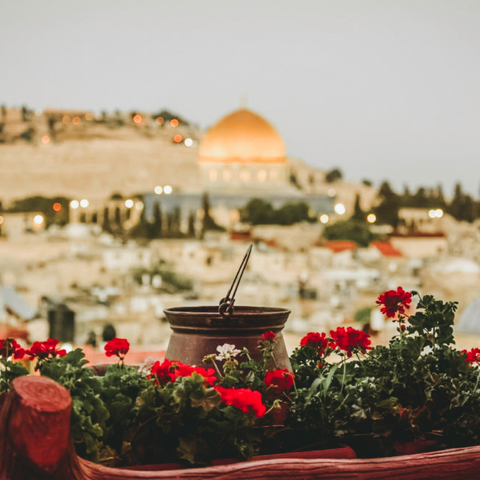
⭐️ Review: "We loved everything about our stay. Location was so central and within a walking distance everywhere we wanted to go to in the old city of Jerusalem. Room were so clean, comfortable beds. The view was astonishing..." - H Neumann
Walled Off Hotel
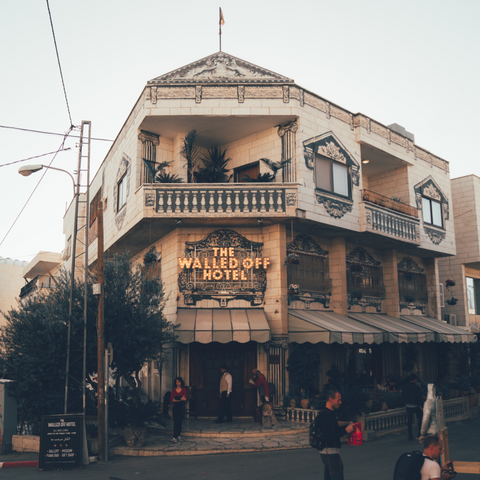
⭐️ Review: "Across the street from the Apartheid wall in Bethlehem is a hotel that artist Banksy has built a hotel that expresses the life of Palestinians due to the occupation. The staff were efficient, friendly, and so helpful." - Munir Alawi (Google Reviews)
DO NOT BOOK WITH AIRBNB!
In 2018, AirBnB committed to removing all listings from stolen homes in Palestine, but soon reversed their decision in 2019 listing settlements as vacation spots.
4. During Your Stay: Things You NEED To See and Eat
What You Need To See:
- Avoid touristic/historical sites in Jerusalem, the Old City, and the occupied Golan Heights which are run by the Israeli occupation.
- Increasingly visit Palestinian families in both the West Bank and Gaza, as well as camps.
- Traveling to Palestine is not just a vacation, but a beautiful reminder to acknowledge and take in the history and reality of what has happened throughout the land.
- Take a trip to the "Al-Aqsa Mosque Compound" and "The Old City" - Take a trip back into history by taking a step into the Old city of Jerusalem.
Foods You Need To Try:
We totally recommend that you try as much food as you can throughout your stay! There are so many mouthwatering flavors to take in and enjoy all over the streets of Palestine, so take advantage and enjoy the savory tastes the culture has to offer! Here are some hot spots we recommend you make it a point to stop by on your food tour!
- You cannot visit an Arab country without taking a sip of the beautiful caffeinated beverage we call coffee. Lucky for you, we have a separate blog about "6 Must Try Coffee Shops in Palestine" .
- BOOZA!🍦 You can never go wrong by spending an entire vacation eating ice cream. I would even go as far to say that it is sacrilegious to avoid it. Read our blog about the "5 Ice Cream Spots in Palestine You NEED to Know About" and add it to your Palestinian vacation.
5. Enjoying All There Is and More
- Watch a golden sunset at the top of the "Mount of Olives" in Jerusalem. The view at the top gives you the best orientation of the Old City, Ein Karem, and the horizon. This is a view that cannot be replicated anywhere else in the world. The view transcends words.
- Don't be scared to rock Pali Gear during your visit. Like aforementioned, avoid Pali Gear at checkpoints and airports, but there should be no fear in rocking a Pali Cap on the beach, or at the Al-Aqsa Compound. Represent your Pro-Palestine Gear with PRIDE.
- If you want to get an idea of what your experience in Palestine could look like, check out PaliRoots' own Palestine Travel Series available on our youtube channel right now.
6. Leaving You On A Final Note
Traveling to Palestine tends to be associated with some heartache and longing that may deter you from wanting to visit but we urge you to make it a point to take the time to explore Palestine's extensive and beautiful history. Take our advice and book your flight to Palestine as soon as you can. This blog was designed for your use to ensure a blissful and purposeful experience for you and your loved ones on your unforgettable journey.
- Choosing a selection results in a full page refresh.
- Opens in a new window.
Travel Advice for Palestine
Going to Palestine and need to know about the latest government travel advice for Palestine? Find the updated travel advice and travel warnings for Palestine from governments around the world, here.
General Travel Advice and Warnings for Palestine
The decision to go to Palestine is your choice and you are responsible for your individual welfare whilst in Palestine.
The content on this web page is provided for information only and compiled from travel advice and warnings for Palestine by authorities around the world to their citizens.
While we make every effort to give you most recent travel advice information, it is given on an “as is” basis without warranty of any kind, expressed or implied.
This operators of this web site does not assume responsibility and will not be liable for any damages in connection to the information provided.
Standard Cautions Travellers Need to Bear In Mind Whilst Travelling in Palestine
Crime – Petty crimes such as pick pocketing in a jampacked environment to sexual assault and robberies do happen in larger cities of Palestine. Make sure that all your personal valuables, including passports and other travel documents, are safe at all times.
Terrorism – Always be aware of your surroundings when in public areas. Be particularly cautious if participating in sporting events and throughout religious holidays and other public occasions, as terrorists often make use of such occasions to mount attacks.
Demonstrations and Protests – Demonstrations may occur. Even peaceful demonstrations can turn violent at any moment. They can also lead to disruptions to traffic and public transportation. It is in your interest of safety to avoid areas where demonstrations and big gatherings are occurring and follow the instructions of local authorities. Monitor local media in Palestine for information on continuous demonstrations in Palestine.
Scams – Take care in crowded tourist locations in Palestine, where scammers target foreigners. If you’ve been scammed in Palestine, reach a safe location immediately; take note, as soon as possible of the name and address of the facility where you were held; notify the cops in Palestine and get a record and if your credit card is used by the scammer call your credit card company to report the scam; they will likely request a copy of the police report to cancel the financial transaction.
Spiked Food and Drinks – Never ever leave food or drinks unattended or in the care of complete strangers when taking a trip in Palestine or anywhere else. Be wary of accepting snacks, drinks, chewing gum or cigarettes from unknown acquaintances. These items may have drugs that could put you in danger of sexual assault and robbery.
What is the entry/exit conditions for Palestine?
Every country or territory chooses who can get in or leave through its borders, in the same manner Palestine decides who enter its borders. The Government of your home country cannot intervene on your behalf if you do not satisfy your Palestine’s entry or exit requirements.
To get more information regarding the entry/exit requirement for Palestine see visa requirements for Palestine or get the most up to date info with the visa office at the Palestinian consulate in your home country.
Travel insurance for Palestine
Health cover is among the major reasons travellers obtain travel insurance. It will not prevent you getting ill or hurt, though it can stop you being affected financially. Medical aid overseas can be extremely expensive.
You should pay for all treatment you get overseas. You can’t expect to get free or subsidised care through your Palestine’s public health system, like you would in your home country.
If you can’t pay, local authorities might arrest you. The government from your home country can’t pay you medical bill for you, loan you money or get you out of jail.
You require travel insurance policy for travelling to Palestine . You also need to make certain you choose a plan that is right for you.
Check out the fine print of your travel insurance policy.
Declare all pre-existing conditions to your travel insurance firm upfront. If you don’t, you might invalidate your travel insurance policy.
Tell your travel insurance provider the activities you intend to do, prior to you go. Many common activities like skiing are omitted in basic policies. You might need to pay additional.
Check if you have complimentary credit card travel insurance. Some cards include travel insurance policy cover. Nonetheless, they frequently have different conditions than paid policies. Understand the differences.
If you’re going to Palestine from a country that has a reciprocal health care agreement, you still require travel health insurance. Agreements are limited in what they’ll will cover.
If you have a terminal health problem, you may not have the ability to obtain standard travel insurance. Nonetheless you may be able to get a specialised insurance provider that covers you for health, accidents or property issues unrelated to your health problem. Speak to your insurer to learn.
Discover more about getting worldwide travel insurance coverage for Palestine before you go.
© 2021 Government Travel Advice
- Terms and Conditions
- Privacy Policy
TravelAsker
Is it safe to travel to Palestine?
Travel Destinations
November 26, 2023
By Kristy Tolley
Is Palestine Safe To Visit?
Palestine has been a controversial destination for tourists due to the ongoing political conflict and violence in the region. However, despite the challenges, Palestine has a rich cultural heritage and beautiful landscapes that attract visitors from around the world. But, the question remains, is it safe to travel to Palestine?
The answer to this question is not straightforward. The safety of traveling to Palestine depends on various factors such as the current political situation, terrorism, crime, and health concerns. In this article, we will provide an overview of the safety concerns in Palestine and offer tips for travelers who plan to visit this region.
Historical Background of Palestine
Palestine has a long and complex history that dates back to ancient times. The region has been ruled by various empires, including the Byzantine Empire, the Ottoman Empire, and the British Empire. In 1948, the State of Israel was established, and this led to the displacement of many Palestinians from their homes.
Today, Palestine is divided into two territories, the West Bank and the Gaza Strip. The West Bank is under the control of the Palestinian Authority, while the Gaza Strip is controlled by the Hamas government. The political situation in Palestine is still a contentious issue, and it poses challenges for tourists who plan to visit the region.
Current Political Situation in Palestine
The political situation in Palestine is complex and often volatile. The conflict between Israel and Palestine has been ongoing for decades, and it has resulted in violence, protests, and unrest in the region.
The West Bank is generally considered to be safer than the Gaza Strip, which has experienced frequent clashes between the Israeli military and Palestinian militants. However, visitors to the West Bank should be aware of the checkpoints and restrictions on movement imposed by the Israeli military.
Tourists who plan to visit Palestine should monitor the news and stay informed of any changes in the political situation. It is also advisable to check with local authorities and tour operators before traveling to the region.
Terrorism and Violence in Palestine
Terrorism and violence are significant concerns for travelers to Palestine. The region has been the target of many terrorist attacks in the past, and there have been instances of violence directed at tourists.
In recent years, there have been fewer incidents of terrorism and violence in the West Bank. However, the Gaza Strip remains a high-risk area, and visitors should exercise extreme caution when traveling there.
Tourists should also be aware of the risk of kidnapping and hostage-taking in Palestine. Such incidents are rare but can occur, especially in the Gaza Strip.
Crime and Safety Concerns for Tourists
Crime is generally not a significant concern for tourists in Palestine. However, visitors should take precautions to avoid becoming victims of petty theft and pickpocketing. It is advisable to keep valuables out of sight and to be aware of your surroundings at all times.
Tourists should also be aware of the risk of gender harassment and assault in Palestine. Women travelers, in particular, should exercise caution and avoid traveling alone at night.
Safety Tips for Traveling to Palestine
If you plan to visit Palestine, there are several safety tips that you should keep in mind. These include:
- Check with local authorities and tour operators before traveling to the region.
- Avoid traveling to the Gaza Strip unless it is absolutely necessary.
- Be aware of your surroundings at all times.
- Keep valuables out of sight and avoid carrying large sums of cash.
- Dress modestly and respect local customs and traditions.
- Avoid traveling alone at night, especially if you are a woman.
Transportation Safety in Palestine
The road network in Palestine is generally safe, but visitors should exercise caution when traveling on highways and rural roads. The roads in the West Bank can be narrow and winding, and drivers should be prepared for unexpected obstacles.
Tourists should also be aware of the risk of car theft in Palestine. It is advisable to park in well-lit areas and to lock your car doors at all times.
Health Concerns for Travelers in Palestine
There are several health concerns for travelers to Palestine, including the risk of waterborne diseases and food poisoning. Visitors should drink only bottled or boiled water and avoid eating food from street vendors.
There is also a risk of contracting mosquito-borne illnesses such as malaria and dengue fever in Palestine. Travelers should take precautions to avoid mosquito bites, such as wearing long-sleeved clothing and using insect repellent.
Religious and Cultural Sensitivities in Palestine
Palestine is a predominantly Muslim country, and visitors should respect local customs and traditions. It is advisable to dress modestly and to avoid public displays of affection.
Visitors should also be aware of the sensitivity surrounding religious sites in Palestine. It is essential to show respect when visiting mosques, churches, and other religious sites.
Safety of Women Traveling Alone in Palestine
Women travelers should exercise caution when traveling alone in Palestine. Gender harassment and assault are rare but can occur, especially in crowded areas and at night. It is advisable to dress modestly and to avoid traveling alone at night.
Conclusion: Is It Safe to Travel to Palestine?
Palestine is a region with a complex history and ongoing political conflict. Visitors to Palestine should be aware of the safety concerns and take precautions to ensure their safety.
While there are risks associated with traveling to Palestine, many tourists have visited the region without incident. It is essential to stay informed of any changes in the political situation and to check with local authorities and tour operators before traveling to the region.
With proper planning and caution, visitors can enjoy the rich cultural heritage and beautiful landscapes of Palestine.
Resources and Contacts for Travelers to Palestine
- Consulate General of Palestine in the US:
- Israel Ministry of Tourism: https://www.goisrael.com
- US Department of State:
Related Posts
- Would you consider Palestine to be a wealthy or impoverished country?
- Who is interested in visiting Palestine?
- Which three religions consider Palestine as their Holy Land?
- Which three geographical regions constitute Palestine?
- Which religion is practiced in Palestine?

Kristy Tolley
Leave a comment cancel reply.

Maldives bans Israeli passport holders over war on Gaza
The Indian Ocean archipelago’s ban comes in solidarity with the besieged people of Gaza facing unrelenting attacks and mass hunger.

The Maldives government will ban Israelis from the Indian Ocean archipelago known for white sand beaches and luxury resorts as public anger in the predominantly Muslim nation rises over the war in Gaza.
President Mohamed Muizzu has “resolved to impose a ban on Israeli passports”, a spokesman for his office said in a statement, without giving details of when the new law would take effect.
Keep reading
‘we will not accept the rule of hamas in gaza at any stage’: israel ‘we will not accept the rule of hamas in ..., it is not ‘ethnic cleansing’, it is genocide it is not ‘ethnic cleansing’, it is ..., israelis urge netanyahu to accept us peace plan for gaza israelis urge netanyahu to accept us ..., gideon levy: israel has achieved nothing with war on gaza gideon levy: israel has achieved nothing ....
Muizzu also announced a national fundraising campaign called “Maldivians in Solidarity with Palestine”. Nearly 11,000 Israelis visited the Maldives last year, which was 0.6 percent of total tourist arrivals.
Official data also shows the number of Israelis visiting the Maldives dropped to 528 in the first four months of this year, down 88 percent compared to the corresponding period last year.
Opposition parties and government allies in the Maldives have been putting pressure on Muizzu to ban Israelis as a sign of protest against the Gaza war. At least 36,439 Palestinians have been killed and 82,627 wounded in the conflict since October 7.
‘We’re good’
The Maldives lifted a previous ban on Israeli tourists in the early 1990s and moved to restore relations in 2010. However, normalisation attempts were scuttled following the toppling of President Mohamed Nasheed in February 2012.
In response to the ban, an Israel foreign ministry spokesman urged citizens currently in the Maldives to depart. “For Israeli citizens staying in the country, it is recommended to consider leaving, since if they fall into distress for any reason, it will be difficult for us to help.”
Israeli passport holders have also not been allowed to enter Algeria, Bangladesh, Brunei, Iran, Iraq, Kuwait, Lebanon, Libya, Pakistan, Saudi Arabia, Syria, and Yemen.
In a post on X in March, the State of Israel said: “We’re good,” in response to a post about these countries’ entry bans, which had been in place prior to the onset of the ongoing war in Gaza.
We’re good pic.twitter.com/GmiwEzZGck — Israel ישראל (@Israel) March 14, 2024
'I'm not sure this helps us much': European countries are recognizing an official Palestinian state
Will these new recognitions, which the u.s. and larger european nations have not joined, bring full palestinian statehood closer and improve the lives of palestinians.

It has a flag. A national anthem. Diplomats. Even its own international dialing code. In fact, three-quarters of the world's 195 countries − 143 U.N. member states plus the Vatican and Western Sahara − say it is a state.
A decision by Ireland, Norway and Spain to recognize an independent Palestinian state , which officially took effect Tuesday, comes nearly eight months into Israel's war with Hamas in the Gaza Strip, and decades into one of the world's most high-profile and intractable conflicts , between Israelis and Palestinians.
Spain's Prime Minister Pedro Sanchez said Tuesday that "recognition of the State of Palestine is not only a matter of historic justice," it is also "an essential requirement if we are all to achieve peace."
But what does this formal statehood label mean? And will these recognitions, which the U.S. and larger European nations have not joined, bring full Palestinian statehood closer, and improve the lives of Palestinians?
After Rafah strike: Netanyahu vows to keep fighting 'until we raise the flag of victory'
Rowan Nicholson, a scholar of international law at Australia's Flinders University, said that to qualify as a state four criteria are typically required: a permanent population, a defined territory, a government, and independence.
He said the conditions for statehood are both fairly rigid and a matter of debate.
"The criteria have developed over the centuries through the practice of states. There’s no single definitive written version of them; they are fuzzy and open to interpretation," said Nicholson, who has worked on cases before the International Court of Justice , a Hague, Netherlands-based court that last week ordered Israel to halt its military operation in Rafah, in Gaza, as part of a war crimes allegations case brought by South Africa.
"But one attempt to write them down that people often refer to is the Montevideo Convention of 1933 . There are exceptions. For example, you can’t create a new state by unlawfully invading an existing state and separating off part of it, as Russia tried to do a few years ago with Ukraine," he said.
Still, in the Palestinian context, one reason to doubt Palestine qualifies as a state as defined by the Montevideo Convention and similar formulations, said Nicholson, is it doesn’t have effective independence from Israel.
Israel's military occupies Palestinian lands. Israel supervises some civilian aspects of life in the Fatah-run West Bank, and even before the current war it largely controlled access to Hamas-run Gaza.
A Palestinian state, step-by-step
Larry Garber, a former U.S. Agency for International Development mission director to the West Bank and Gaza, said the U.S. has long taken the view that any formal recognition of a Palestinian state should come only through the direct negotiation between the relevant parties: between Israelis and Palestinians.
"For many years, we all operated on the basis of a theory that this should be done in stages," Garber said. "First, Palestine should build up the various attributes of a state, such as good governance and an independent economy that operated effectively, then statehood would be the ultimate goal."
Germany and France echoed this position, and they still do.
"Our position is clear: the recognition of a Palestinian state is not a taboo for France," the country's Foreign Minister Stephane Sejourne said in a statement last week. However, Sejourne added "this decision must be useful; that is to say, (it must) allow a decisive step forward on the political level. France does not consider that the conditions have been present to date for this decision to have a real impact in this process."
Mai’a Cross, a professor of political science at Boston's Northeastern University, said the recent European recognitions are essentially saying they recognize the "aspirations" of a future Palestinian state.
"You could say technically, in legal terms, this is pure symbolism. But I do think it is more than that because it's not as though there's only symbolism versus legality. There's politics − international relations is full of politics."
Cross said one "tangible" impact of the recognitions is the message they send to Israel Prime Minister Benjamin Netanyahu. Netanyahu has repeatedly rejected calls for Palestinian sovereignty. He even spent years, Israeli media has claimed, propping up Hamas in Gaza as a counterweight to the Palestinian Authority's attempts from the West Bank to advance toward the establishment of a two-state solution.
Legal scholars such as Marc Weller, who chairs international law and constitutional studies at the University of Cambridge, agreed. He said that "the recognizing states are saying 'we will now change the status (of Palestine) from an entity that ought to be a state into an entity that we claim is a state.' That makes it more difficult for Israel to deny (Palestine) has a right to become a state. The recognitions are deliberately framed to oppose Netanyahu's assertions that there can't be a two-state solution," he said.
"It's a powerful political tool to help isolate Israel's denial over Palestinian statehood," said Weller.
Palestine state recognition − and its trappings
Garber said that the recognitions do nevertheless have some concrete consequences.
"They upgrade the diplomatic relations between Palestine and the recognizing state, including potentially allowing for the exchange of ambassadors. It allows them to sign more formal treaties," he said.
Nicholson, the legal scholar in Australia, said "whether or not the entity really meets the criteria, the recognizing state commits to treating it as a state for practical purposes."
That means, he said, it will do things like accept passports, grant sovereign immunity to officials, and generally act as if the recognized entity is entitled to govern its own territory.
“Recognition of Palestine is not the end of a process, it is the beginning," said Simon Harris, the taoiseach, or prime minister, of Ireland, in apparent nod to this, when announcing his nation's Palestine recognition.
Slovenia and Malta indicated they may also recognize a Palestinian state, and Palestinian officials have expressed optimism that more soon could follow, though Israel's Foreign Minister Israeli Katz has described the development as sending a message to Palestinians and the world that "terrorism pays."
'I'm not sure this helps us much'
Earlier in May, the U.N. General Assembly adopted a resolution declaring that Palestinians qualify for full U.N. membership status. The Assembly can only grant full membership with the approval of the Security Council, which the U.S. would likely veto. Some of this U.S. support for Israel can be explained in historical terms.
The U.S. was one of the first countries to recognize Israel as an independent state, in 1948. It is a major supplier of weapons to Israel. American diplomats have habitually framed Israel as a lone democracy and security partner in the Middle East that shares values and interests with the U.S.
Still, Amed Khan, who worked on Bill Clinton's presidential campaigns and held several U.S. government positions and has been described as a "direct action philanthropist" who travels to the frontlines of humanitarian crises and uses his own personal wealth to purchase and distribute aid, said there was a simpler explanation for the lack of a U.S. recognition of a Palestinian state.
"What data point does anybody need to say that, basically, the U.S. is carrying out Israeli policy," he said.
"It's not hyperbole to say that the U.S. is doing everything it can to prevent recognition of Palestine because that limits Palestine's ability to exercise state functions locally, regionally and internationally."
One example, according to Khan: "The U.S. can't even get Israel to open up its land borders, so it ends up spending hundreds of millions of dollars on a floating pier that's delivering almost nothing," a reference to a Pentagon-built dock that has encountered various troubles fulfilling its mission.
Towed to Israel for repairs: Pentagon's $320 million pier in Gaza trashed by rough sea and storms
Omar Shaban, founder of the Gaza-based think tank PalThink for Strategic Studies, put it more diplomatically.
"Of course we appreciate this recognition," the Palestinian said, by phone from Brussels, where he was meeting with European officials. Shaban escaped Gaza three months ago and currently lives in Cairo. "But I'm not sure if this helps us much. The situation for Palestinians is not improving at all − with the war in Gaza; with the government in Israel; with the Palestinian divide; with the fear we have."
On Monday, an Israeli airstrike triggered a massive blaze killing 45 people in a tent camp in the Gaza city of Rafah . In its wake, as Palestinian families rushed to hospitals to prepare their dead for burial, global leaders urged the implementation of an International Court of Justice order to halt the assault.
Palestinians, Shaban said, would prefer Europeans help to stop Israel's war in Gaza, to a statehood recognition.
"Let us get help to stop the killing," he said.

5 Google Maps Tips You Need To Know When Planning Your Next Trip
W hether a brief weekend escape or an extensive expedition across continents, planning a trip can be a daunting task. The challenge of selecting the ideal destinations, navigating through unfamiliar territories, and ensuring that you experience all the essential sights without overlooking anything, can quickly become overwhelming for any traveler. This is where online maps come into play, and one prominent tool that almost everyone has used at some point is Google Maps.
Google Maps goes beyond basic directions . It offers a suite of features designed to make trip planning not just easier, but also more enjoyable. You can map out itineraries, discover new attractions, get insights into local restaurants and services, and even find electric vehicle charging stations . The platform's real-time updates, user reviews, and detailed information on points of interest can help you make informed decisions while exploring new destinations. Moreover, its customization features allow you to create personalized maps that cater specifically to your travel plans, which are also shareable. Here are five essential Google Maps tips that every traveler should know. These tips will not only help you streamline your trip-planning process but also ensure that your travels are as smooth and enjoyable as possible.
Read more: 12 Smart Gadgets You Didn't Know Existed
Utilizing Offline Maps
When you're heading out on a trip, one thing you definitely don't want to worry about is losing access to your maps when your signal drops. That's where offline maps come in handy. Google Maps allows you to download maps for offline use, ensuring you never get lost even when you're off the grid.
Downloading maps for offline use is a straightforward process. Follow these steps:
- Open the Google Maps app on your smartphone or tablet.
- Tap on your profile icon in the top-right corner.
- Choose Offline maps.
- Tap Select your own map in the following window.
- Drag the map window to your desired area.
- Select Download.
Depending on the size of the area you're downloading and your internet connection speed, this process may take a few moments.
Once the download is complete, you'll be able to access the map even without an internet connection. Offline maps are not only convenient, but they can also save you time and frustration. Imagine hiking in a remote area and losing your cell signal — having the offline map ensures you can still navigate your way back to your starting point without any hassle. This is also one of the many secret Google Maps features that can come in handy.
Customizing Your Route With Multiple Stops
We all have days packed with errands or sightseeing, where we just wish we could plan the routes efficiently. Google Maps allows you to do that by customizing your route with multiple stops. It's a nifty feature that can save you time and make your trips more organized.
Follow these steps:
- Open Google Maps on your device and enter your final destination.
- Click on the three buttons next to your starting point and select Add stop.
- You can add multiple stops by repeating this step.
- Rearrange stops by dragging the three lines next to each destination.
Now, Google Maps will calculate the most efficient route for you, taking into account all your stops along the way. This is perfect for those days when you have several places to visit or errands to run, but you want to make sure you're not zigzagging all over town. It can also save you time and fuel. Plus, it's a great way to ensure you don't forget any important stops along the way.
When customizing your route with multiple stops on Google Maps, keep in mind to arrange your stops in a logical order to minimize backtracking and optimize efficiency. Additionally, consider traffic conditions and estimated travel times between each stop to plan your schedule accordingly. Lastly, ensure that all stops are accurately inputted to avoid any confusion or missed destinations along the way.
Taking Advantage Of Live Traffic Updates
This feature provides real-time information about traffic conditions, allowing you to avoid packed routes and save valuable time.
As you navigate with Google Maps, the app constantly monitors traffic conditions along your route. If there is heavy traffic, accidents, or road closures ahead, Google Maps will highlight the problematic area on the map using yellow or red markers.
To enable live traffic updates, open the Google Maps app and enter your destination. Once your route is set, Google Maps will display real-time traffic information along the way, including any incidents or slowdowns. You can then choose to follow the suggested route or explore alternative options based on the traffic conditions.
When using live traffic updates on Google Maps, keep in mind to regularly check for updates throughout your journey to stay informed about changing road conditions. You can also report problems on the road yourself on Google Maps . Lastly, be flexible with your travel plans and prepared to follow alternative routes suggested by Google Maps to avoid congestion and minimize travel time.
By taking advantage of live traffic updates, you can make informed decisions about your route and avoid getting stuck in gridlock. Whether you're commuting to work or heading out on a road trip, this feature can help you reach your destination more efficiently.
Exploring Nearby Attractions And Restaurants
When you're in a new area, or even just exploring your own neighborhood, Google Maps can be a great tool for discovering nearby attractions and restaurants.
To start exploring:
- Open Google Maps and zoom in on the area of your interest. You should see several options below the search bar, including Restaurants, Gas, Coffee, Shopping, ATMs, and more.
- Click on the option you want to explore. For instance, if you are looking for places to eat nearby, select Restaurants to see a list of dining options in the area. Each restaurant will be marked with its location on the map, along with details such as the establishment's name, its rating, and sometimes photos or reviews.
- Refine your search further by applying filters for rating and distance.
- After selecting a restaurant that catches your interest, click on it to view more detailed information, including its address, hours of operation, contact details, and directions on how to get there.
Google Maps also allows you to call the restaurant directly from the app if you wish to make a reservation or inquire about menu items.
You can explore all these categories by swiping right on the options pane below the search bar. To view the full list, click on the More button (three dots) at the very end.
Create A Custom Map To Share With Friends And Family
You can also easily create a custom map and share it with whoever you want on Google Maps. It's a great way to collaborate on travel plans, recommend must-visit places, or simply share your favorite local hangouts.
- Open Google Maps on your computer and sign into your Google account.
- Click on the menu icon and choose Saved > Maps > Open My Maps.
- Start a new map by clicking the Create A New Map button.
- Give your map a title and a description that encapsulates the essence of your adventure or theme. This could be anything from "Family Road Trip to Yellowstone" to "Best Coffee Shops in New York City."
- Populate your map with markers. Click on the marker icon, then click on the location on the map you wish to mark. For each marker, you can add a detailed description, upload photos, and even include links for more information.
- Additionally, Google My Maps allows you to draw paths and shapes, perfect for outlining routes or highlighting areas of interest.
- Once your map is ready, click on the Share button. Here, you'll be prompted to set the map's privacy settings. You can choose to make it public, share it with specific people, or keep it private with a link.
- Finally, invite your friends via email or simply send them the link.
Read the original article on SlashGear .
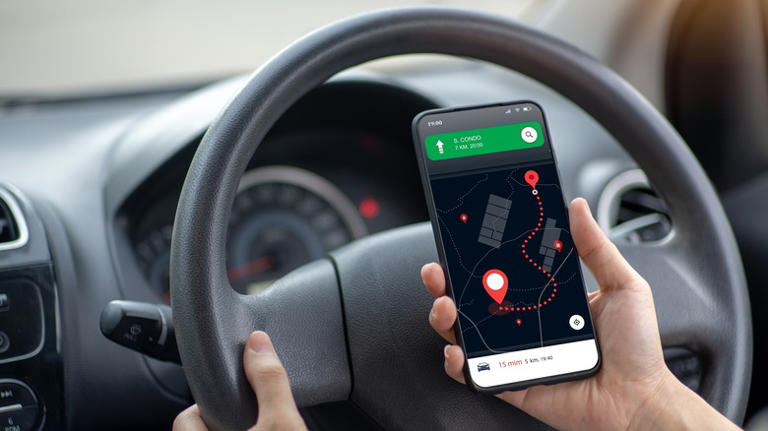
Security Alert May 17, 2024
Worldwide caution, update may 10, 2024, information for u.s. citizens in the middle east.
- Travel Advisories |
- Contact Us |
- MyTravelGov |
Find U.S. Embassies & Consulates
Travel.state.gov, congressional liaison, special issuance agency, u.s. passports, international travel, intercountry adoption, international parental child abduction, records and authentications, popular links, travel advisories, mytravelgov, stay connected, legal resources, legal information, info for u.s. law enforcement, replace or certify documents, before you go.
Learn About Your Destination
While Abroad
Emergencies
Share this page:
Crisis and Disaster Abroad: Be Ready
What the Department of State Can and Can't Do in a Crisis
Information for U.S. Citizens about a U.S. Government-Assisted Evacuation
Traveler's Checklist
Safety and Security Messaging
Best Practices for Traveler Safety
Staying Connected
Smart Traveler Enrollment Program (STEP)
Traveler Information
LGBTQI+ Travelers
Adventure Travel
High-Risk Area Travelers
Travelers with Dual Nationality
Journalist Travelers
Faith-Based Travelers
Pilgrimage Travelers (Hajj and Umrah)
U.S. Students Abroad
Cruise Ship Passengers
Women Travelers
Travelers with Disabilities
Older Travelers
U.S. Volunteers Abroad
Travelers with Pets
Travelers With Firearms
Travel Agents
Travel Safety - Race and Ethnicity
U.S. Travelers in Europe's Schengen Area
Your Health Abroad
Insurance Coverage Overseas
Driving and Road Safety Abroad
Customs and Import Restrictions
Information for U.S. Citizens in Russia – Travel Options Out of Russia
Lodging Safety
Paris 2024 Olympics and Paralympics
In Europe's Schengen area , your passport must be valid for at least six months at the time of your entry. At present, the Schengen area includes most European Union (EU) countries, except for Cyprus and Ireland.
If you are transiting through Canada or the United Kingdom (UK) enroute to the Schengen area : your passport must be valid for at least six months, even though Canada and the UK do not themselves have the six-month rule. If your passport will expire within six months, airlines may not let you board your onward flight to Europe.
Traveling in Europe
If you plan to travel in Europe, you need to know about the Schengen Borders Agreement, which allows you to move freely within a number of countries without border checks. Tourists, exchange students, and people visiting for business from certain countries, like the United States, can travel in the Schengen area for up to 90 days. The Schengen area includes most EU countries, except for Cyprus and Ireland. It also includes four non-EU countries: Iceland, Norway, Switzerland, and Liechtenstein.
Before you travel to the Schengen area, we recommend you do the following:
- Check the expiration date on your passport book carefully before traveling to Europe. Ensure your passport book is valid for at least six months when you enter the Schengen area. This is especially important for minors under age 16 as their passports are only valid for five years. In contrast, U.S. citizen adults aged 16 and older receive passports that are valid for 10 years.
- Always carry your passport book with you when traveling to another country in the Schengen area. Even if there is no border check at that time, officials may reinstate border controls without notice.
- Be prepared to explain your purpose of travel.
- Be prepared to provide proof of sufficient financial resources for the visit.
- Comply with other entry requirements for each country you will visit or transit.
On our Country Information pages , you can find passport validity requirements and other important information for your destination country. If your passport does not meet the Schengen requirements, you may be:
- Refused boarding by the airline at your point of origin or while transferring planes.
- Denied entry when you arrive in the Schengen area, regardless of how long you will stay.
An immigration official will determine if you qualify for visa-free entry to the Schengen area when you first cross any external Schengen border. You will have to present your passport at that time. The officer may deny your entry if you do not qualify.
You should also check passport validity requirements if traveling onward from the Schengen area to a country outside the Schengen area. You can find this information in our Country Information pages.
HOW LONG CAN I REMAIN?
- With a valid U.S. passport book, you can stay up to 90 days in the Schengen area for tourism or business during any 180-day period. You must wait an additional 90 days before applying to re-enter the Schengen area.
- If you plan to stay in the Schengen area longer than three months, contact the embassy of the country where you plan to spend the majority of your time and apply for a visa.
Countries in the Schengen area may reinstate temporary internal or external border control without notice. U.S. citizens should carry their U.S. passport book at all times when entering or leaving the Schengen area. They should also bring it when traveling between Schengen countries.
How can the U.S. government help me if border officials do not let me enter?
- We can give you the contact information of foreign embassies of the countries you wish to visit.
- We can provide information about hiring an English-speaking foreign attorney overseas if you choose to do so.
- Note: We cannot influence a foreign government’s decision about allowing you to enter. We cannot intervene in another country’s criminal or administrative procedures.
What countries are members of the Schengen Borders Agreement?
Click on the country name for more information.
Bulgaria (entering in March 2024)
Czech Republic
Liechtenstein
Netherlands
Romania (entering in March 2024)
Switzerland
Enroll in STEP

Subscribe to get up-to-date safety and security information and help us reach you in an emergency abroad.
Recommended Web Browsers: Microsoft Edge or Google Chrome.
Learn about your destination
Make two copies of all of your travel documents in case of emergency, and leave one with a trusted friend or relative.
External Link
You are about to leave travel.state.gov for an external website that is not maintained by the U.S. Department of State.
Links to external websites are provided as a convenience and should not be construed as an endorsement by the U.S. Department of State of the views or products contained therein. If you wish to remain on travel.state.gov, click the "cancel" message.
You are about to visit:
Advertisement
Supported by
Soccer’s Governing Body Delays Vote on Palestinian Call to Bar Israel
FIFA said it would solicit legal advice before taking up a motion from the Palestinian Football Association to suspend Israel over its actions in Gaza and the West Bank.
- Share full article

By Tariq Panja
reporting from Bangkok
FIFA, soccer’s global governing body, on Friday postponed a decision to temporarily suspend Israel over its actions during the conflict in Gaza, and in the West Bank, saying it needed to solicit legal advice before taking up a motion submitted by the Palestinian Football Association.
The motion calling for Israel’s suspension referred to “international law violations committed by the Israeli occupation in Palestine, particularly in Gaza,” and cited violations of FIFA’s human rights and discrimination statutes.
Responding to emotionally charged addresses at FIFA’s annual congress by the head of the Palestinian soccer body, Jibril Rajoub, FIFA’s president, Gianni Infantino, said the urgency of the situation meant he would convene an extraordinary meeting of FIFA’s top board on July 25.
Before that meeting, he said, FIFA will ask experts to analyze whether Israel’s actions breach the governing body’s regulations. By contrast, in 2022, FIFA acted quickly to bar Russian teams and clubs from competitions after the country’s forces launched a full-scale invasion of neighboring Ukraine.
Mr. Rajoub has for years pursued sanctions against Israel and its teams over a variety of issues, including freedom of movement for Palestinian players and for allowing teams based in territory overseen by the Palestinian soccer federation to play in Israel’s domestic leagues. Since Israeli forces invaded Gaza last October in retaliation for the Hamas-led attacks on Oct. 7, all soccer infrastructure in the territory, including a historic stadium, has been destroyed, Mr. Rajoub said.
Israel’s soccer chief, Moshe Zuares, called the Palestinian motion “cynical.” But the possibility of even a temporary ban on its teams could have immediate consequences: Israel is set to compete in the men’s tournament at the Paris Olympics around the time of the FIFA meeting in July, and to begin qualifying for the 2026 men’s World Cup later this year.
Both Israeli and Palestinian officials had used the run-up to Friday’s congress to lobby officials from other national federations. A day earlier, at a meeting of Asian soccer’s governing body, members were shown a video showing the effects of the war in Gaza and then unanimously approved a decision to back the Palestinian federation’s motion.
Palestinian officials addressed FIFA’s 211 members twice during Friday’s meeting, and were followed by an official from Jordan who demanded action from FIFA.
While acknowledging the urgency of the matter, Mr. Infantino declined to call a vote. Instead, he said, the organization’s 37-member governing council would decide what to do in two months.
“FIFA will mandate as of now an independent legal expertise to assess the three requests made by the Palestinian Football Association and make sure that the status and regulations of FIFA are applied in the correct way,” he said.
Tariq Panja is a global sports correspondent, focusing on stories where money, geopolitics and crime intersect with the sports world. More about Tariq Panja
Our Coverage of the Israel-Hamas War
News and Analysis
Benny Gantz, a key centrist figure in Israel’s war cabinet, quit the government over Prime Minister Benjamin Netanyahu’s handling of the war in Gaza. The resignation is likely to make Netanyahu more dependent on his right-wing partners .
The Israeli military rescued four hostages from Gaza amid a heavy air and ground assault, resulting in a high death toll among Palestinians . The news was met with jubilation in Israel, but the euphoria may be fleeting .
An American-made, precision guided bomb was used in airstrikes in Gaza that killed dozens of Palestinians, including women and children. The weapon was recently used in an attack at a former U.N. school .
The Other War: The rescue of four hostages in Gaza in a ferocious assault offered a glimpse into an ambitious Israeli intelligence operation aimed at bringing home those held by Hamas.
Where Gazans Are Detained: Since Israel invaded Gaza, the Sde Teiman military base has been filled with blindfolded, handcuffed Palestinians, held without charge or legal representation. Our reporters went inside .
A Careful Dance: Israel and Hezbollah have traded fire across the Lebanese border since the start of the war in Gaza. Yet whenever the fighting escalates, both sides seem to calibrate their attacks to avoid a larger conflict .
This free line-cutting app could save you hours at the airport
Skip the wait at customs and immigration with Mobile Passport Control, travel’s best open secret.

A month ago, I flew from Paris back to Baltimore full of despair: My vacation was over , and the trip home seemed to take an eternity .
Then I saw the snaking line for customs and immigration.
What could have sunk me into a deeper woe actually revived me, because I didn’t have to wait in that soul-sucking purgatory. I didn’t have to wait in the shorter but still well-populated Global Entry line, either.
Instead, I headed to a third option that most people miss: the Mobile Passport Control (MPC) line. Thanks to this secret national treasure, I was out of the airport and hailing my Uber in eight minutes. (I timed it.)
You, too, can experience this completely free VIP treatment the next time you fly internationally. Here’s how.
What is Mobile Passport Control?
Think of Mobile Passport Control like a fast pass for international travel. It’s a free service that allows select travelers to access a U.S. Customs and Border Protection (CBP) express lane with a smartphone app.
To be eligible, you must be a U.S. citizen, a lawful permanent resident, a Canadian B1/B2 citizen visitor or a returning Visa Waiver Program traveler with approved Electronic System for Travel Authorization.
You can use the app only when returning from an international trip at an MPC-approved site . That includes more than 30 U.S. international airports, 14 pre-clearance locations (among them airports in Abu Dhabi, Aruba and Ireland) and four seaports.
Why don’t more people use it?
Although you’ll see signs promoting Mobile Passport around those sites and sometimes ads on in-flight entertainment systems, most people aren’t taking advantage of the service. Just 8 percent of eligible travelers used the app in the 2024 fiscal year, according to CPB spokesman Aaron Bowker, though that’s a 50 percent increase from the year before.
The company Airside Mobile originally developed the app and launched it in 2014, first at Atlanta’s Hartsfield-Jackson International Airport. Awareness of its powers seemed to spread mostly by word of mouth and some signs around airports. In 2022, CBP officially took over the app, launching an updated version that left the original defunct. Some travelers missed the memo and figured the service had been discontinued when their app no longer worked.
But CBP is invested in the program’s growth.
“We’ve expanded the population of travelers that are able to use it. We’ve started to educate the airports. Airports have started to put in a better queuing system,” Bowker said. “And so we’re expecting to see this continue to increase.”
How Mobile Passport works
First, download the Mobile Passport app from the Google Play Store or Apple App Store . Unlike line-cutting services such as Global Entry or TSA PreCheck , MPC doesn’t require preapproval or an application process. Even if you forget to do it before your trip, it’s so quick to set up, you can install it as you’re walking up to customs.
When it’s time to pass through, eligible travelers can fire up the app, answer the standard few questions about their trip that they would at a customs kiosk, take a selfie and proceed to a dedicated Mobile Passport lane, where an officer will confirm their details and wave them through. Individual travelers and families of up to 12 people can use the app at once.
It makes me feel like a fancy diplomat — not someone who just spent 12 hours in economy — every time I use it.
Mobile Passport vs. Global Entry
Mobile Passport and Global Entry both promise a faster airport experience. Both also come with pros and cons.
One MPC downside: Although it’s free to use and rarely has a line of more than a few travelers, it’s not at every airport. And Mobile Passport lanes may not always be available even in places that claim to offer it.
CBP spokeswoman Corey Daboin said the agency is aware of that problem. Sometimes, issues are due to infrastructure constraints — some airports may not have the lanes available to operate MPC continuously — or management. The agency stresses, however, that Mobile Passport is a priority, and “we are working on making that so it’s not an issue moving forward,” Daboin said.
If you fly internationally and your home airport doesn’t have MPC yet, Global Entry is a great option. It does cost $100 and requires an application and interview process. But it also comes with a TSA PreCheck membership and is good for five years — plus it’s still light-years better than waiting in that endless regular line.
More travel tips
Vacation planning: Start with a strategy to maximize days off by taking PTO around holidays. Experts recommend taking multiple short trips for peak happiness . Want to take an ambitious trip? Here are 12 destinations to try this year — without crowds.
Cheap flights: Follow our best advice for scoring low airfare , including setting flight price alerts and subscribing to deal newsletters. If you’re set on an expensive getaway, here’s a plan to save up without straining your credit limit.
Airport chaos: We’ve got advice for every scenario , from canceled flights to lost luggage . Stuck at the rental car counter? These tips can speed up the process. And following these 52 rules of flying should make the experience better for everyone.
Expert advice: Our By The Way Concierge solves readers’ dilemmas , including whether it’s okay to ditch a partner at security, or what happens if you get caught flying with weed . Submit your question here . Or you could look to the gurus: Lonely Planet and Rick Steves .


IMAGES
COMMENTS
Help from FCDO in Israel and the OPTs. Consular support is severely limited where FCDO advises against travel. If you need consular assistance call: +44 176 766 7600 (UK number) +972 (0)3 725 1222 ...
Reconsider travel due to terrorism and civil unrest. U.S. government employees in Israel under Chief of Mission security responsibility are currently restricted from all personal travel to the West Bank, except: U.S. government employees can use Routes 1, 90, and 443 at any time. U.S. government employees are permitted personal travel to Jericho.
General Travel Advice. Please follow advice from local authorities and stay informed of the security situation. All demonstrations and public gatherings should be avoided. ... The Department of Foreign Affairs advises against all travel to the occupied Palestinian territory (oPt), with the exception of East Jerusalem, where we advise against ...
Don't join others seeking to break the blockade. Previous attempts to break the blockade have resulted in death, injury, arrest or deportation of foreigners (see 'Full advice'). Our overall travel advice level for Israel and the Occupied Palestinian Territories remains at reconsider your need to travel, with higher levels applied to some areas.
Individuals of Palestinian or Arab descent may be subject to increased scrutiny, detention, and arrest. Israeli checkpoints have increased in number throughout the West Bank. ... We take the safety and security of Canadians abroad very seriously and provide credible and timely information in our Travel Advice to enable you to make well-informed ...
Call us in Washington, D.C. at 1-888-407-4747 (toll-free in the United States and Canada) or 1-202-501-4444 (from all other countries) from 8:00 a.m. to 8:00 p.m., Eastern Standard Time, Monday through Friday (except U.S. federal holidays). See the State Department's travel website for the Worldwide Caution and Travel Advisories.
Latest FCDO travel advice for the Occupied Palestinian Territories including on entry requirements, safety and security and local laws and customs.
COVID-19. If you are planning international travel at this time, please read our COVID-19 related travel advice here, alongside our destination specific travel advice below.. Do not travel. Do not travel to Israel due to the unpredictable security situation (level 4 of 4).. Do not travel to the occupied Palestinian territory of Gaza (including the waters off Gaza) due to the unpredictable ...
The updated travel policies, which go into effect July 20, will allow all U.S. citizens to travel to Israel via all ports of entry, including Ben Gurion Airport. This policy applies to all U.S. citizens, including Palestinian Americans on the Palestinian population registry. For entry into the Visa Waiver Program, the complete list of ...
Photo: gary yim /Shutterstock. Start in Bethlehem. Take a taxi (15 minutes) or the Bus 21 from Jerusalem (near Damascus Gate in the Old City, it takes 30 minutes). Once in Bethlehem, hire a taxi driver (negotiate the fixed price first) to take you around.
The only cheap thing you are bound to get in Palestine is staple food - hummus, falafel, and similar. A meal will cost you between $10 and $20 USD - and that's if you manage to get to a place that is not overpriced. Accommodation starts from $20 USD for a bed in a dorm. Not exactly a budget friendly place.
Bus nº485 costs 16ISL (7USD), departs every half an hour or so from the first floor and leaves you at the Central Station. Sherut (shared mini-vans) cost 68ISL (19USD), depart more often, are faster and leave you closer to your final destination. During Shabat, bus nº485 doesn't run. Yehuda market at closing time.
Advice for All Destinations COVID-19. Read the information on the COVID-19: Health Considerations for Travel page for advice on travelling during the COVID-19 pandemic.. Vaccinations and malaria risk. Review both the Vaccination and Malaria sections on this page to find out if you may need vaccines and/or a malaria risk assessment before you travel to this country.
Sandwiched between Jordan and Israel, the Palestinian West Bank encompasses 2,173 square miles of diverse landscapes, ancient landmarks, and deeply-storied cultures. Despite this, most information ...
Palestine: Comprehensive Travel Guide 2024 & 11-day Itinerary. OnOct 8, 2023. ByRomana. This ultimate travel guide to Palestine (West Bank) is everything you need to know for an independent trip to the most interesting places in Palestine. Read our 11 days Palestine itinerary with detailed descriptions of transportation, including the exact ...
Advice. Travellers'. Diarrhea Kits. Available. The Palestinian Territories of the West Bank and Gaza give travellers access to the famous Dead Sea and a warm Mediterranean climate. Much of the West Bank is devoted to growing olives, which are important to the Palestinian economy and culture. About 45% of land in the territories is used for ...
Palestine Travel Vaccines and Advice. Palestine is a country where the colours orange, red and yellow blend together. Offering ancient biblical sites, the land is deemed as sacred by many groups, and proves a very interesting place to visit. For sweeping views of the territory, making the ascent to the Mount of Temptation Monastery is well ...
Advice. Travelers'. Diarrhea Kits. Available. The Palestinian Territories of the West Bank and Gaza give travelers access to the famous Dead Sea and a warm Mediterranean climate. Much of the West Bank is devoted to growing olives, which are important to the Palestinian economy and culture. About 45% of land in the territories is used for olives.
TRAVEL TIPS FOR PALESTINE. PALESTINE TRAVEL TIPS. Here are a few travel tips for Palestine: Plan ahead: Palestine is a complex and dynamic region, and it can be helpful to do some research and plan your trip in advance. This can help you avoid potential challenges and make the most of your time in the country.
4. During Your Stay: Things You NEED To See and Eat. What You Need To See: Avoid touristic/historical sites in Jerusalem, the Old City, and the occupied Golan Heights which are run by the Israeli occupation. Increasingly visit Palestinian families in both the West Bank and Gaza, as well as camps.
General Travel Advice and Warnings for Palestine. The decision to go to Palestine is your choice and you are responsible for your individual welfare whilst in Palestine. The content on this web page is provided for information only and compiled from travel advice and warnings for Palestine by authorities around the world to their citizens.
Traveling to Palestine may pose potential risks due to ongoing political tensions and security concerns. It is important to stay informed of the current situation and exercise caution while in the region. ... Is it safe to travel to Palestine? Travel Destinations. November 26, 2023.
Muizzu also announced a national fundraising campaign called "Maldivians in Solidarity with Palestine". Nearly 11,000 Israelis visited the Maldives last year, which was 0.6 percent of total ...
In fact, three-quarters of the world's 195 countries − 143 U.N. member states plus the Vatican and Western Sahara − say it is a state. A decision by Ireland, Norway and Spain to recognize an ...
Follow these steps: Open Google Maps on your device and enter your final destination. Click on the three buttons next to your starting point and select Add stop. You can add multiple stops by ...
Tourists, exchange students, and people visiting for business from certain countries, like the United States, can travel in the Schengen area for up to 90 days. The Schengen area includes most EU countries, except for Cyprus and Ireland. It also includes four non-EU countries: Iceland, Norway, Switzerland, and Liechtenstein.
Soccer's Governing Body Delays Vote on Palestinian Call to Bar Israel. FIFA said it would solicit legal advice before taking up a motion from the Palestinian Football Association to suspend ...
Following news of the ban, the Israeli Ministry of Foreign Affairs recommended Israelis avoid travel to the island and "for Israeli citizens staying in the country, it is recommended to consider ...
Travel tips for flying. HAND CURATED. The 52 definitive rules of flying. December 14, 2023. The 52 definitive rules of flying. December 14, 2023. 9 essential rules for packing a carry-on.